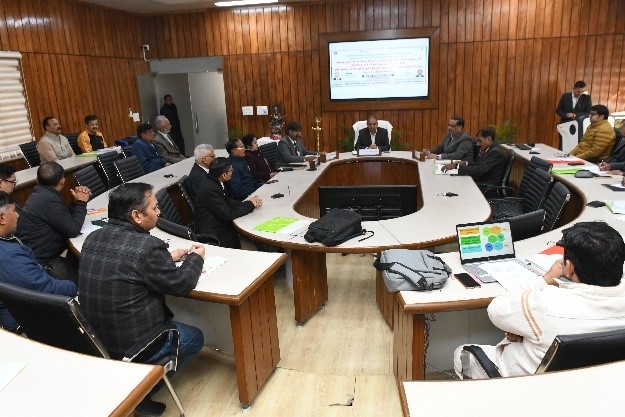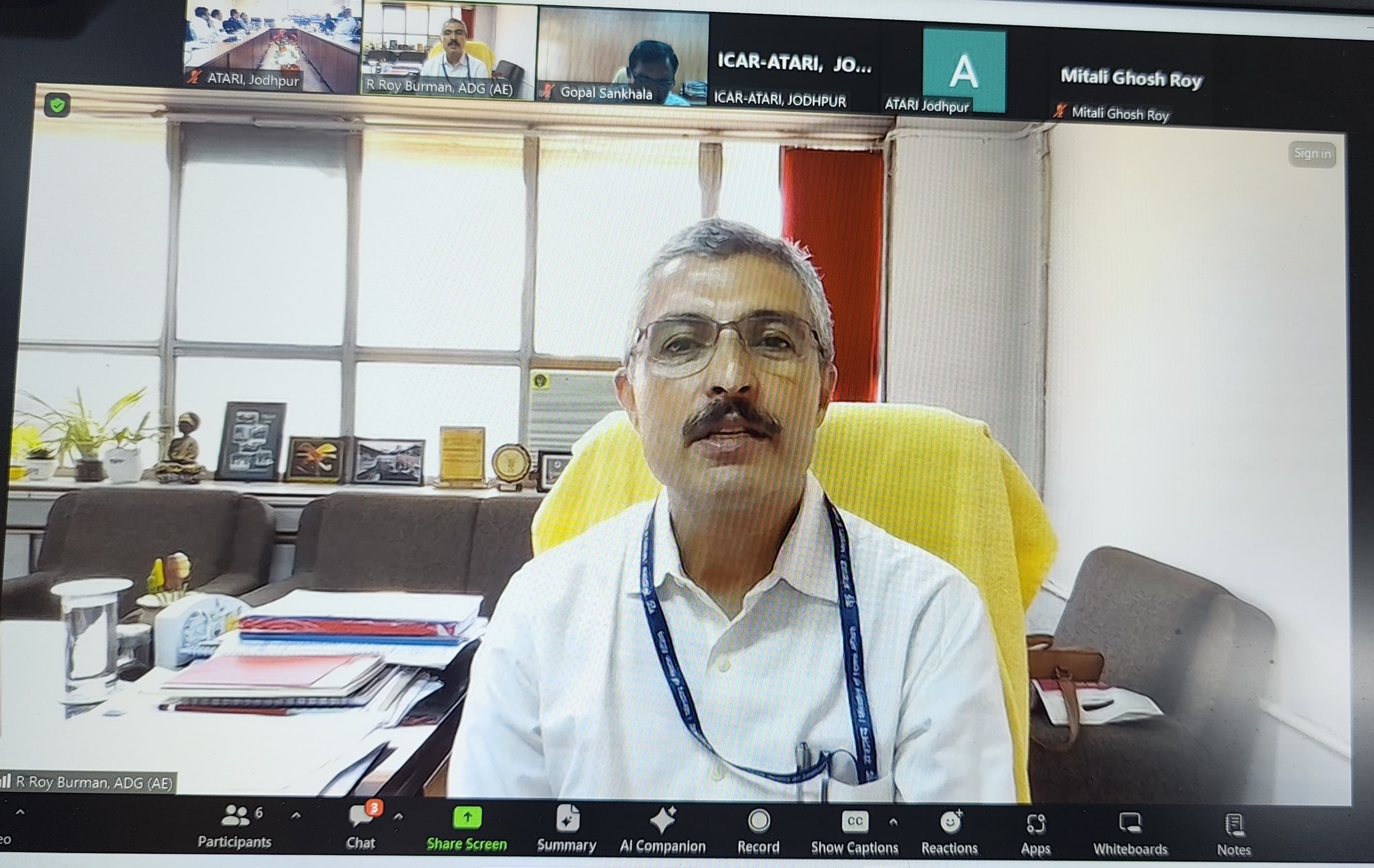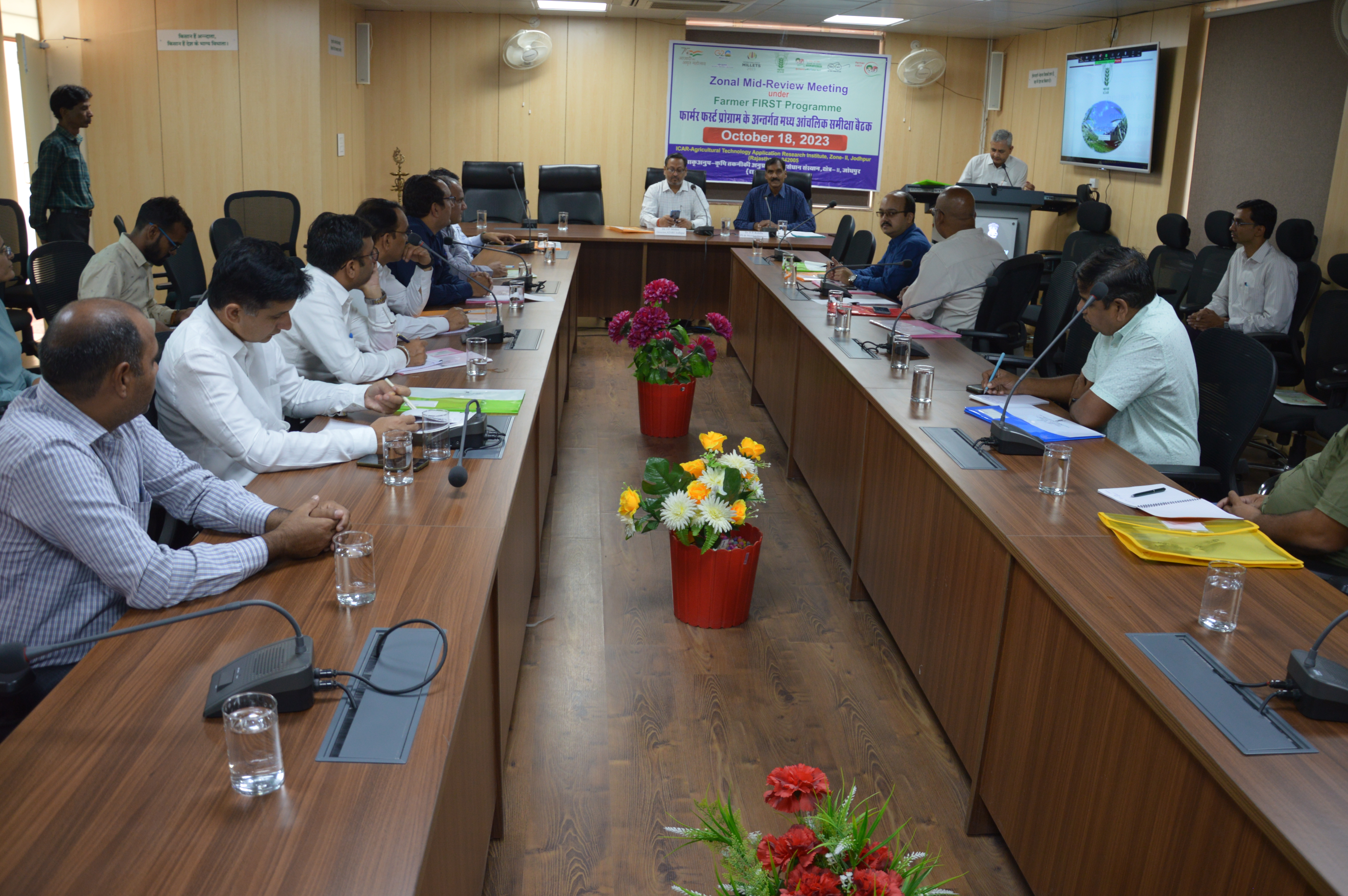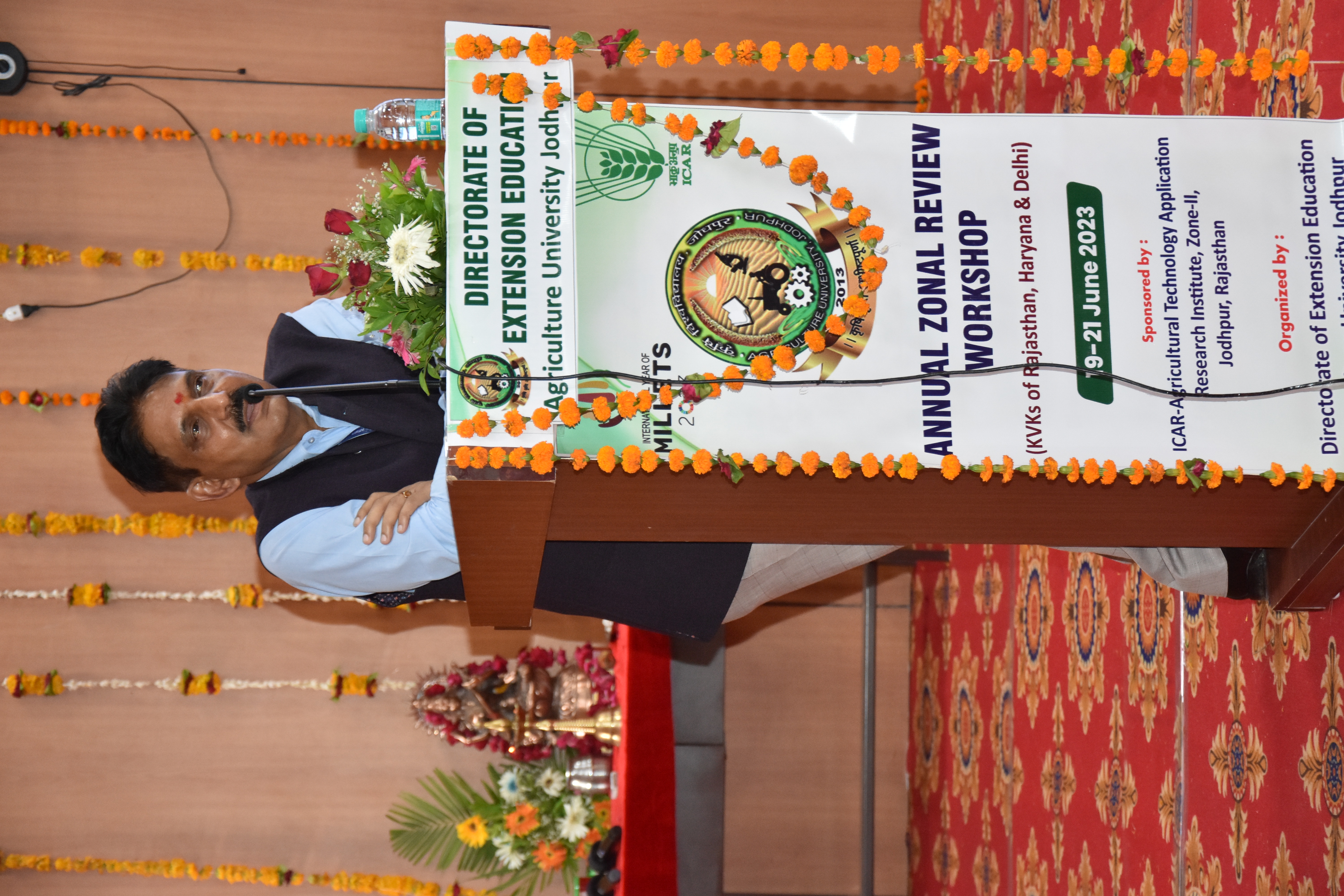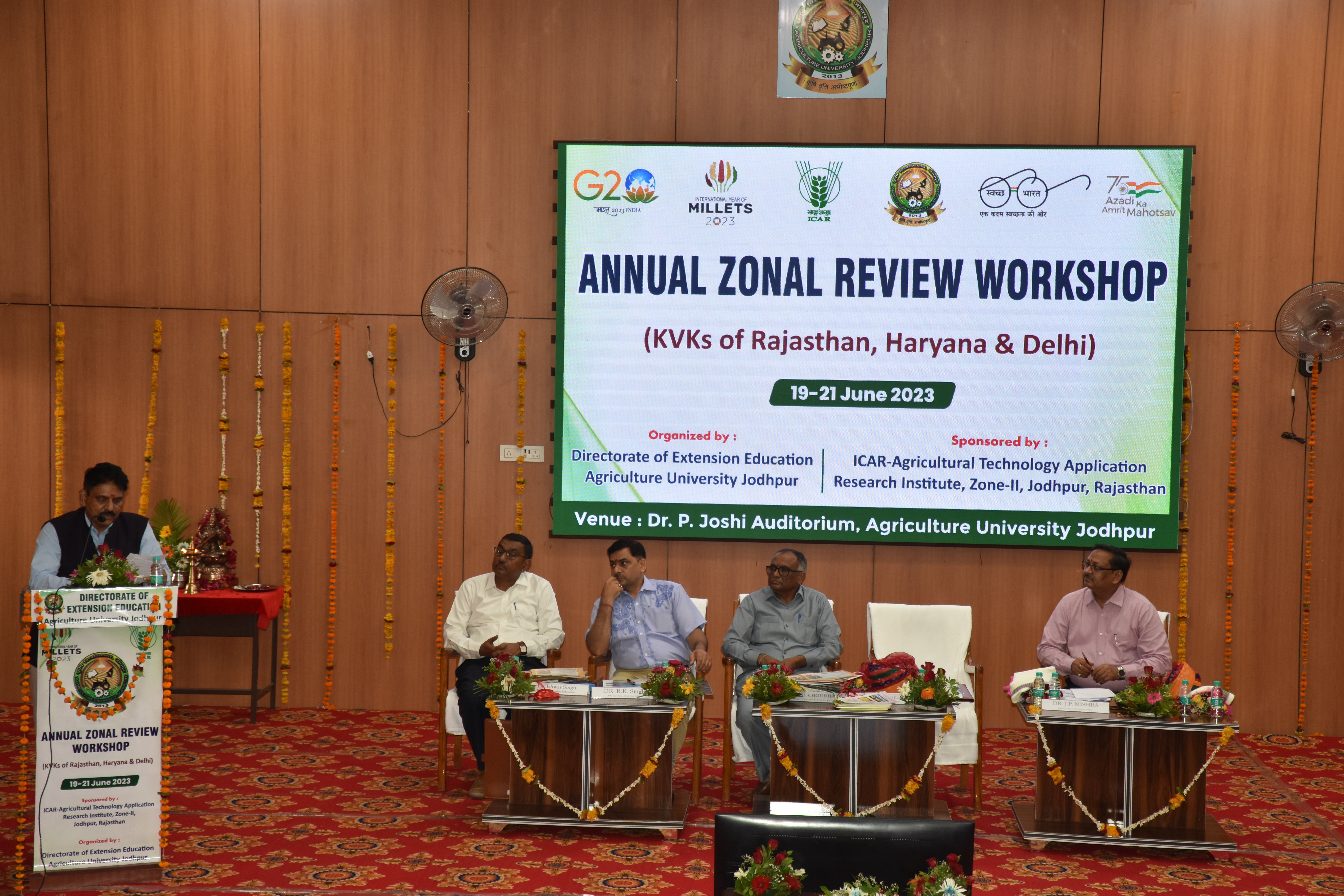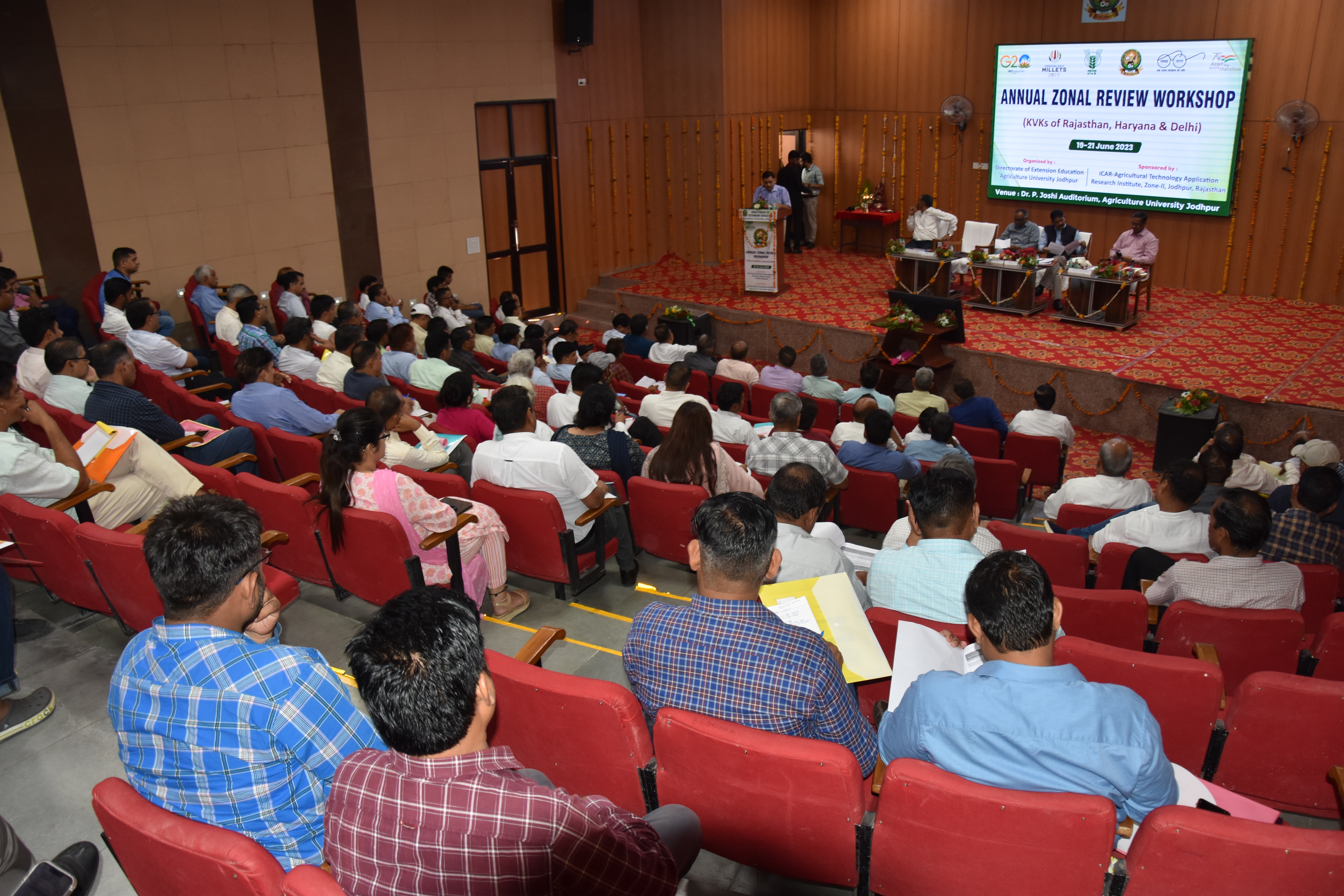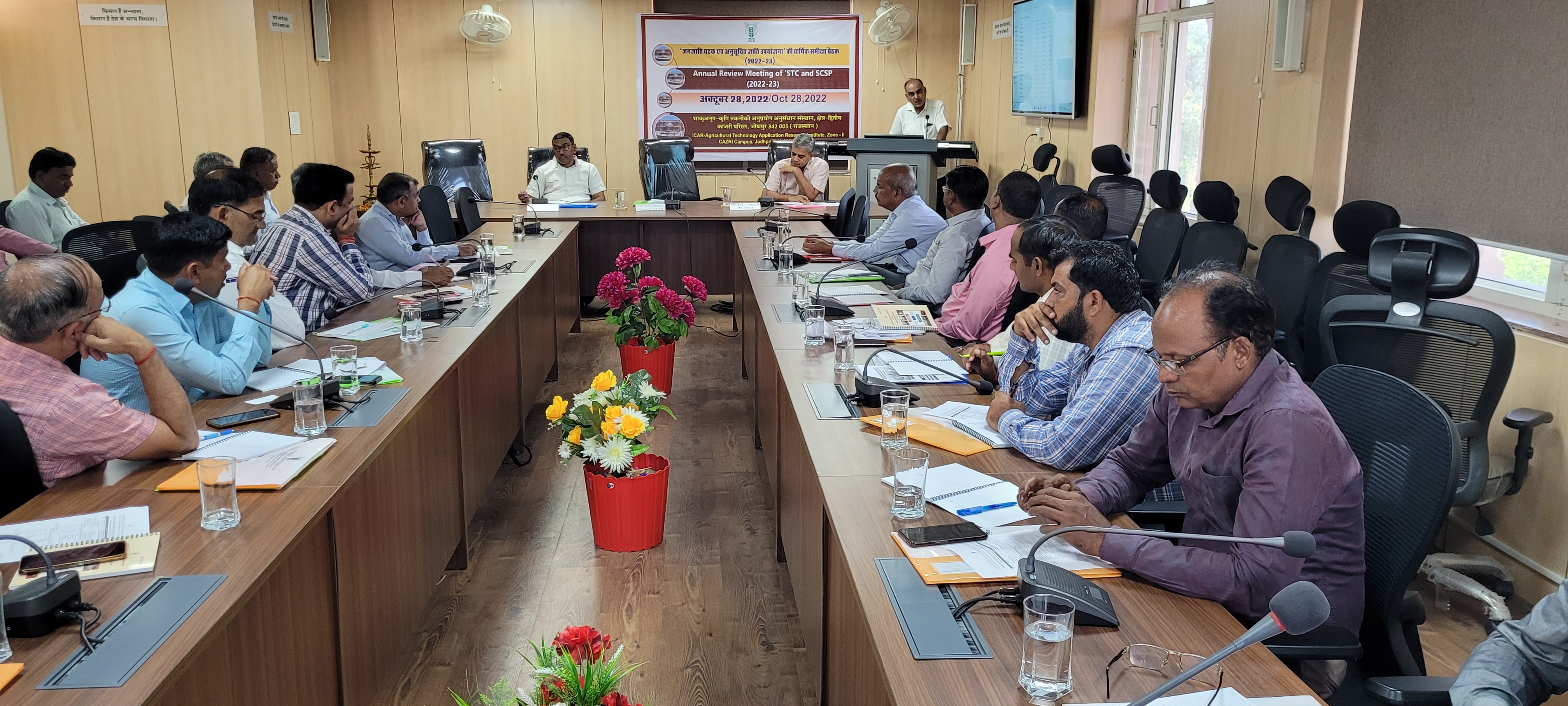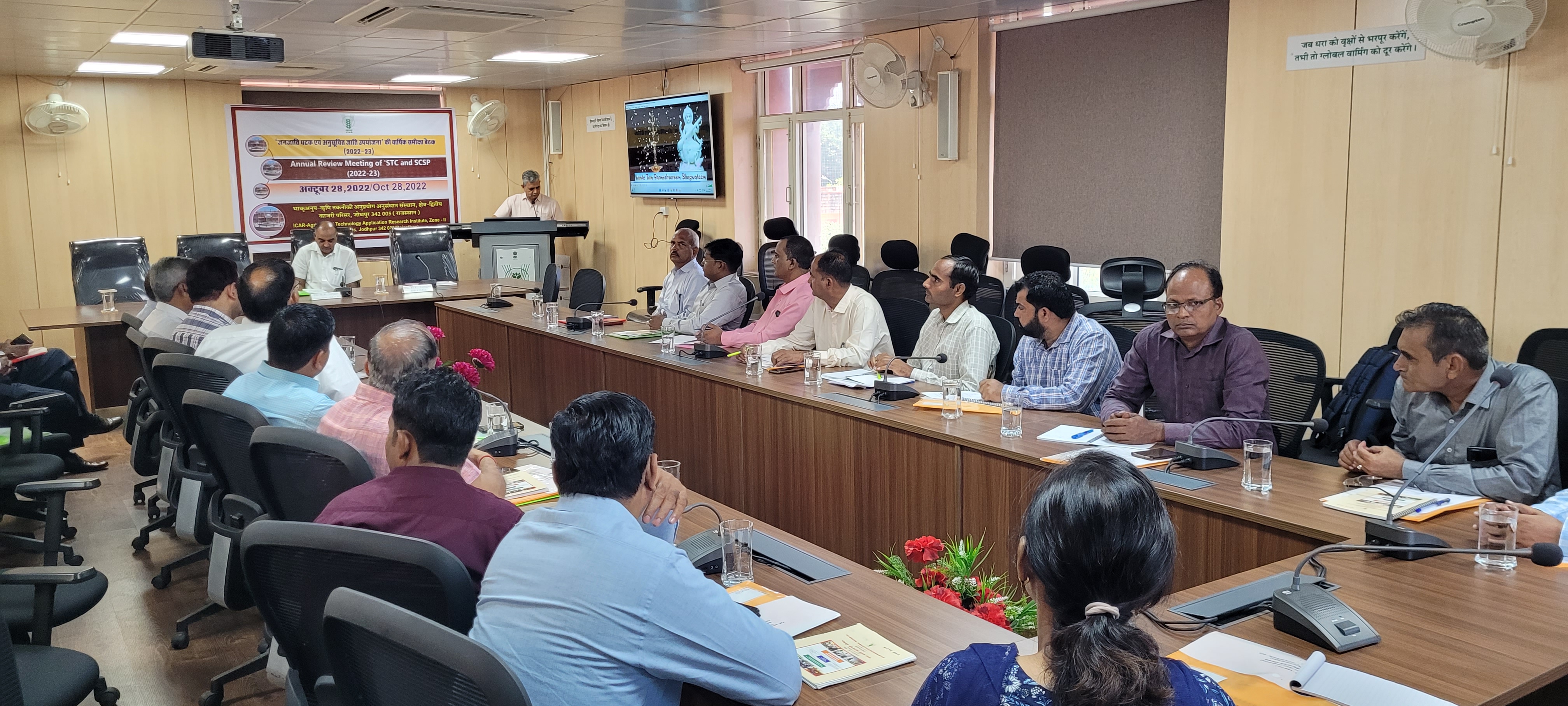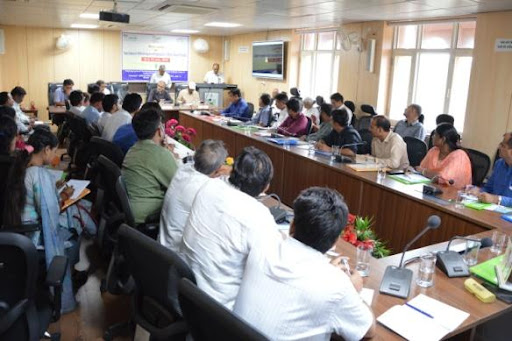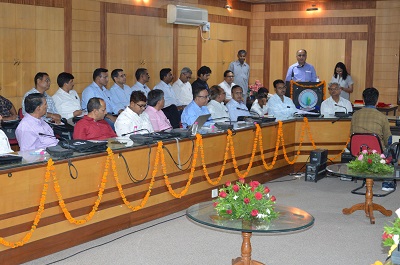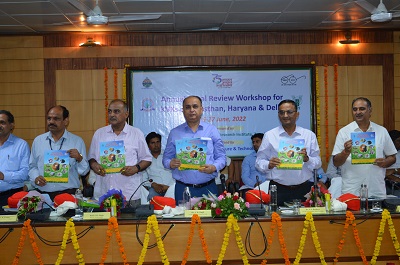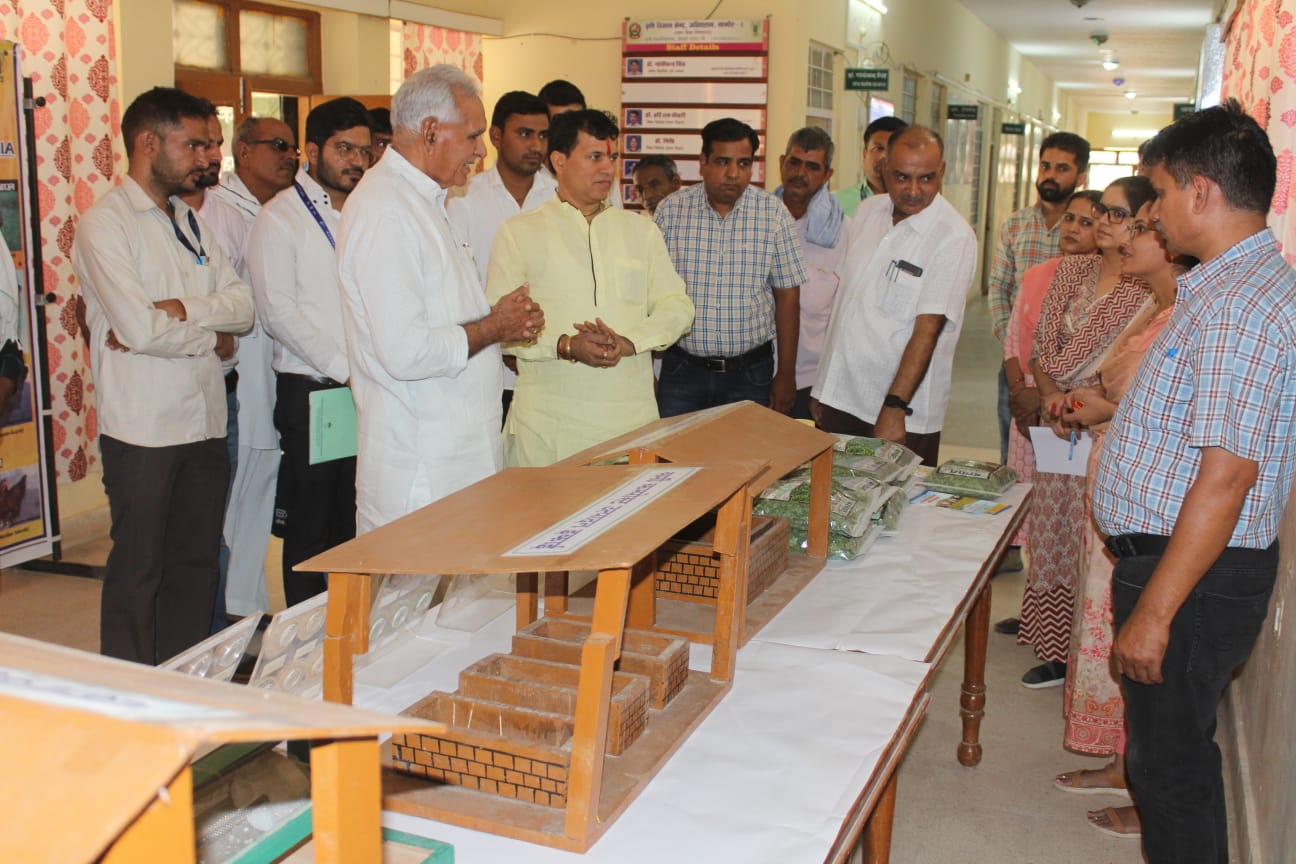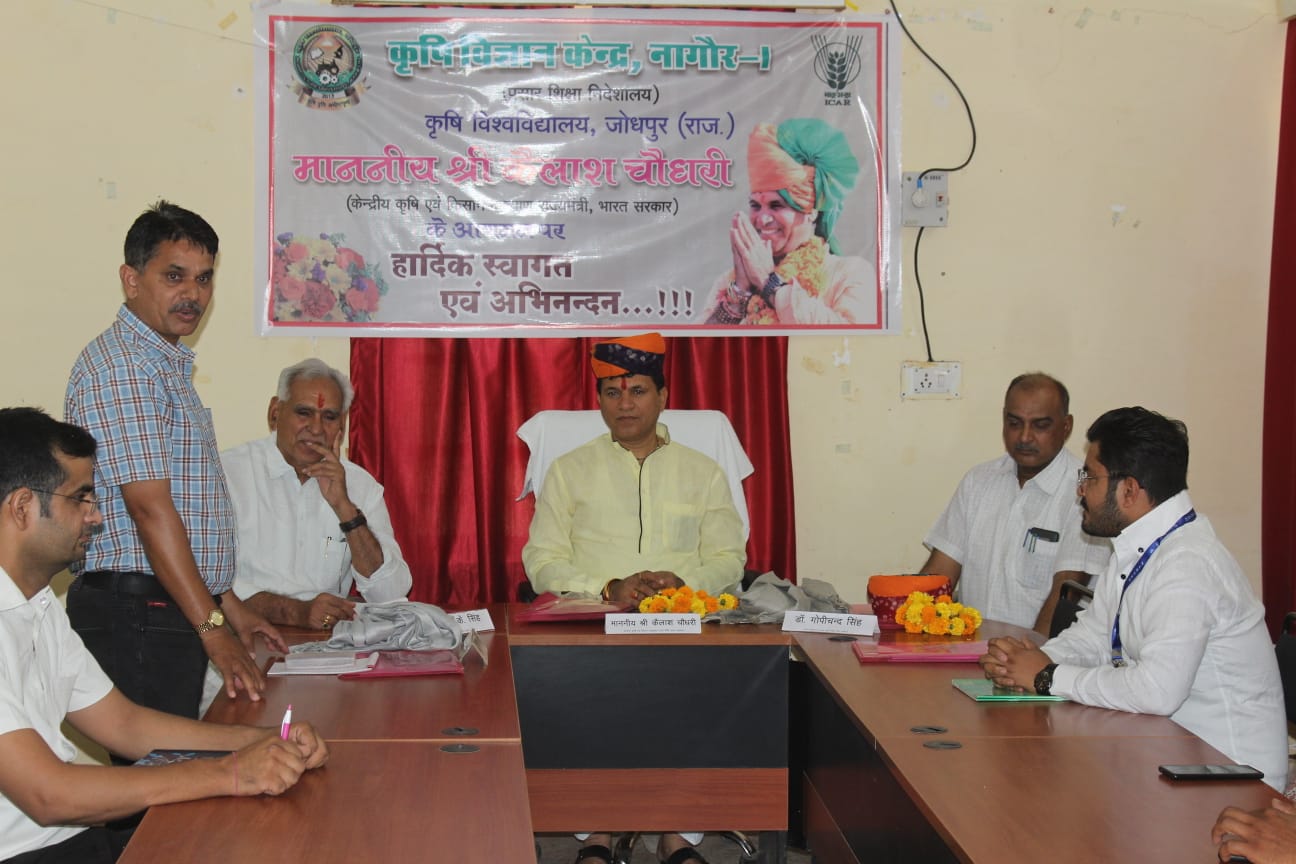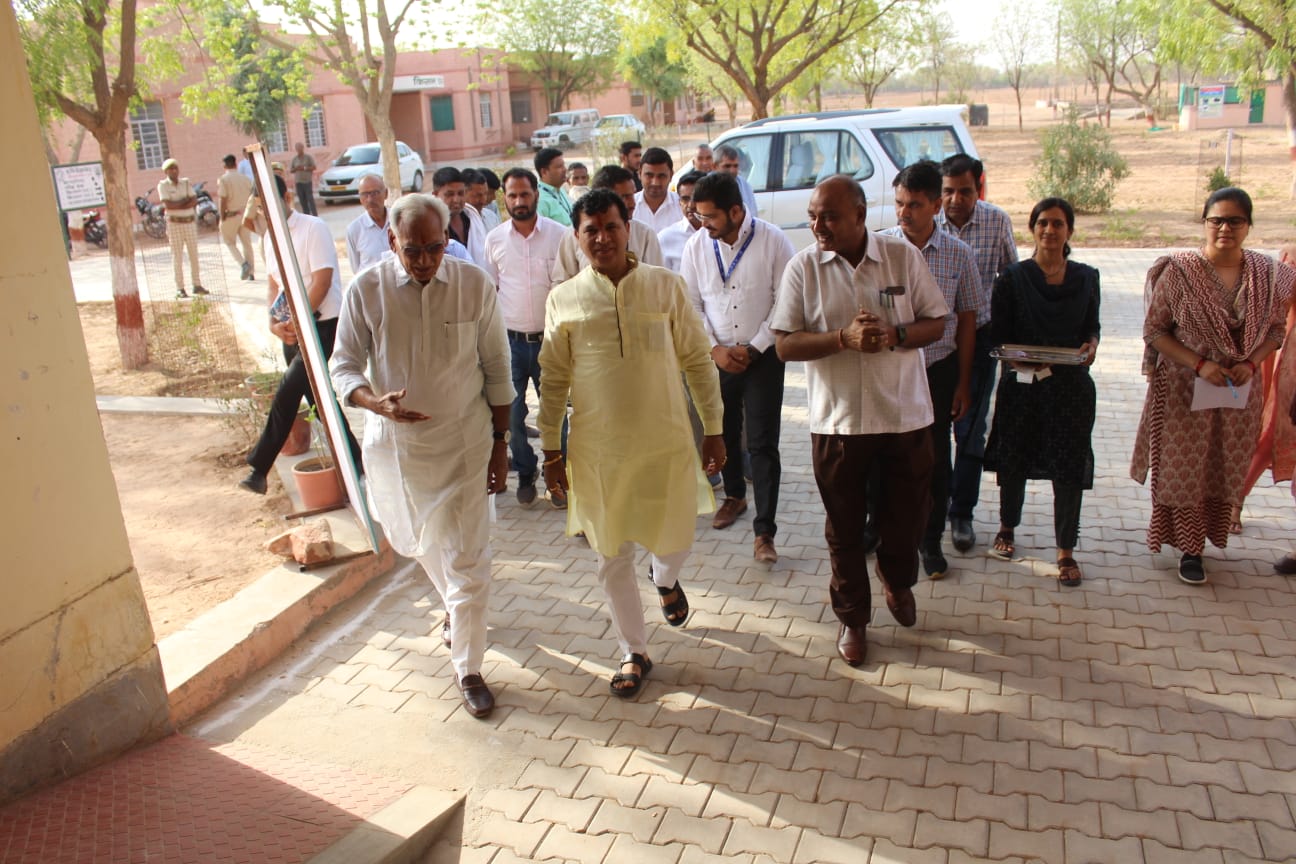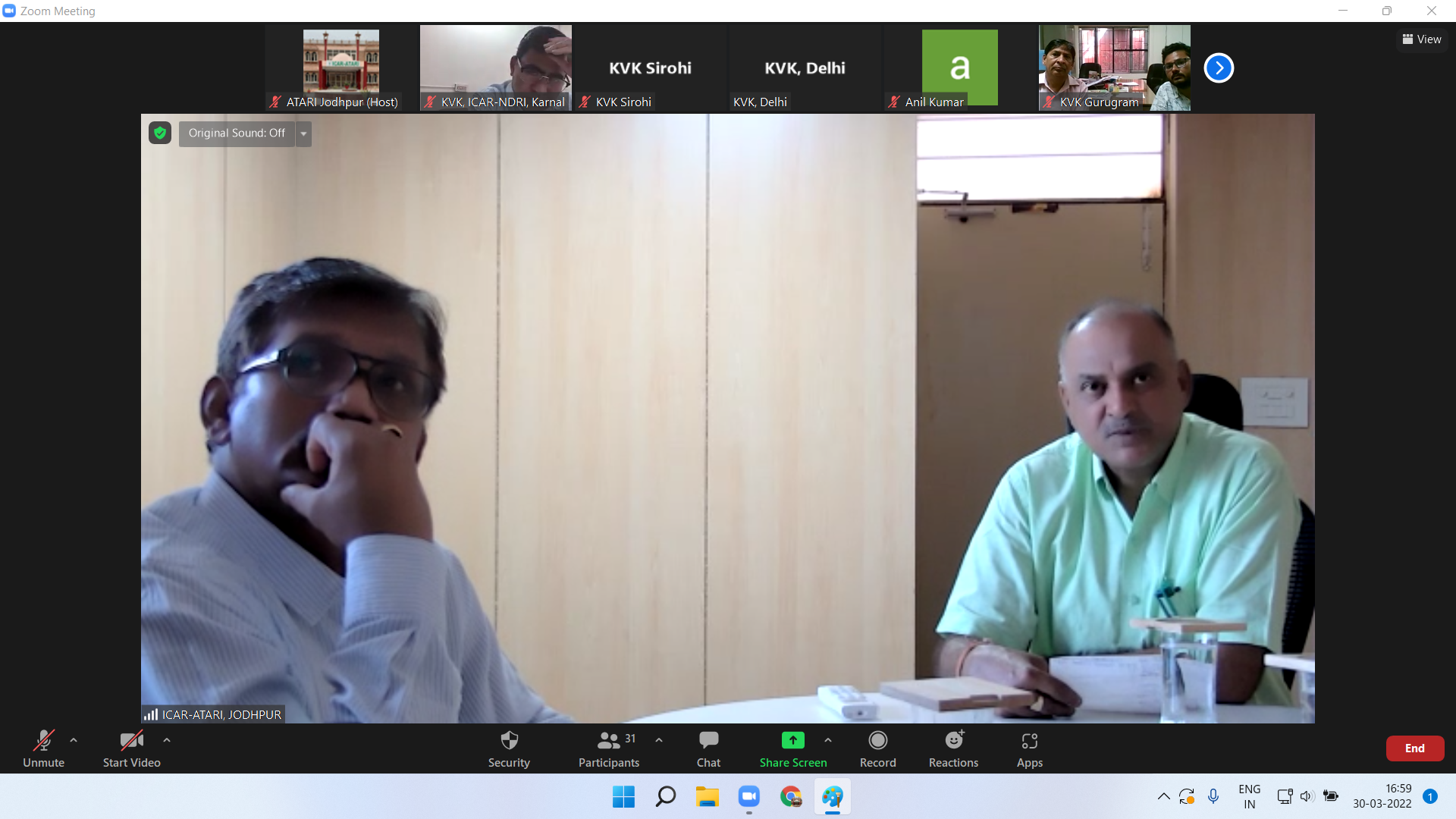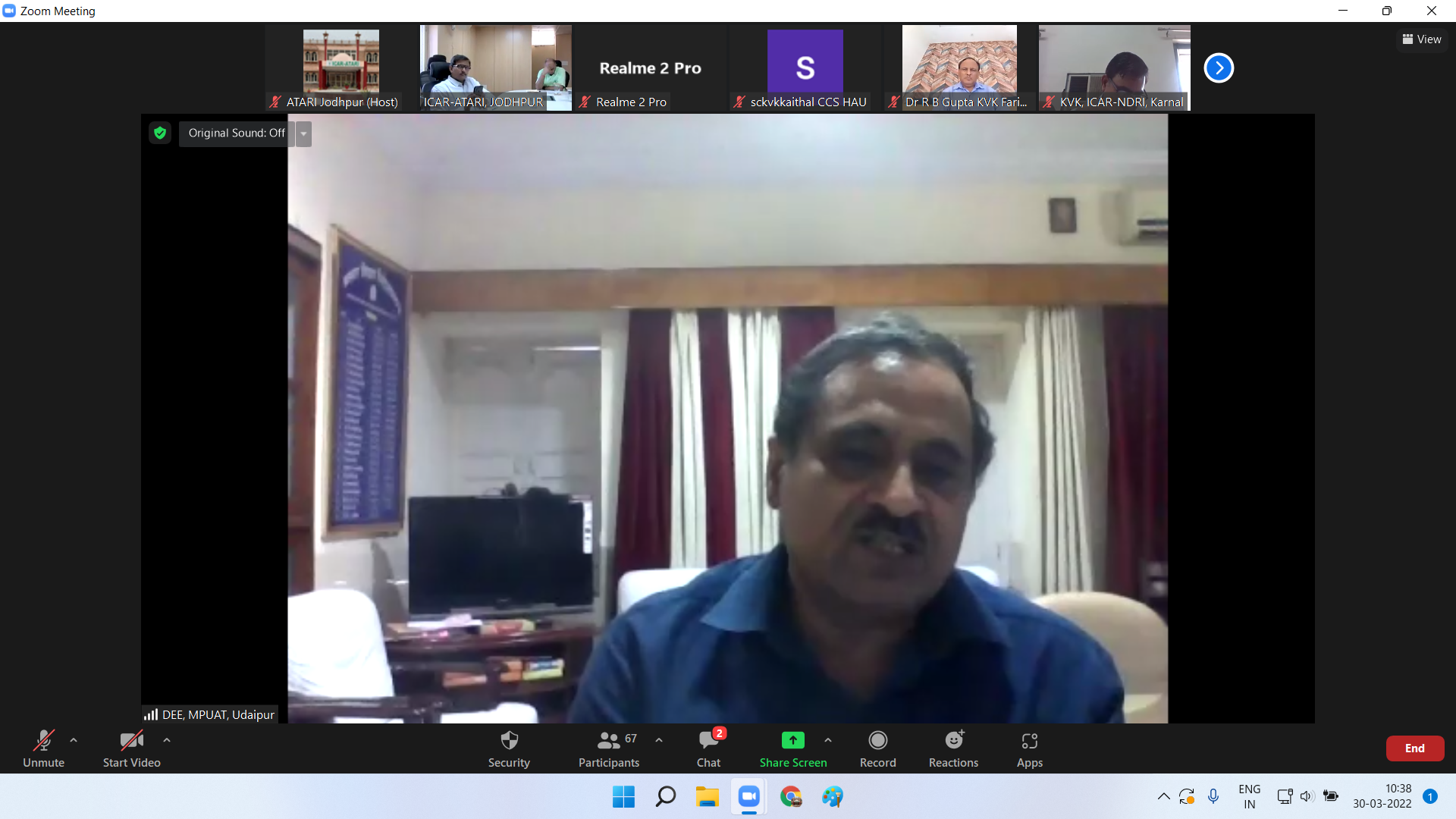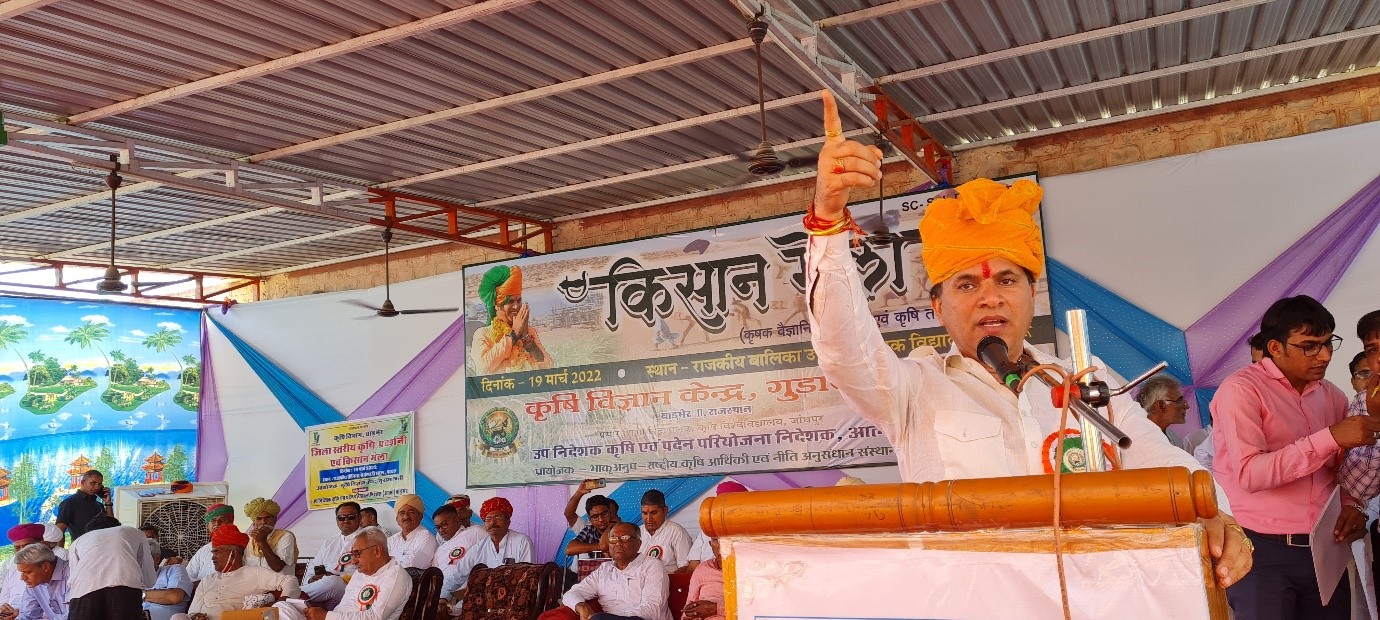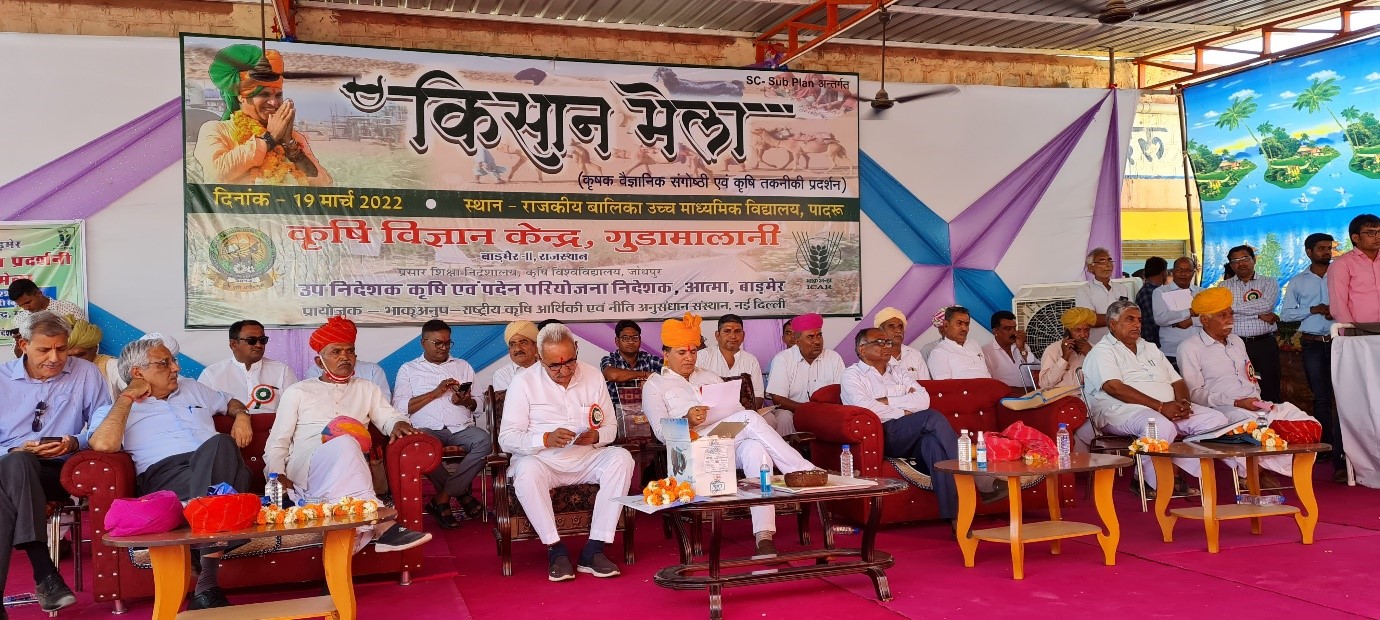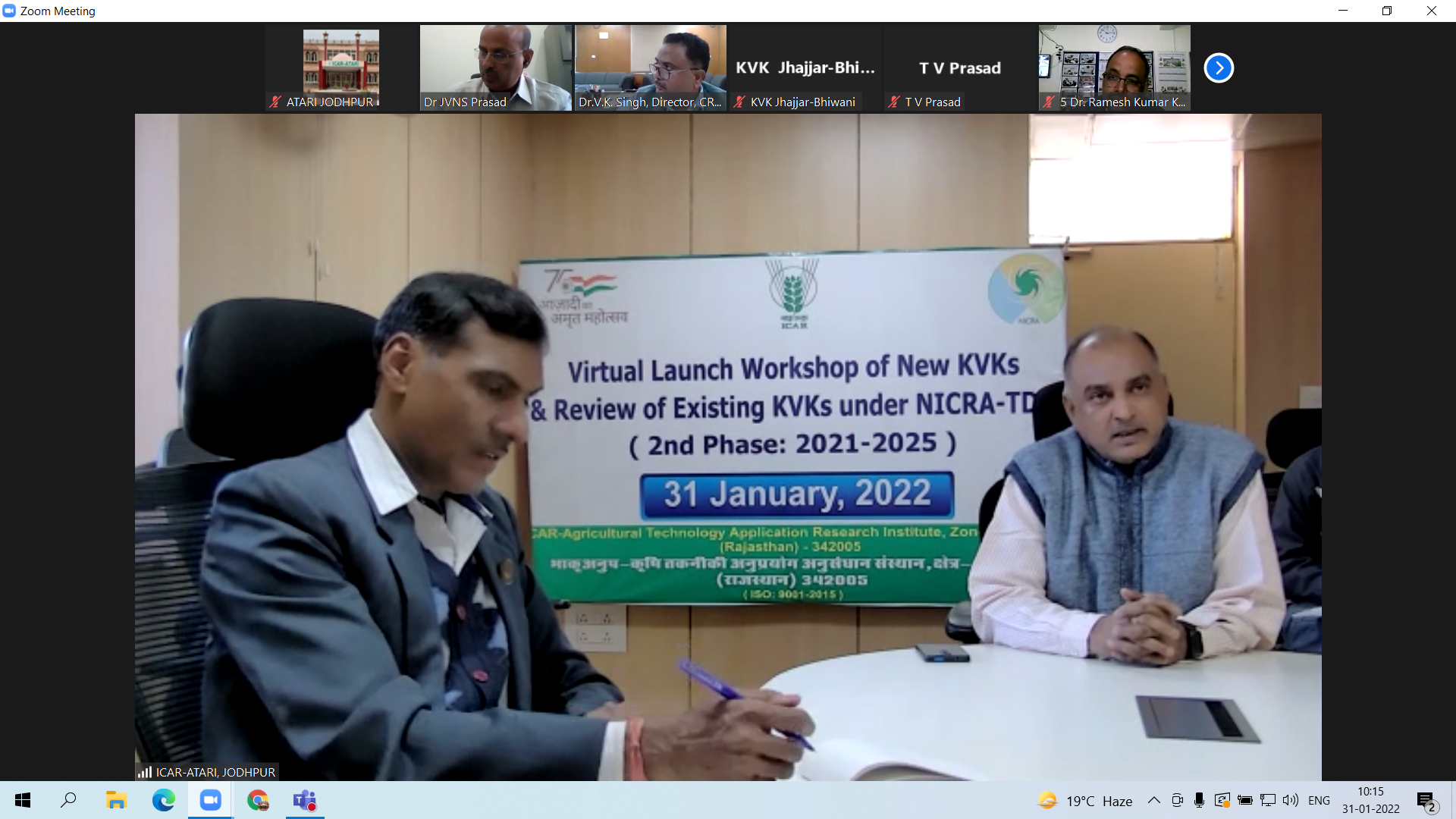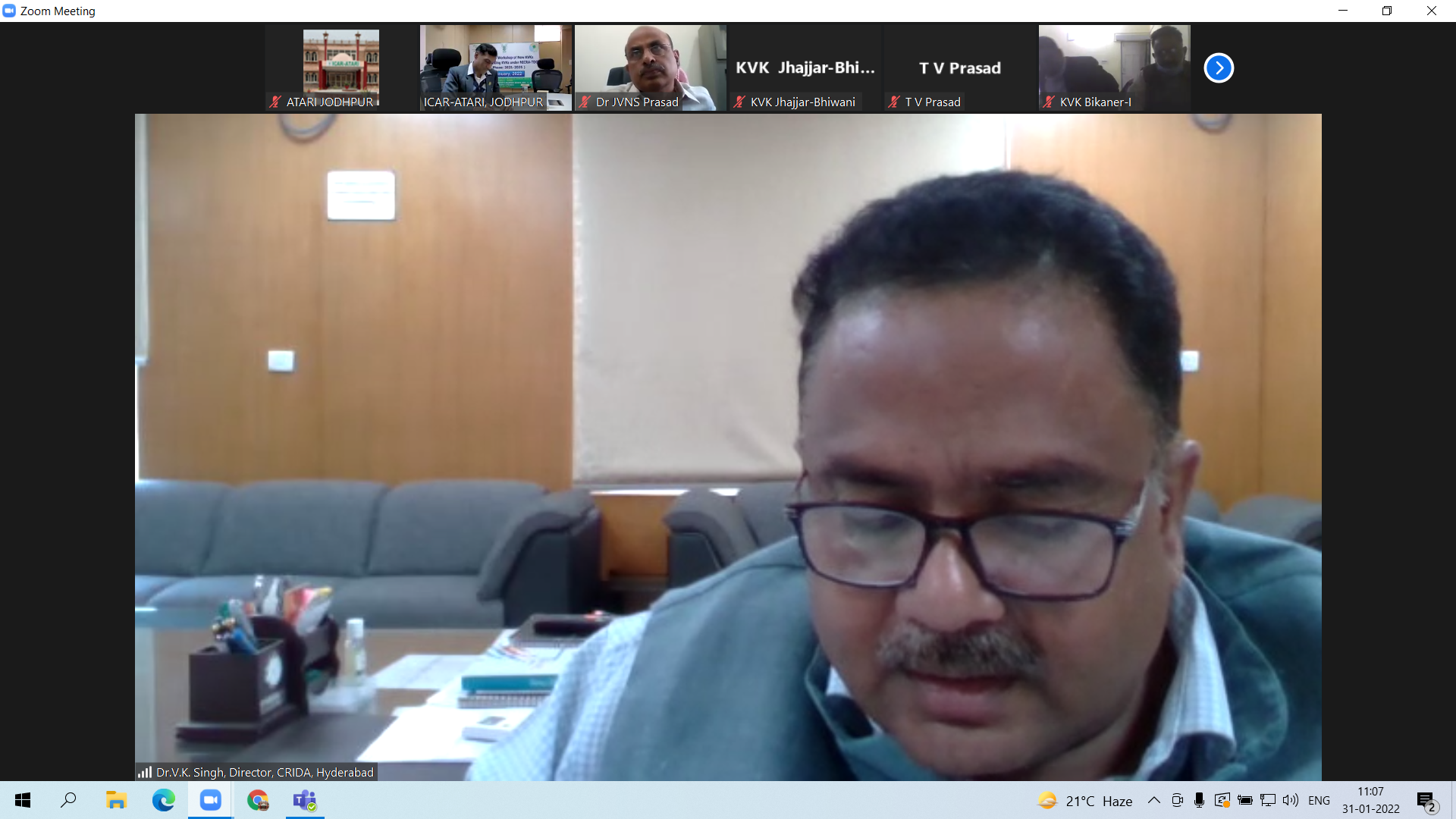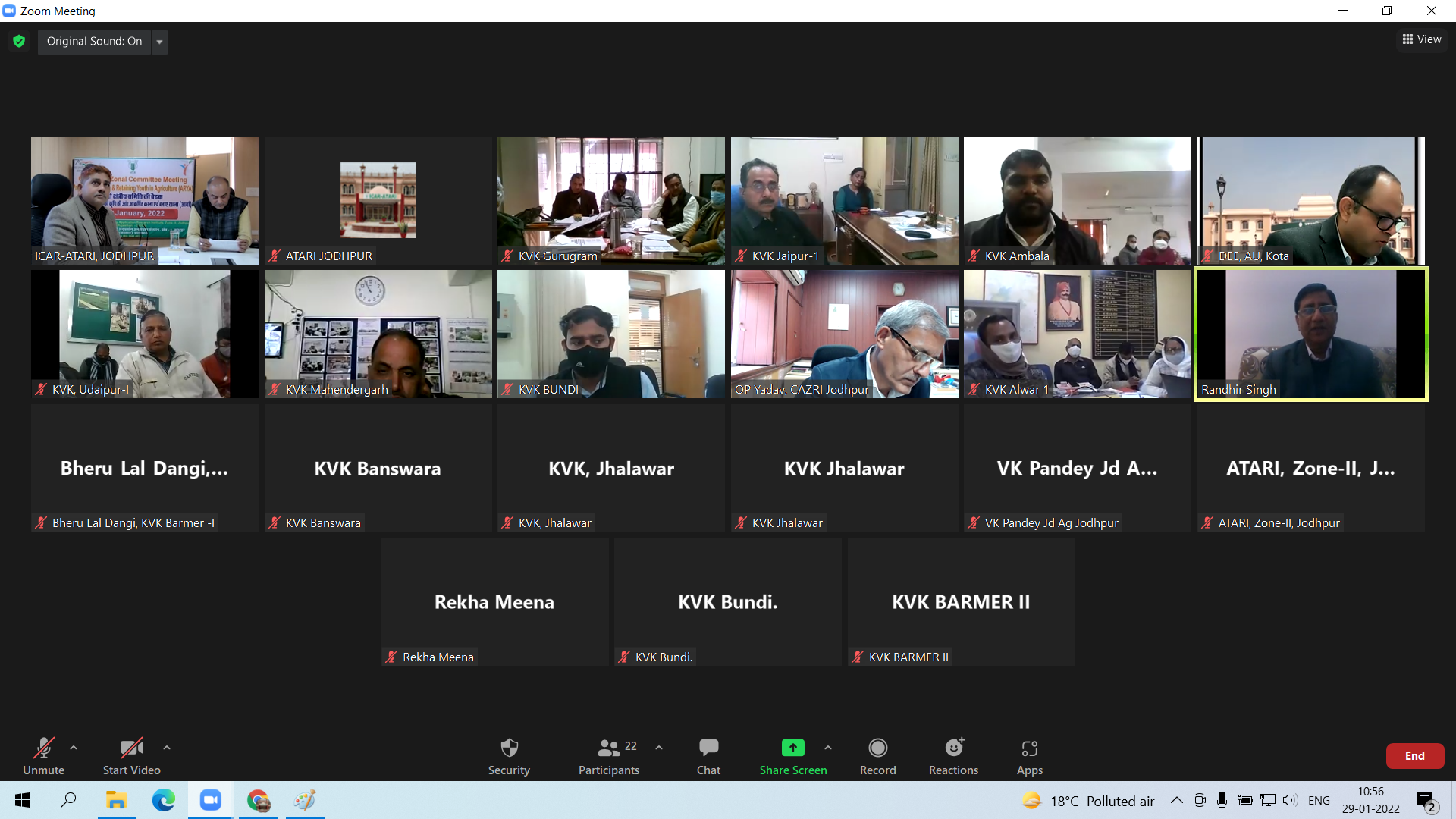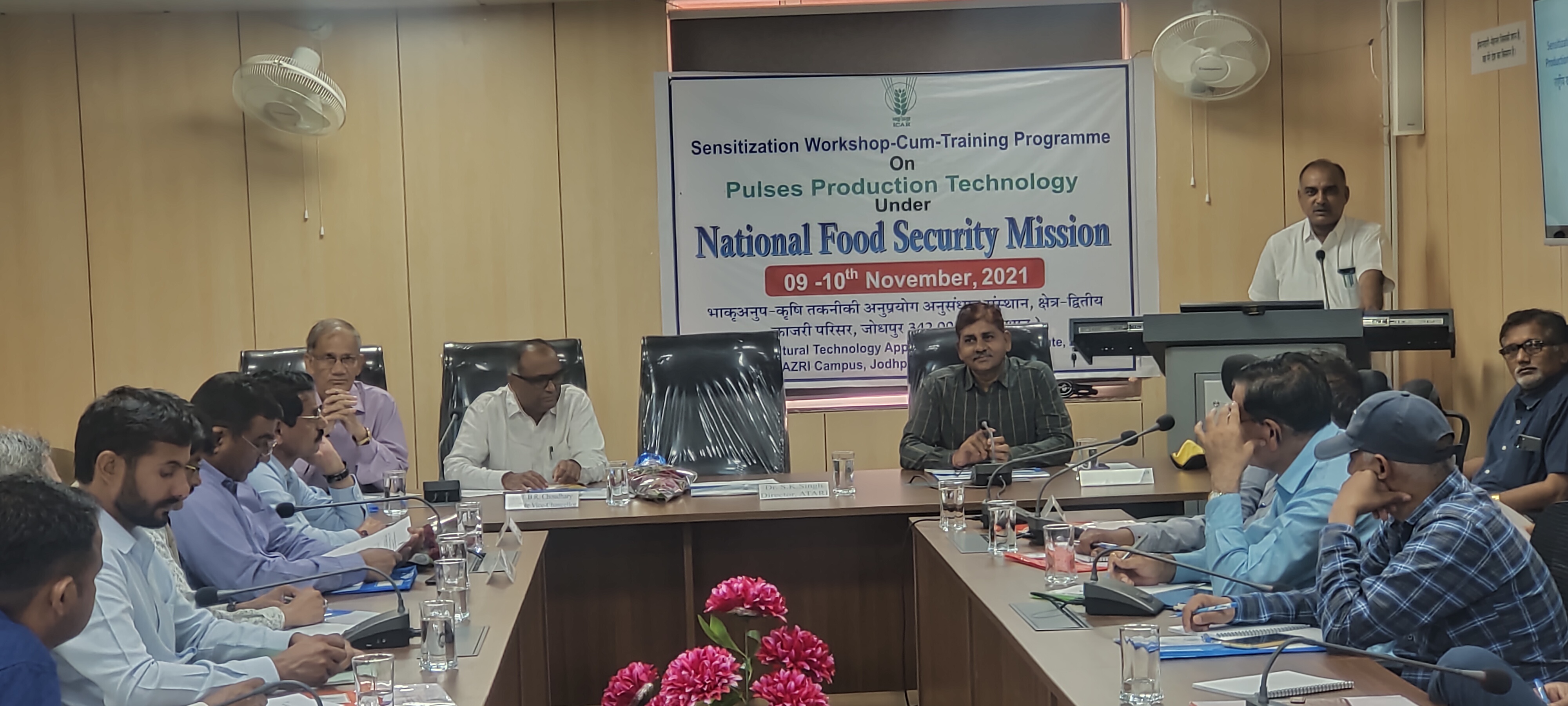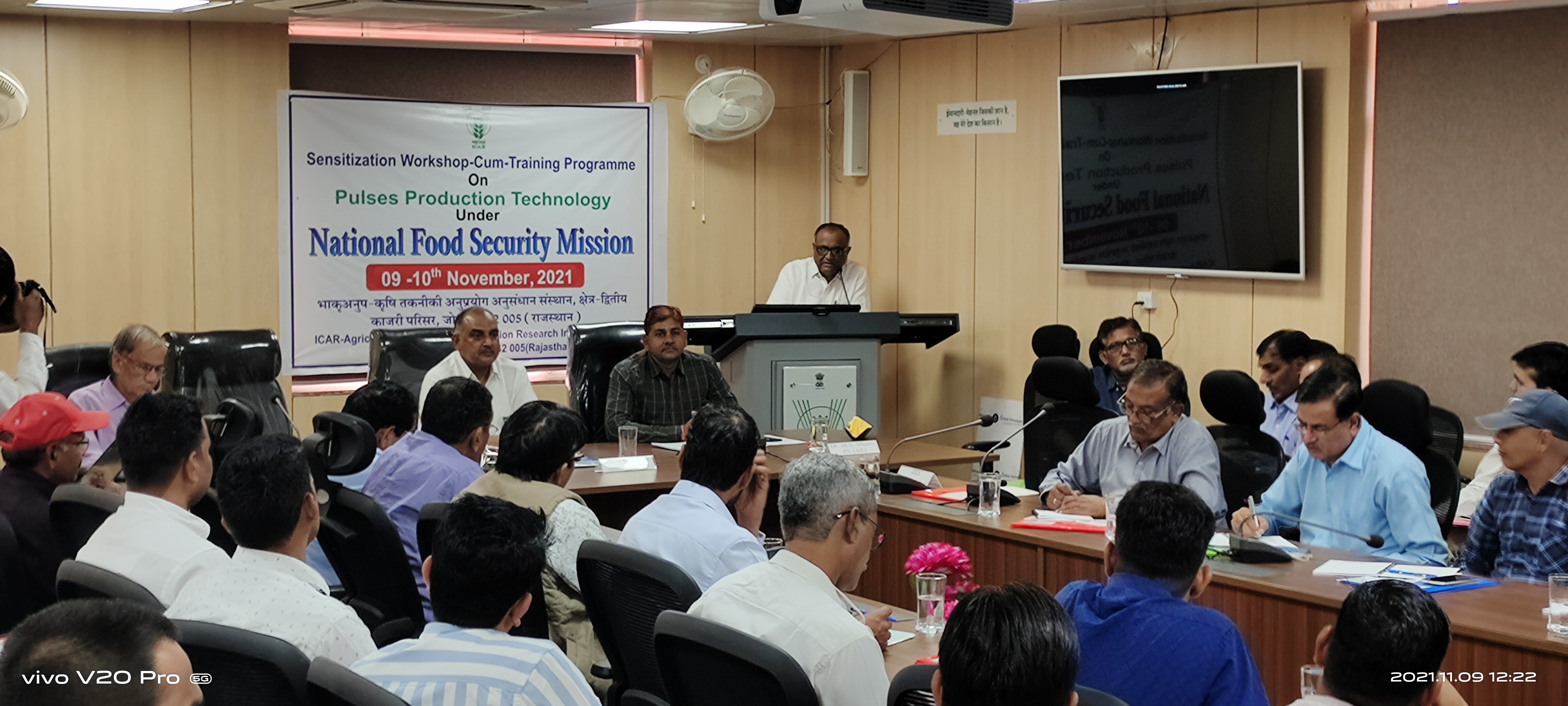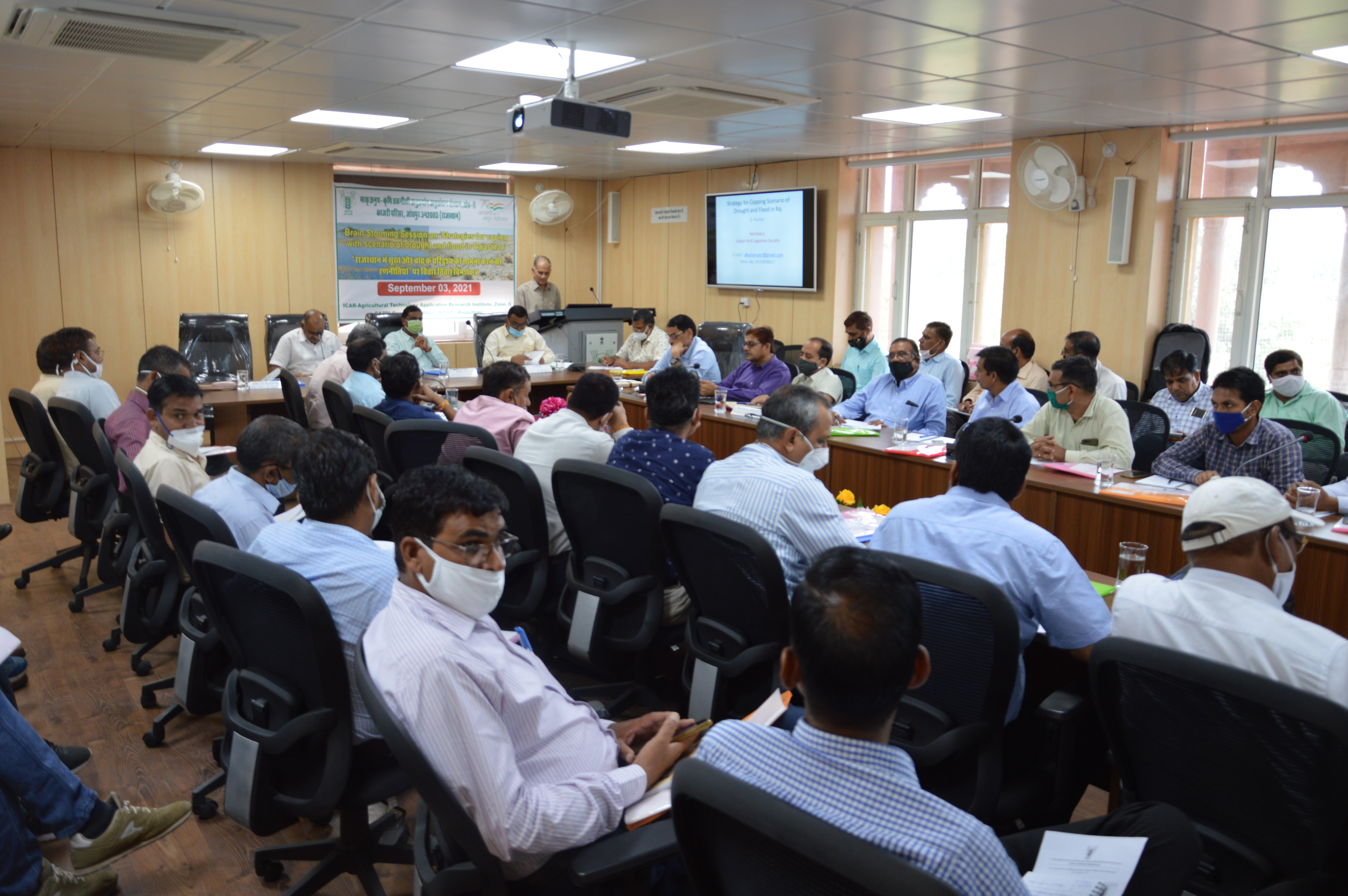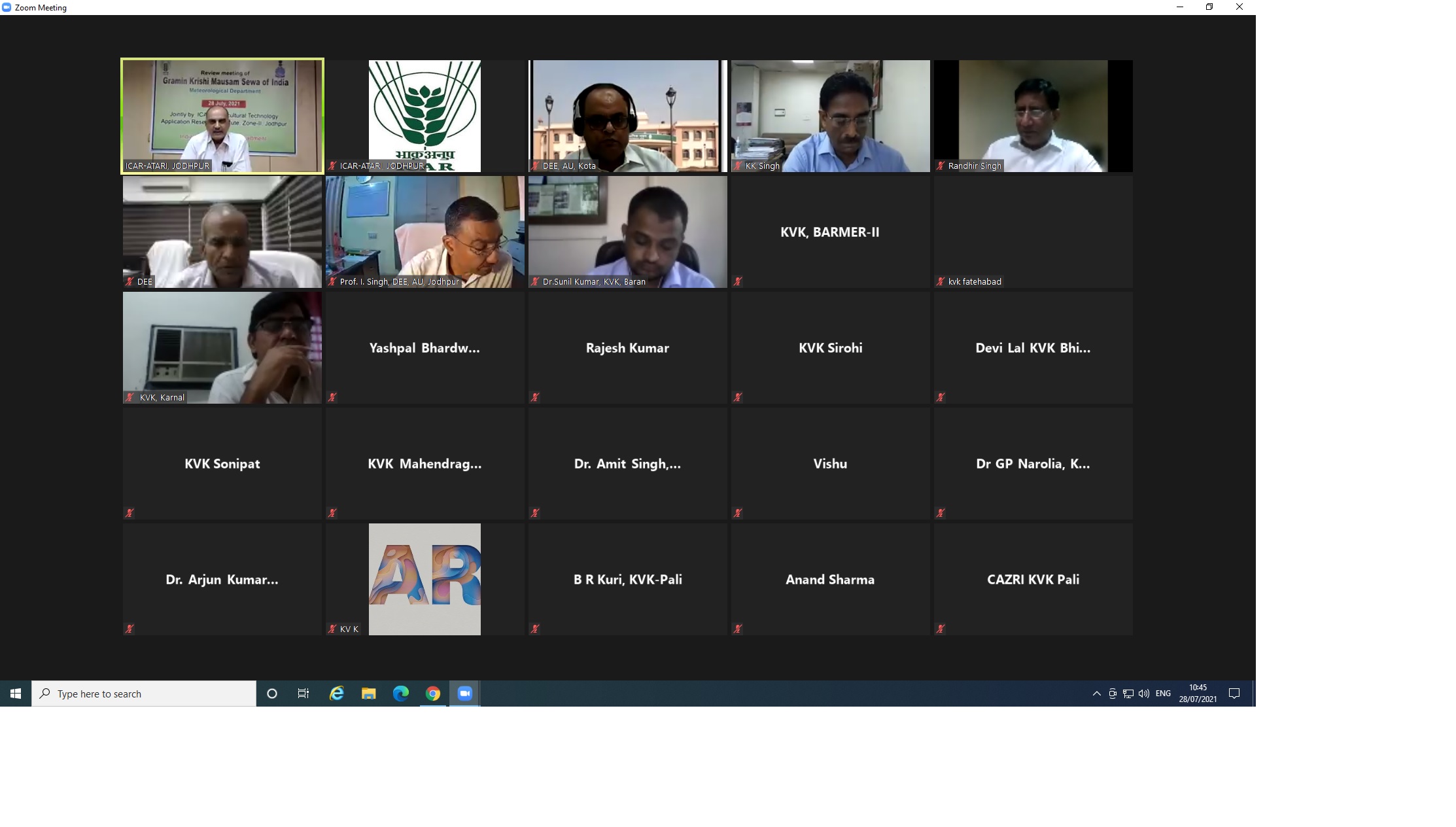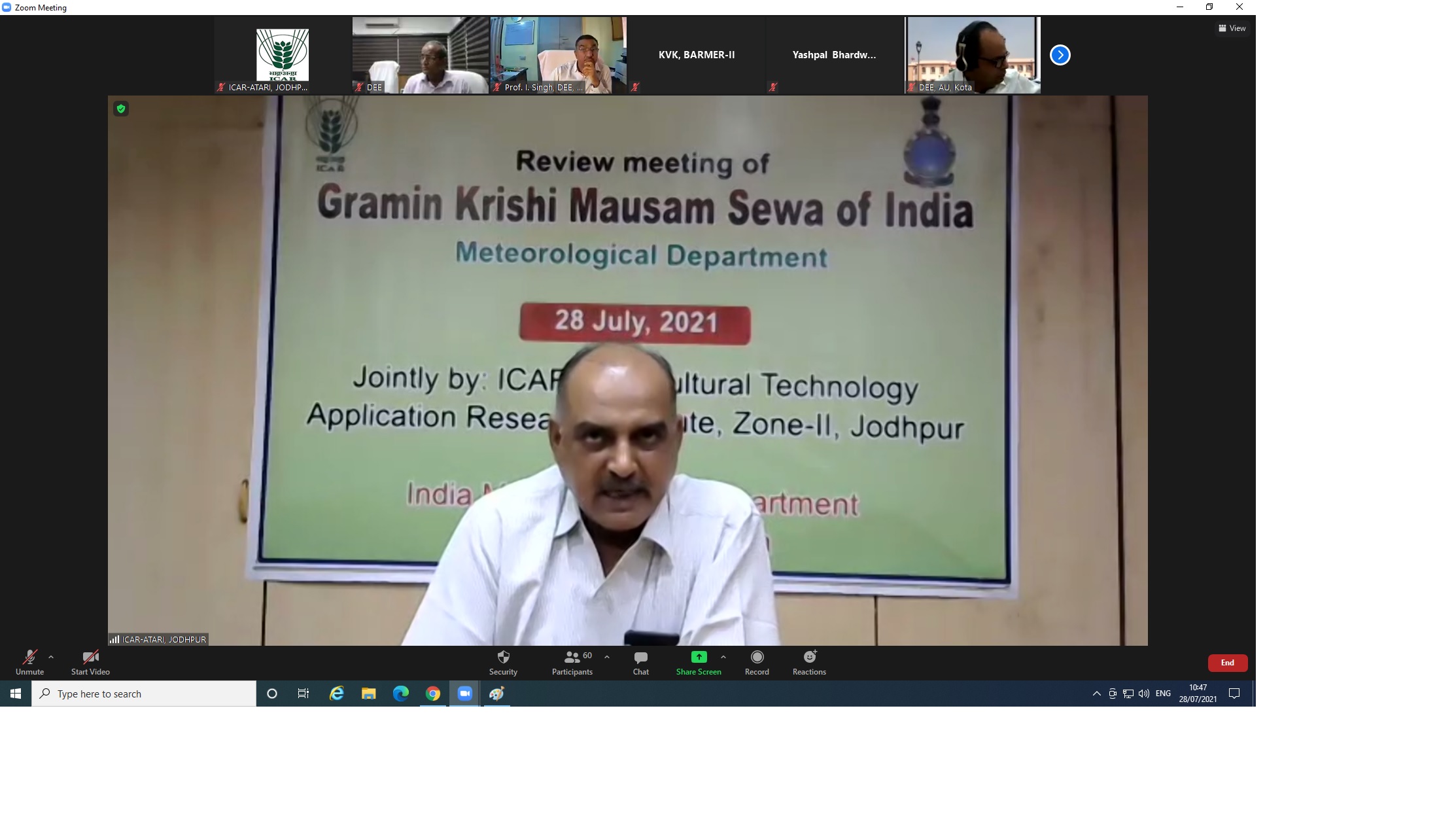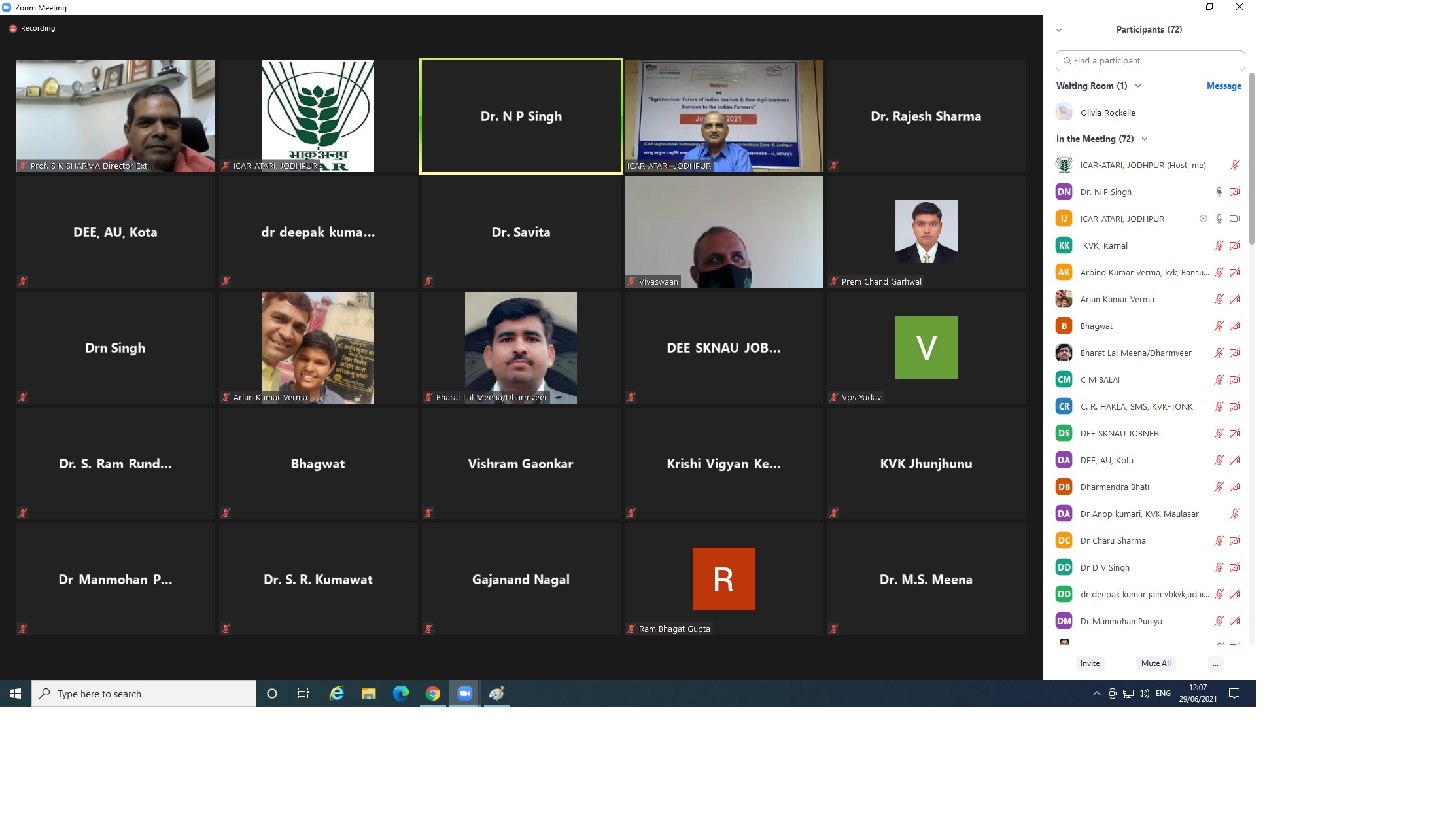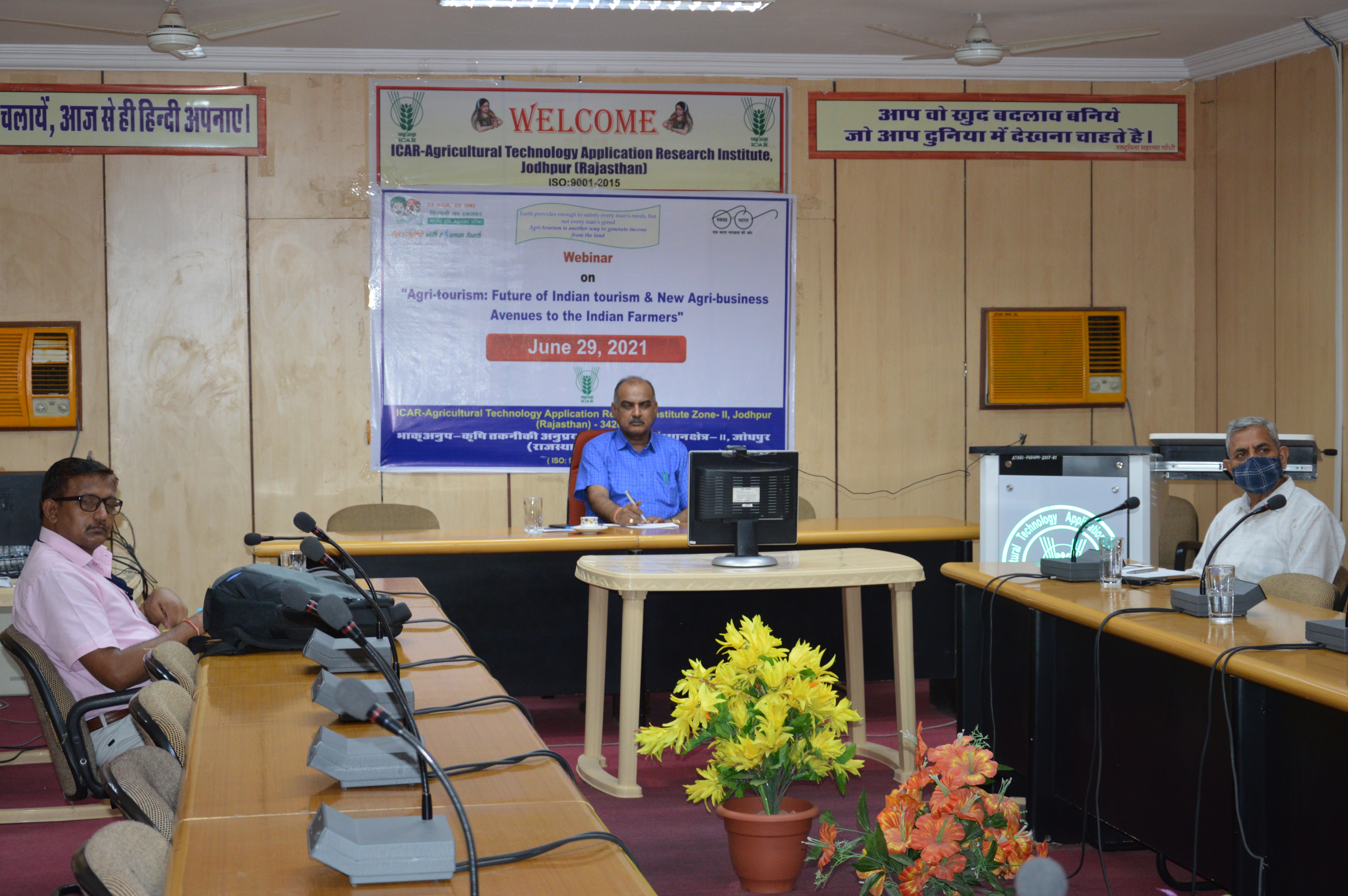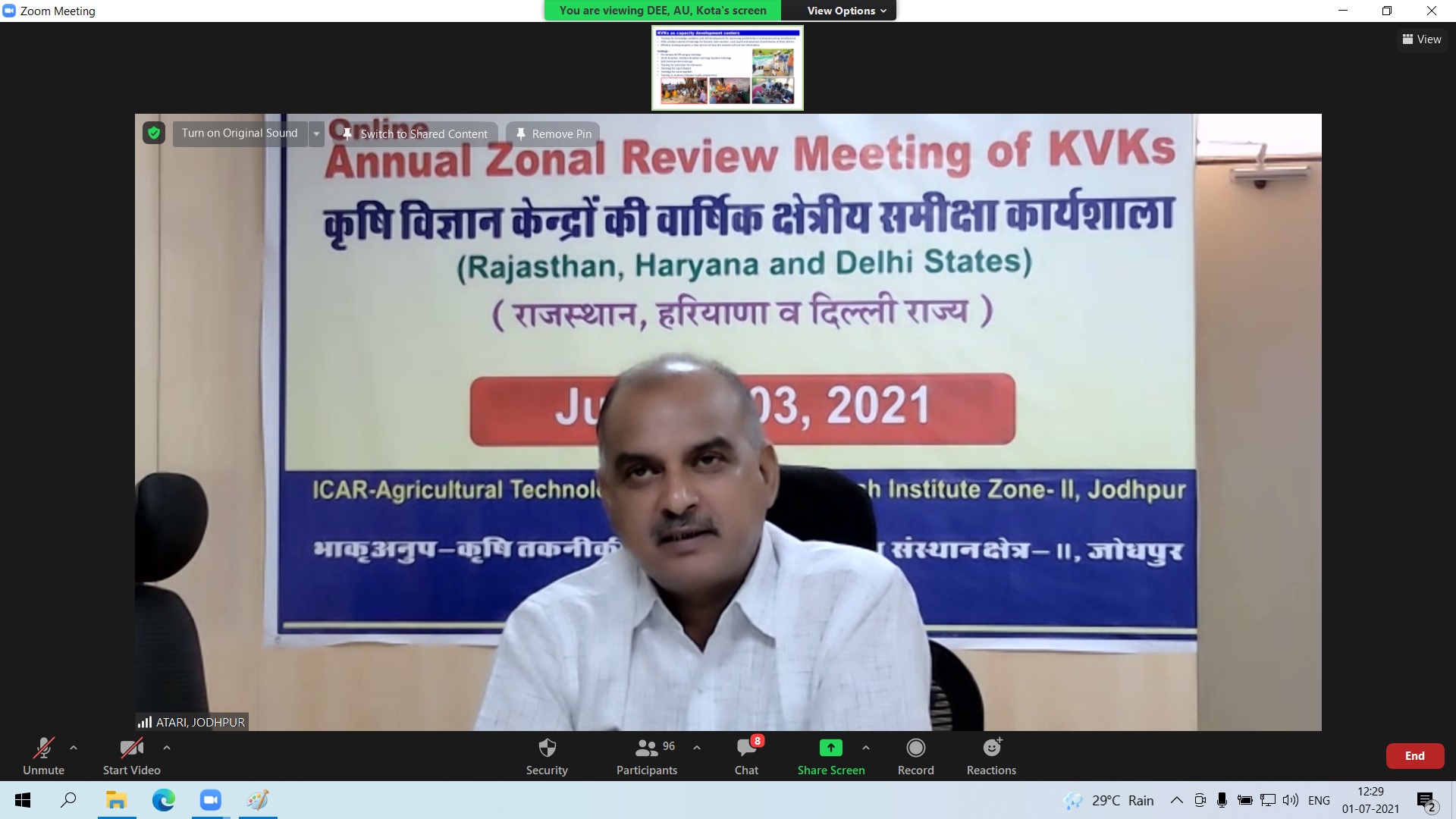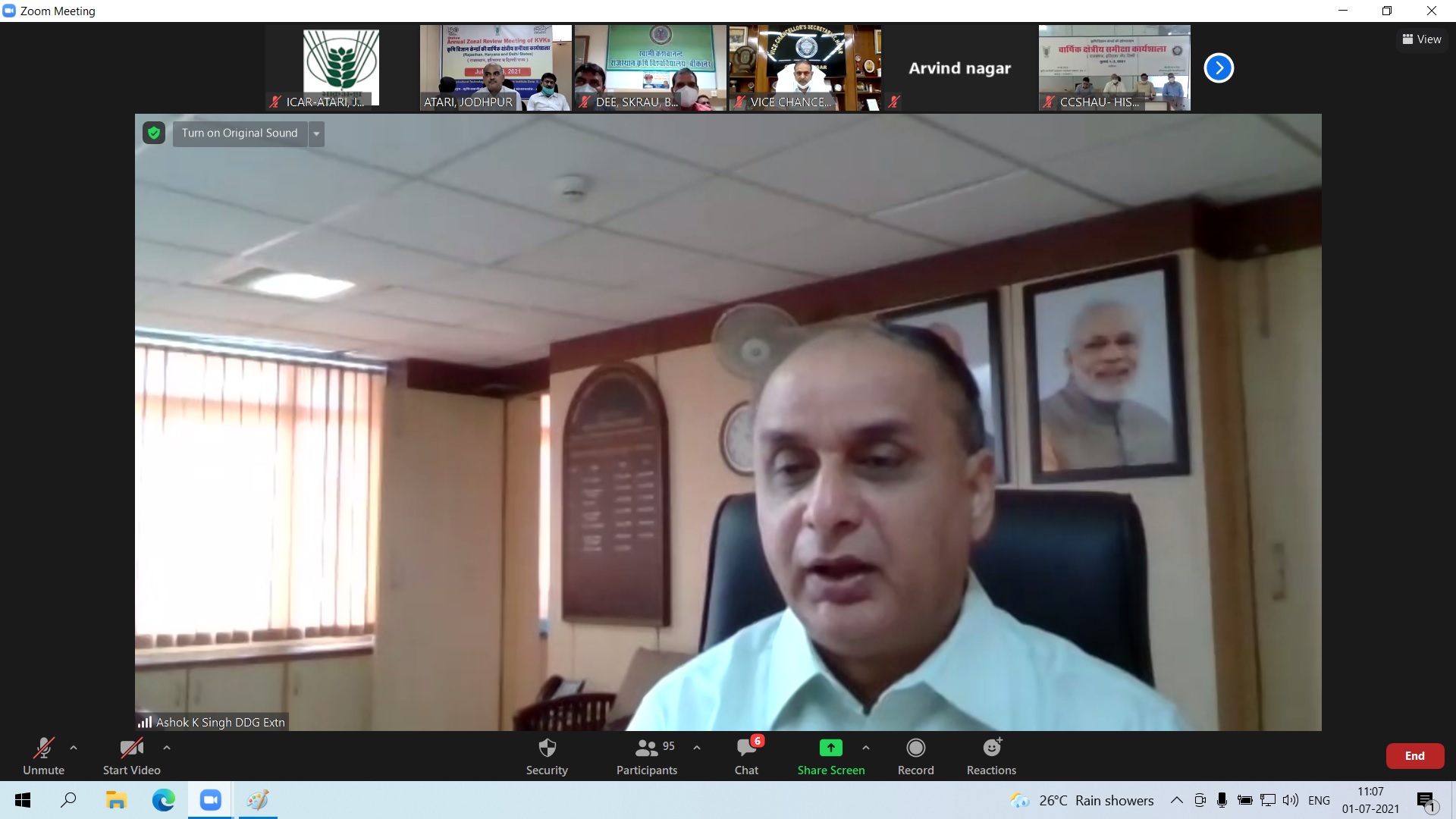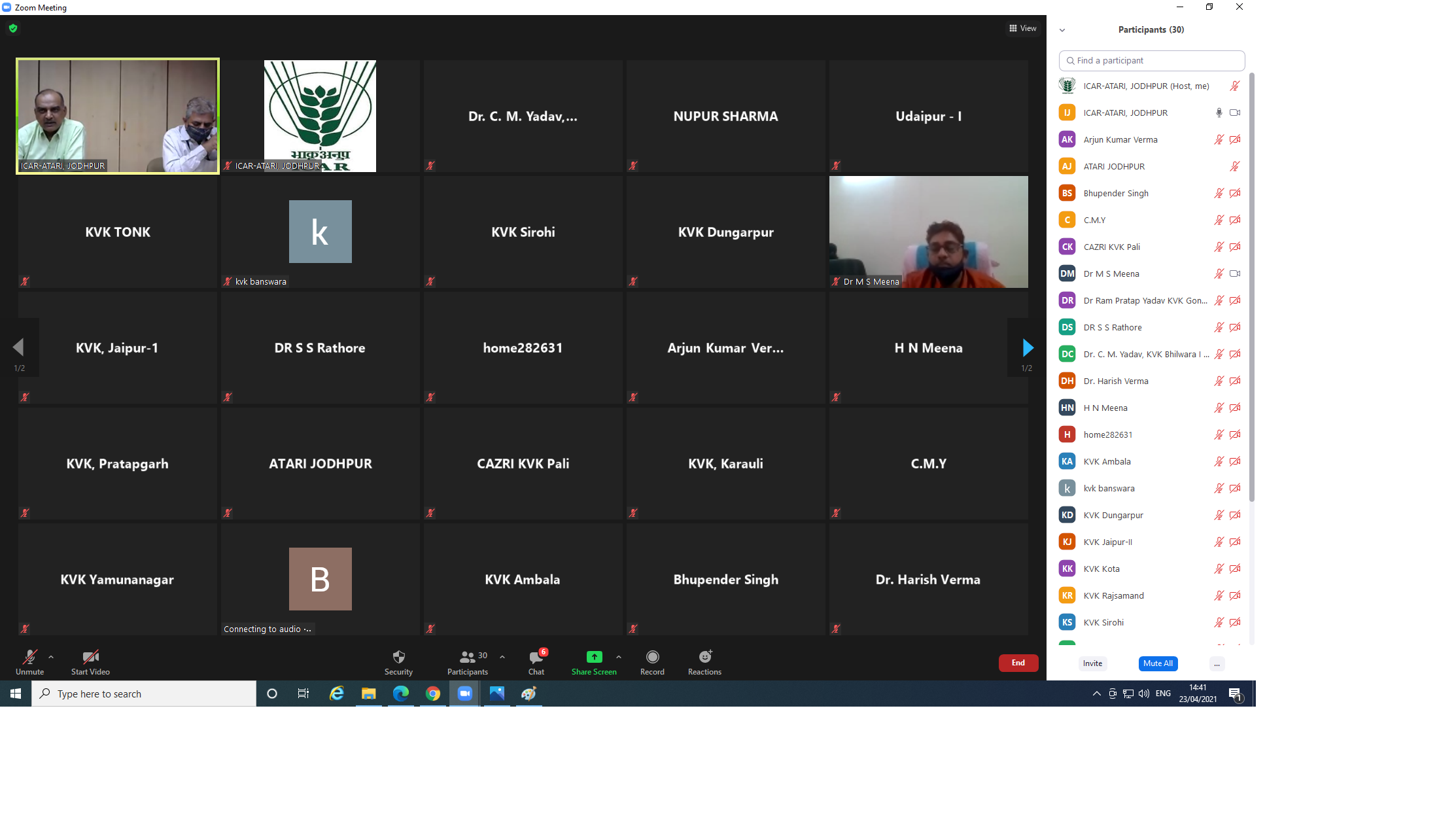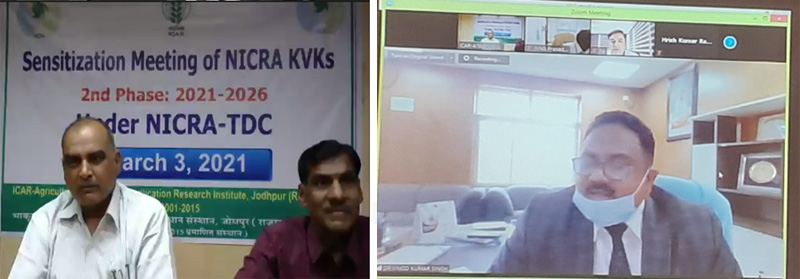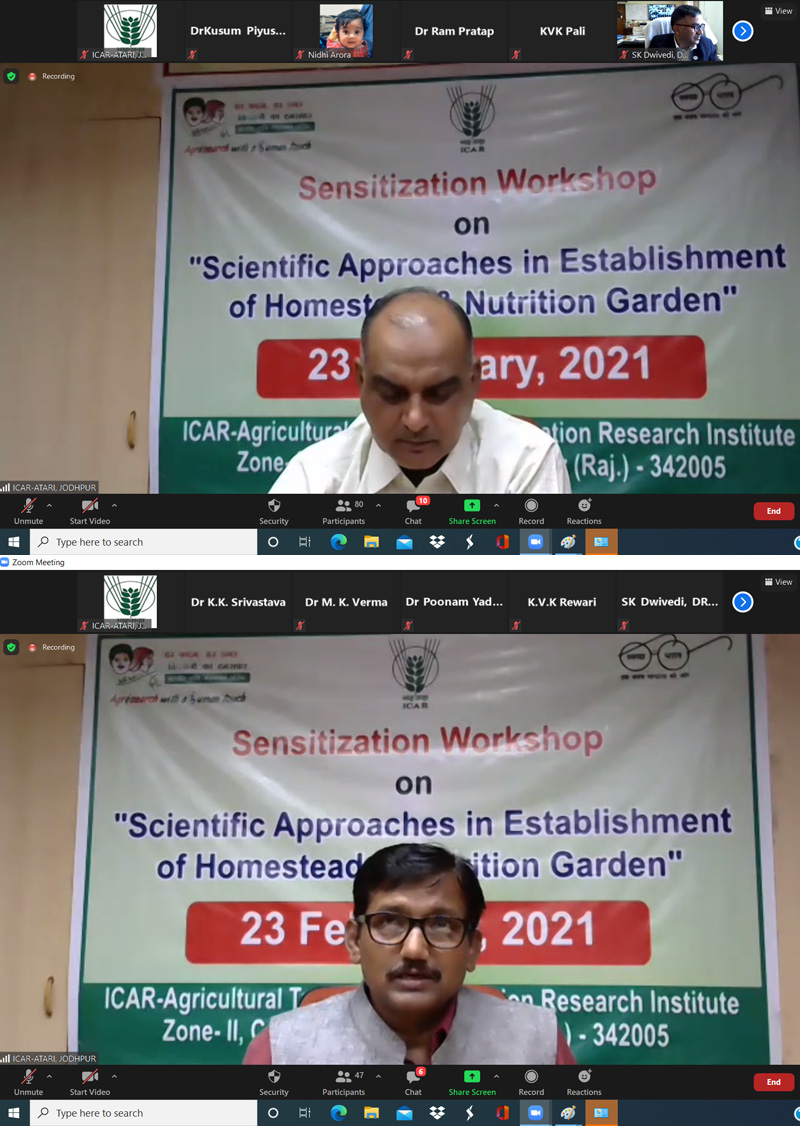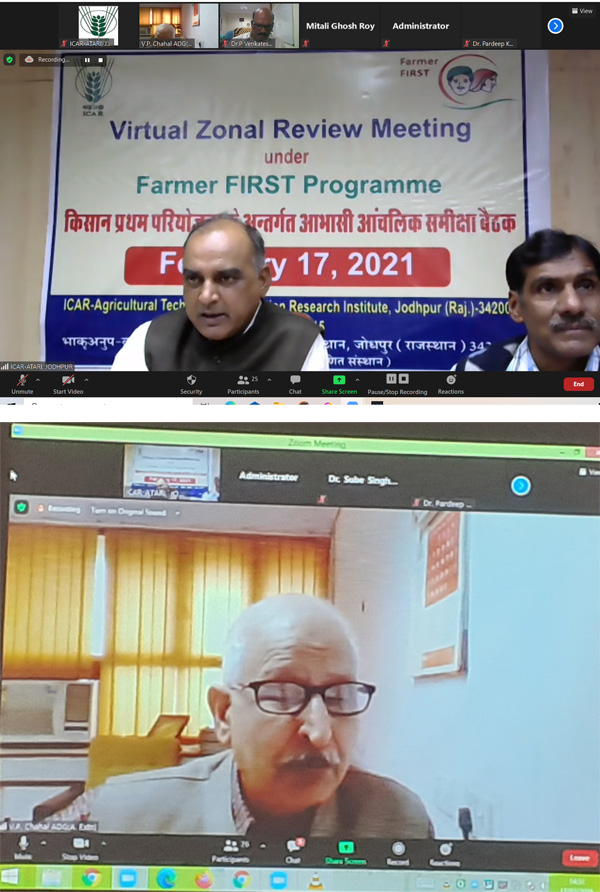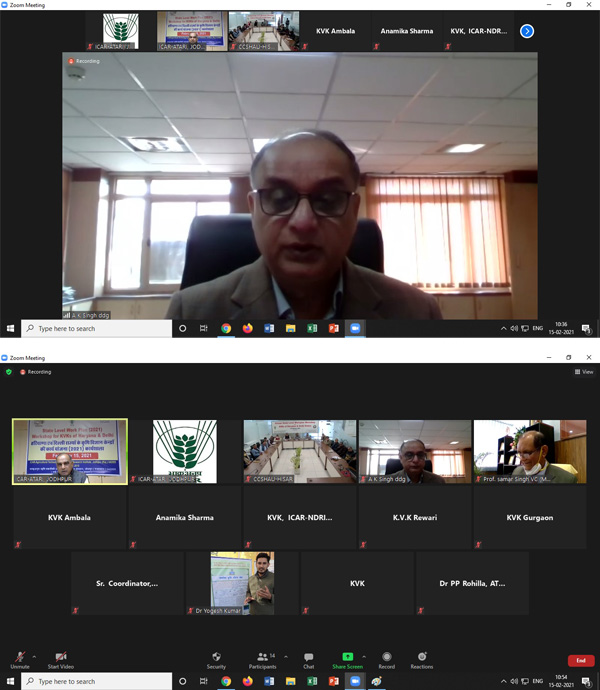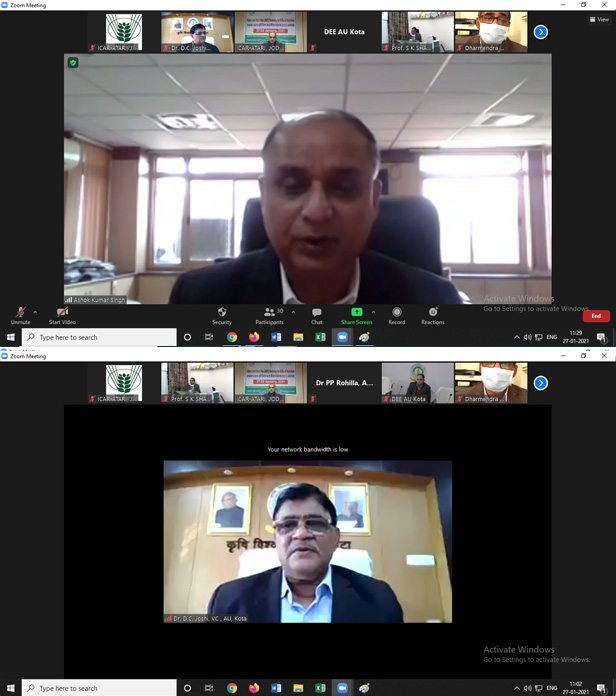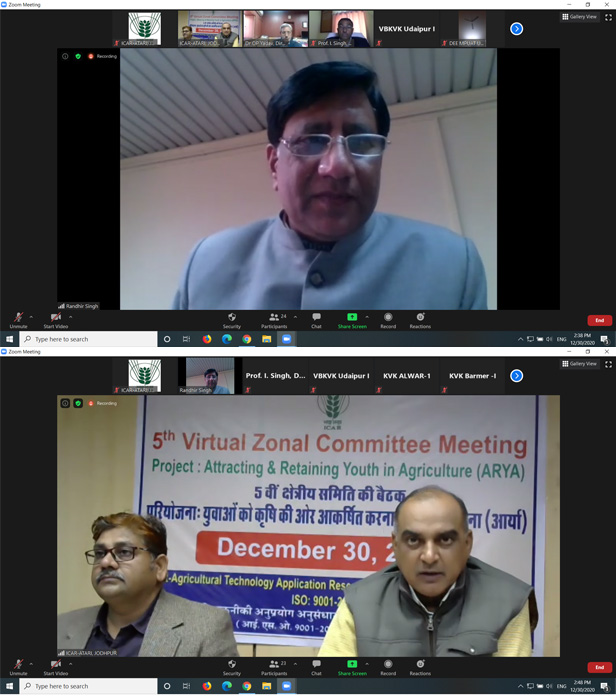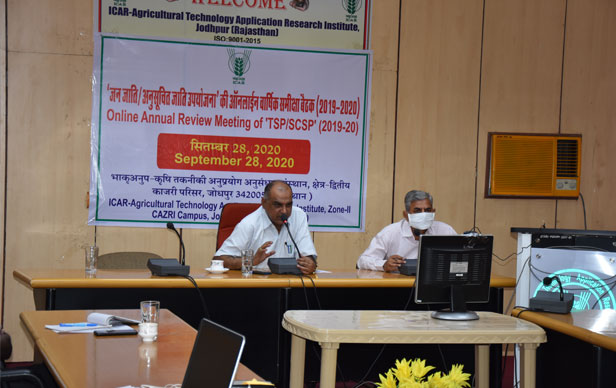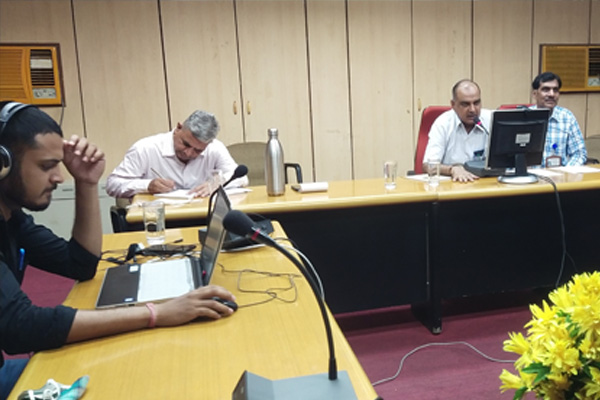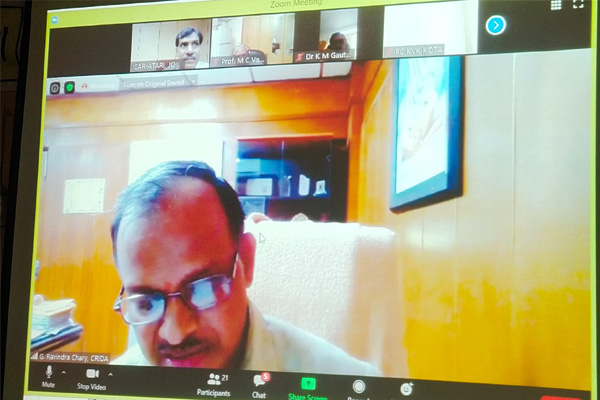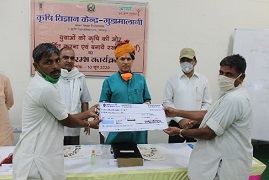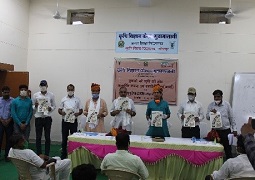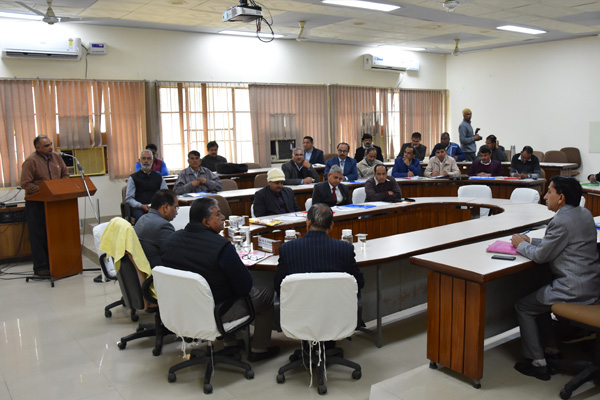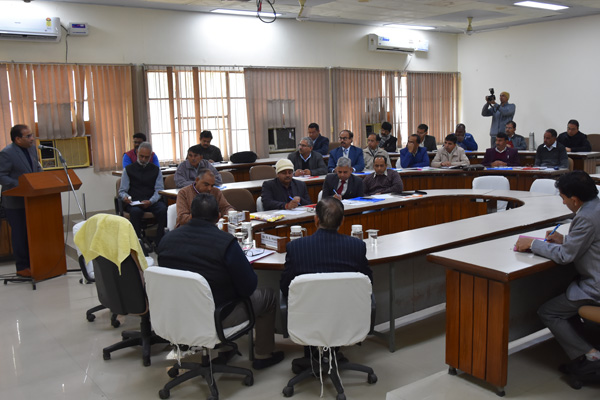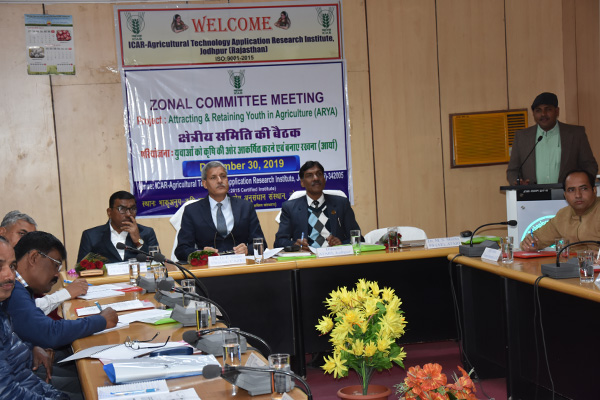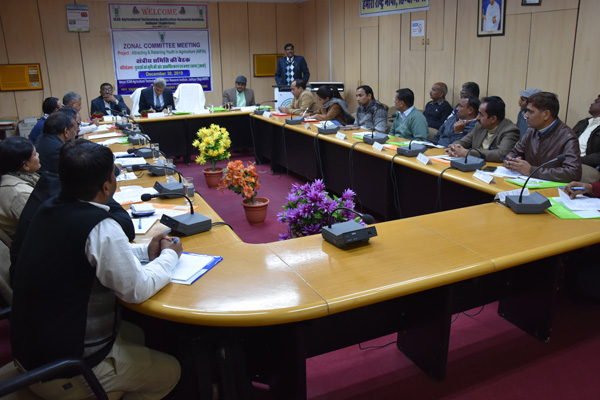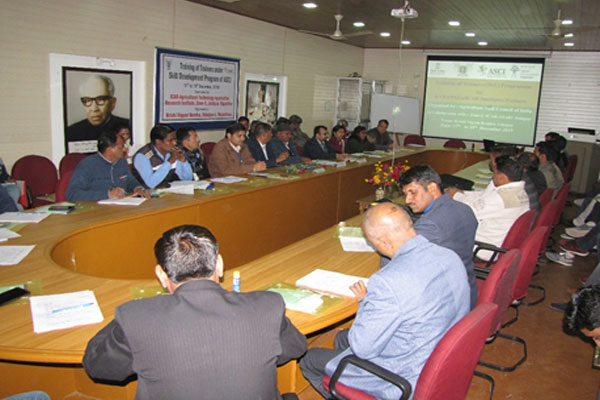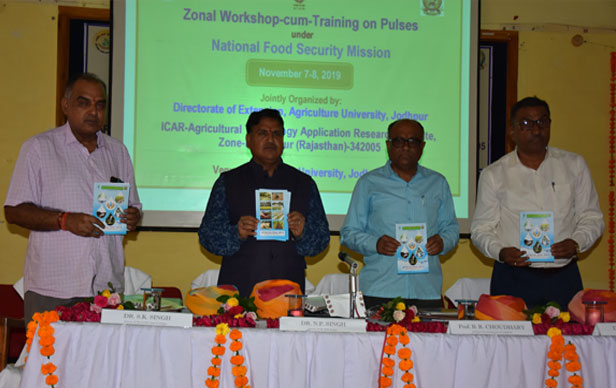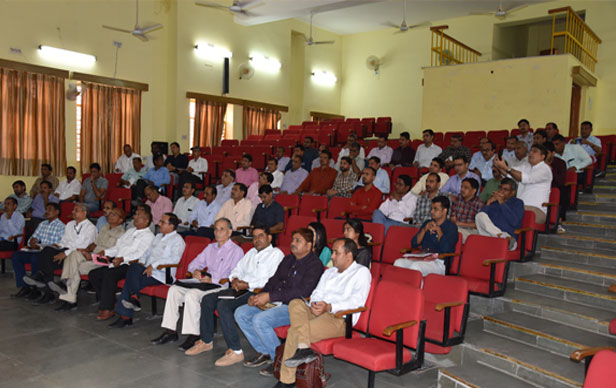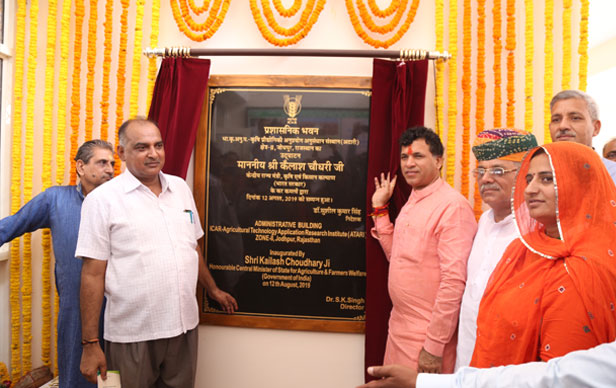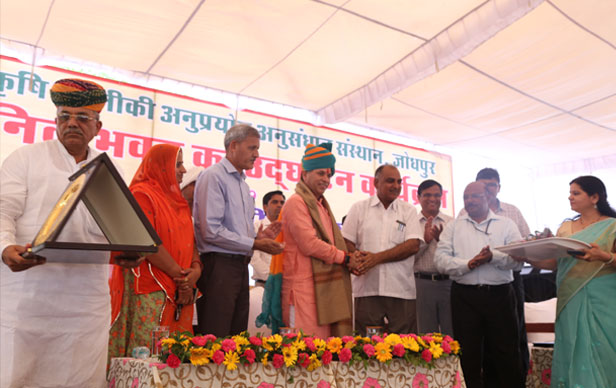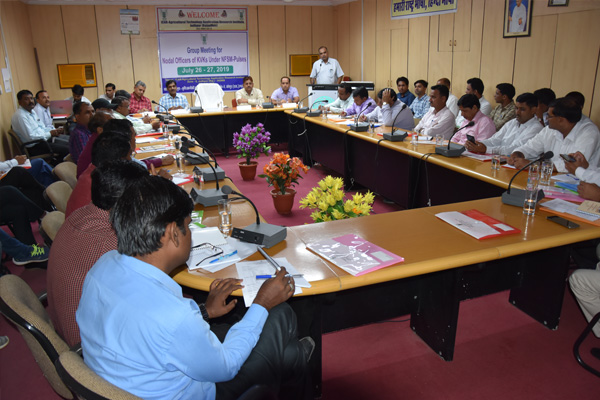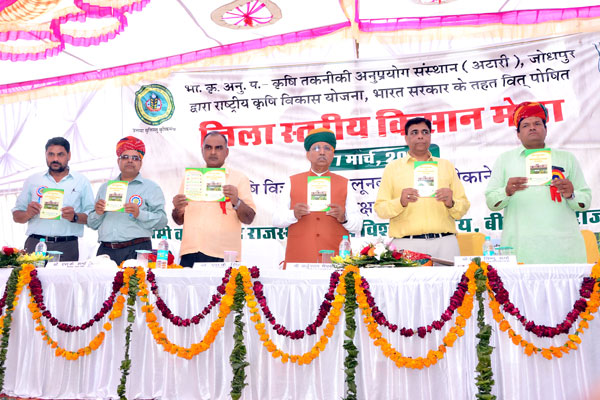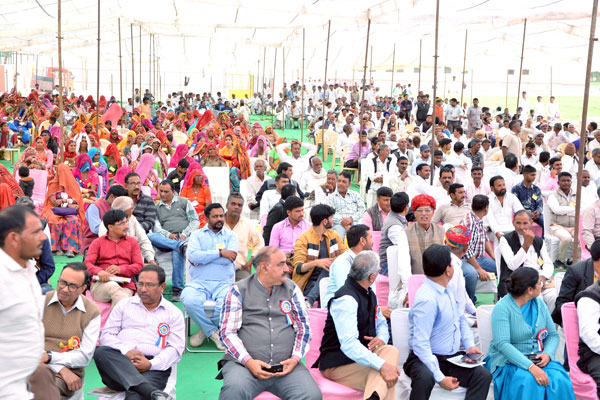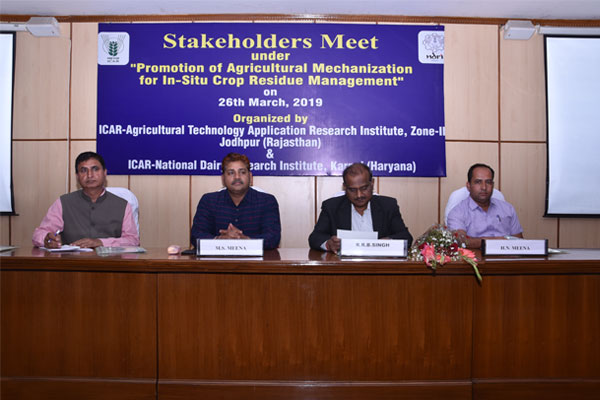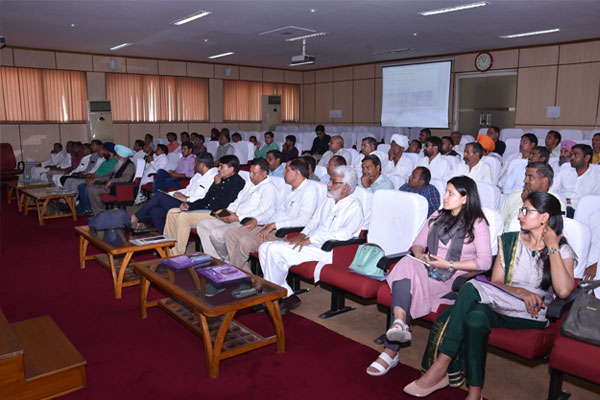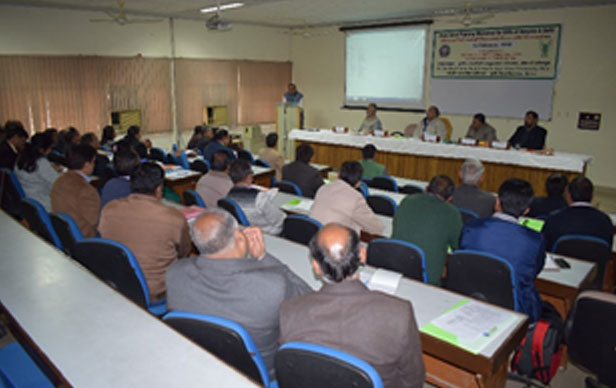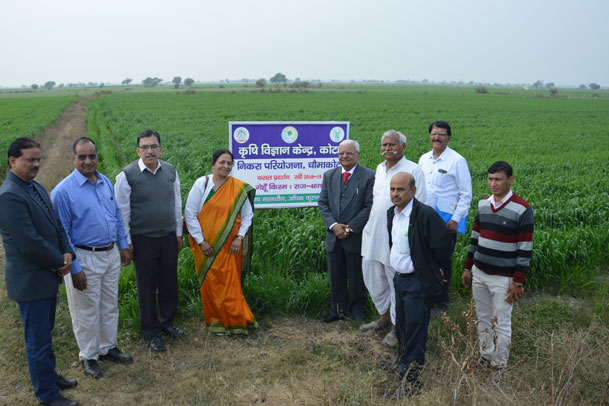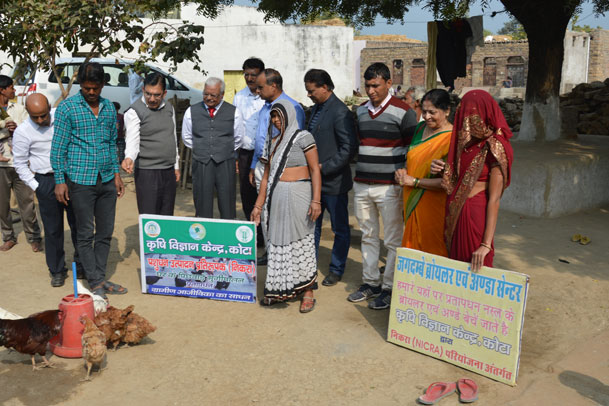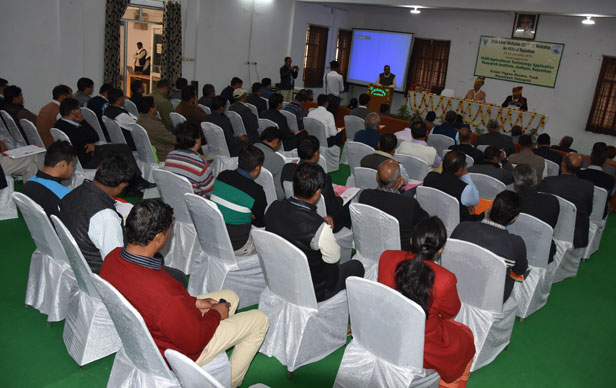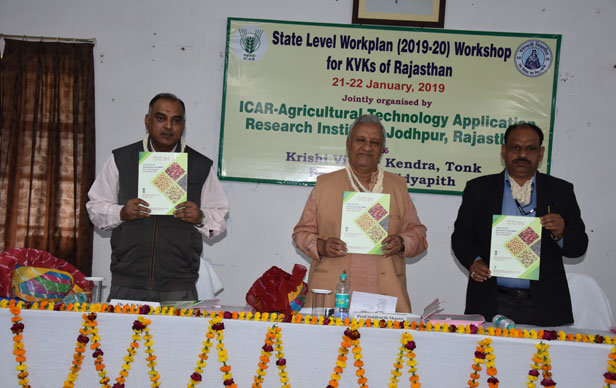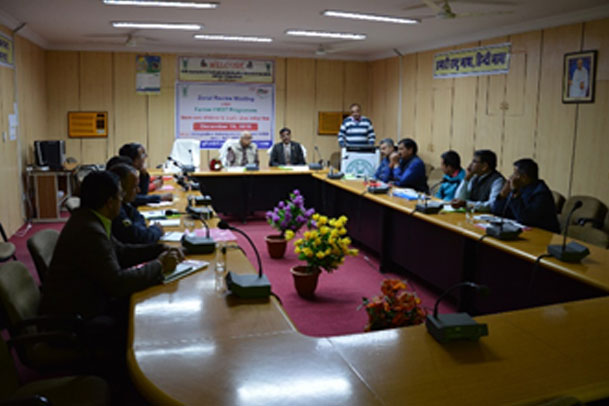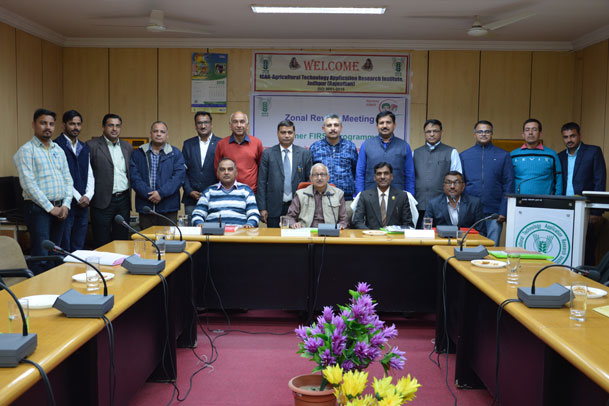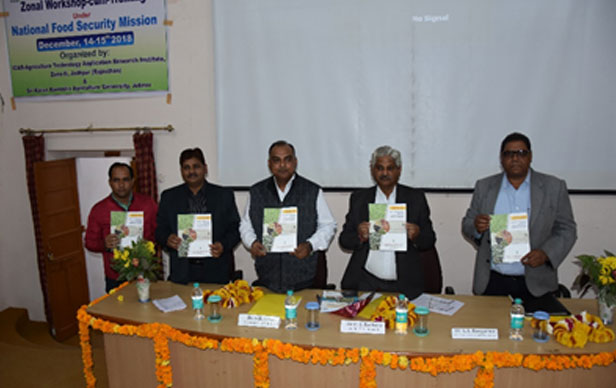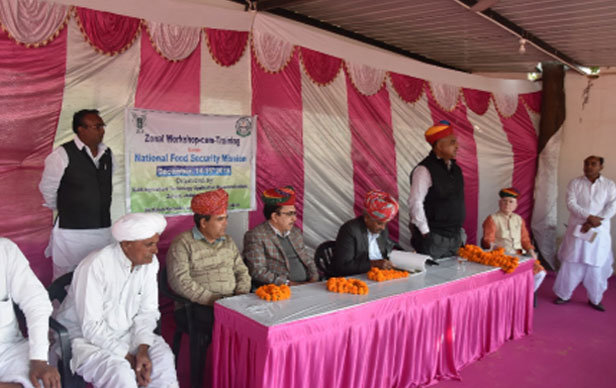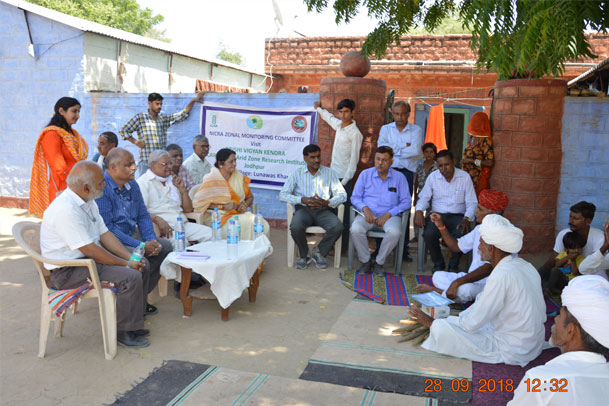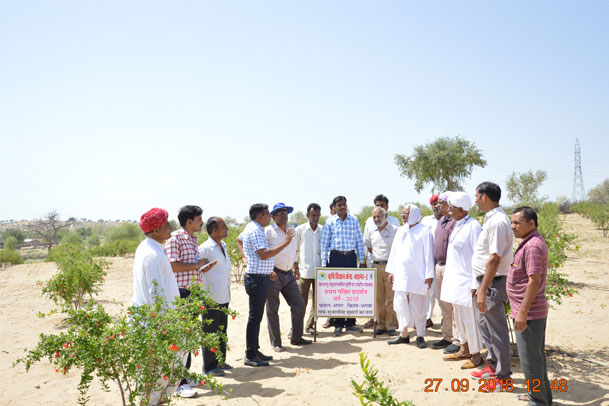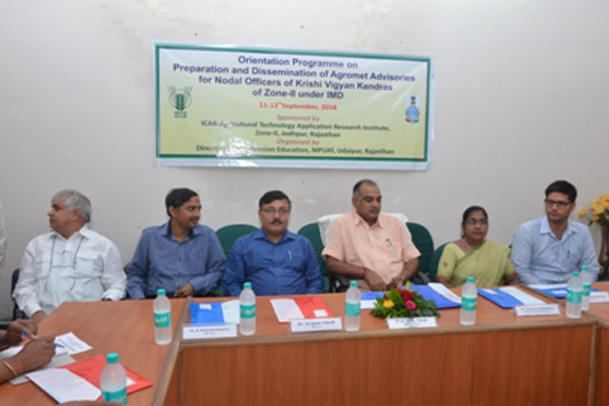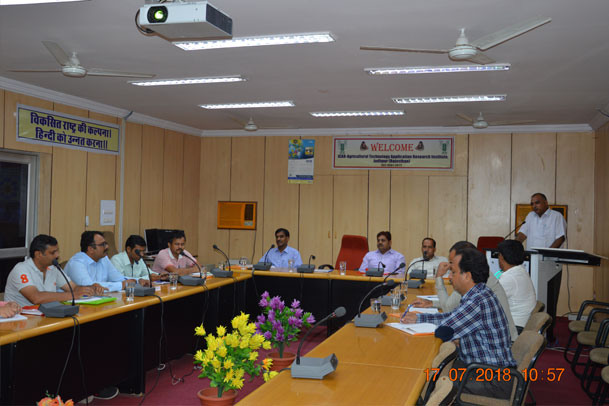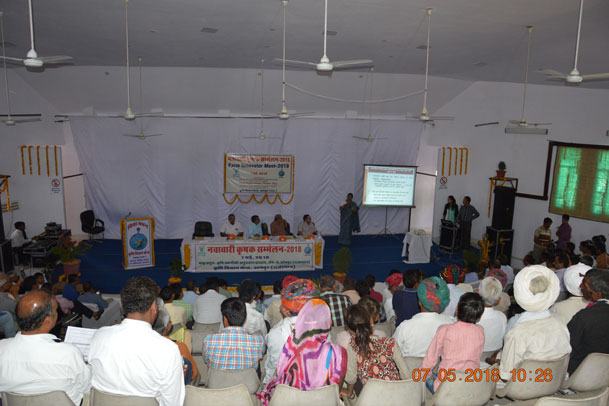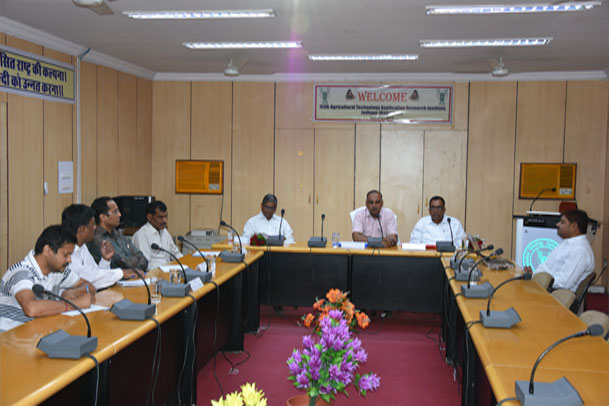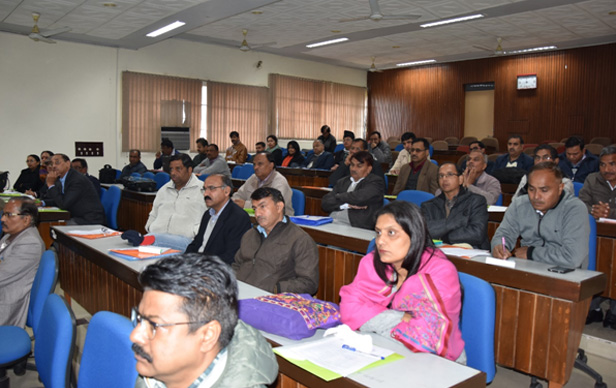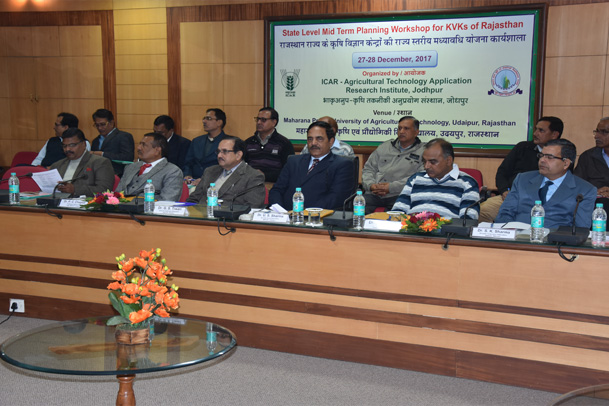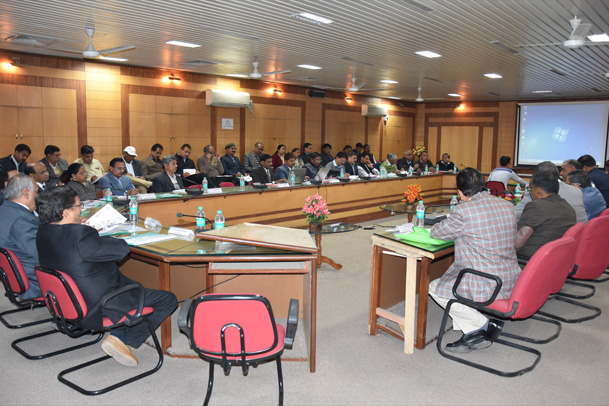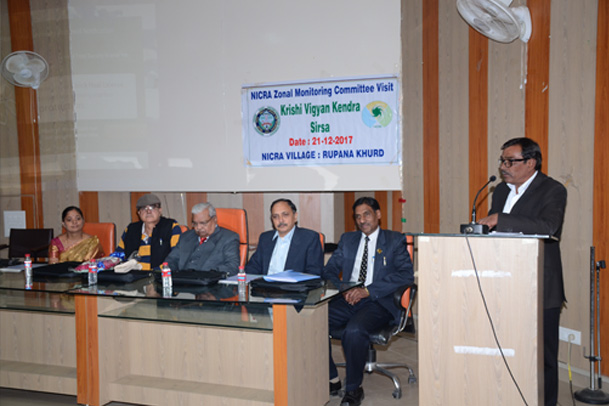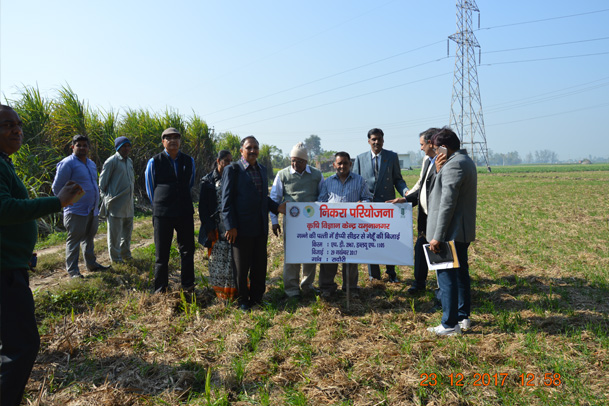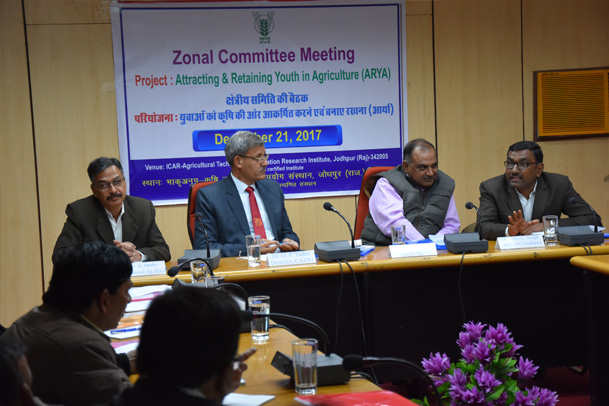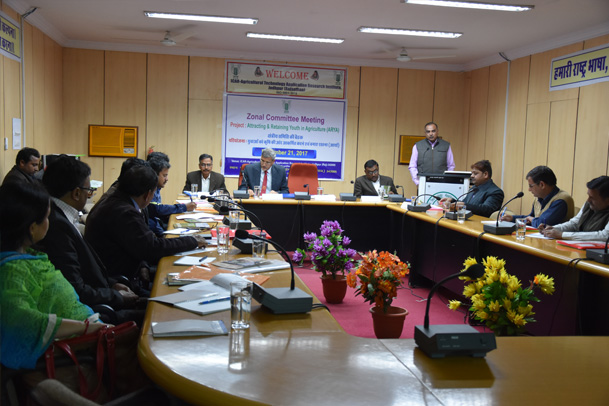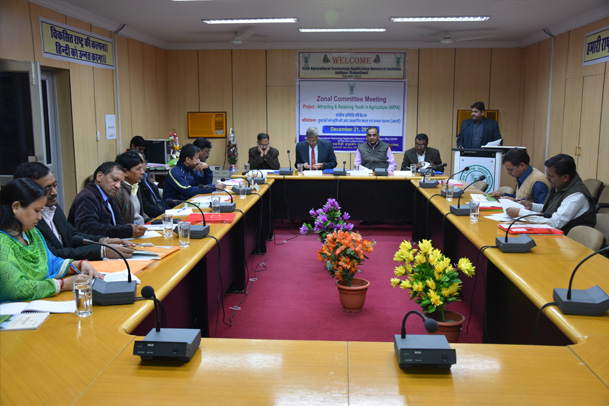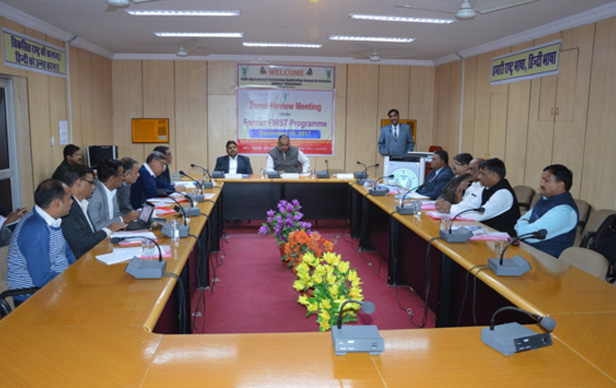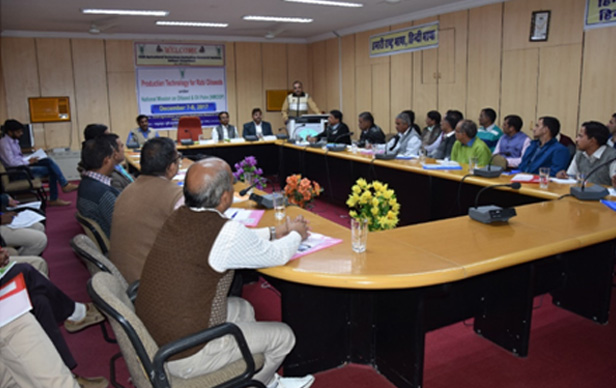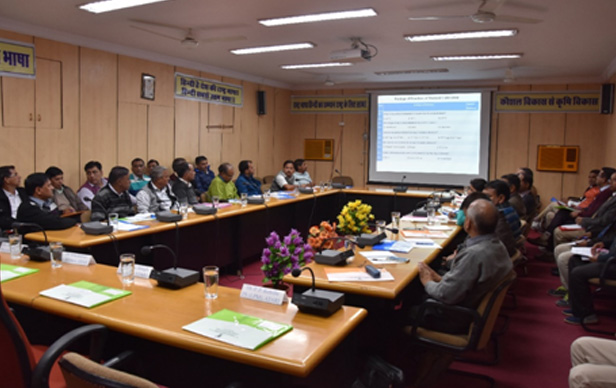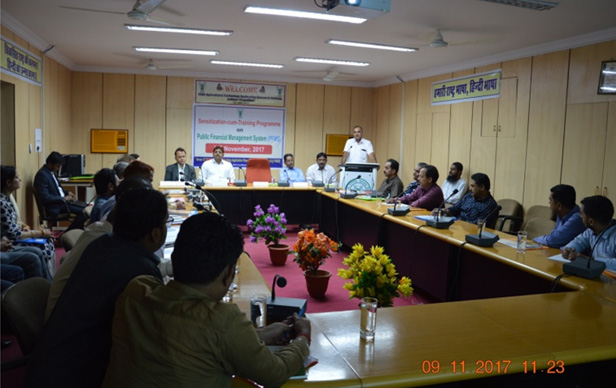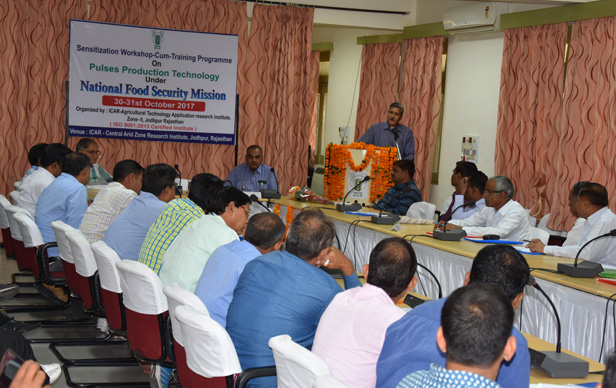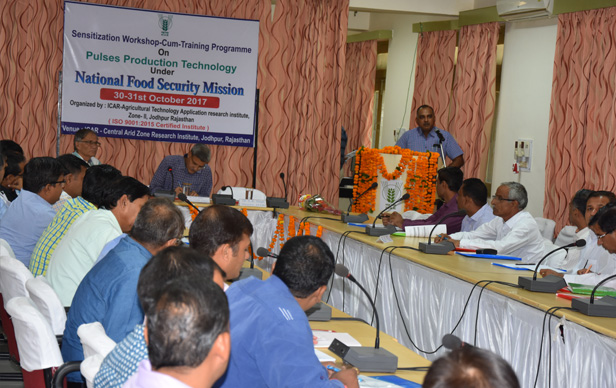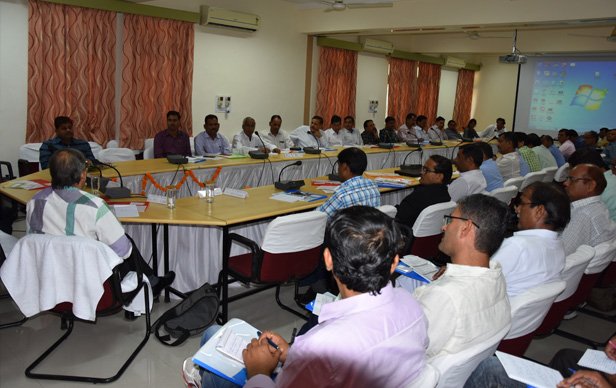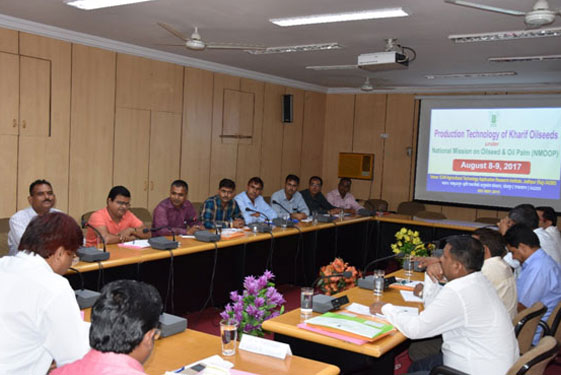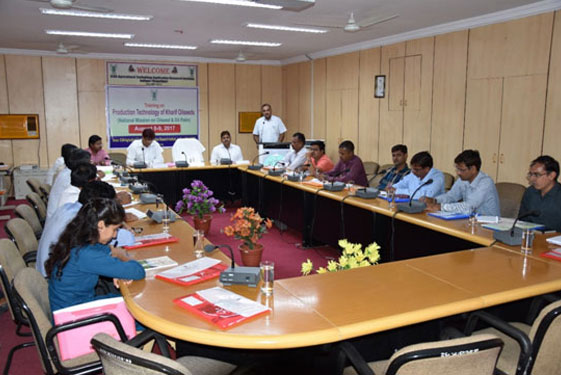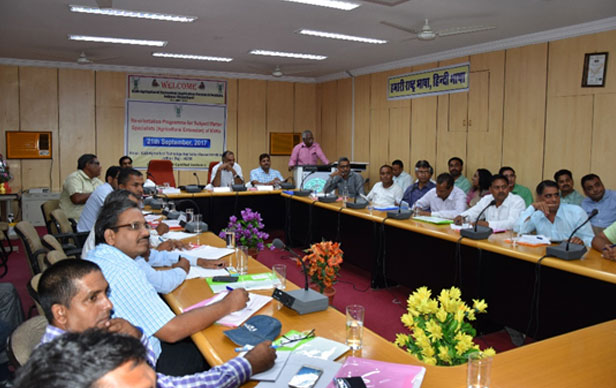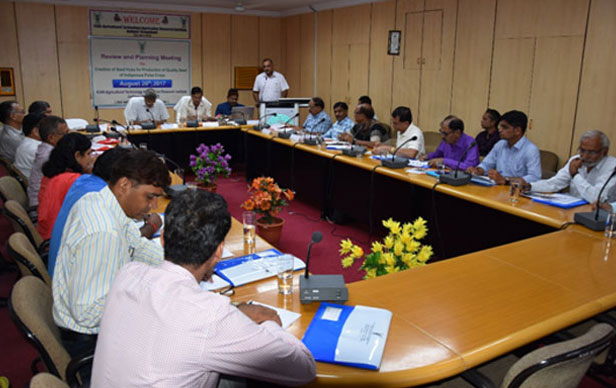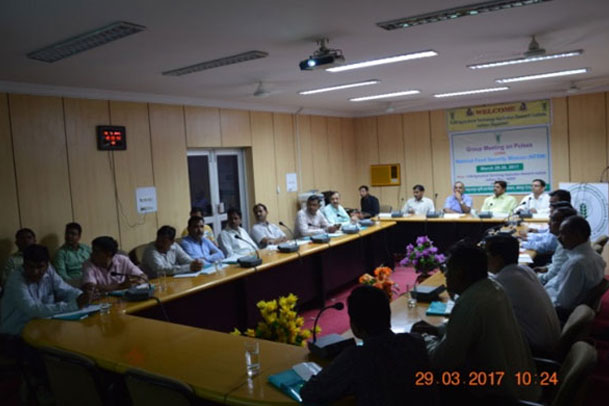

Recent News
Annual Review Meeting of DAPST inaugurated today at ICAR-ATARI, Zone-II, Jodhpur
6th Dec, 2024
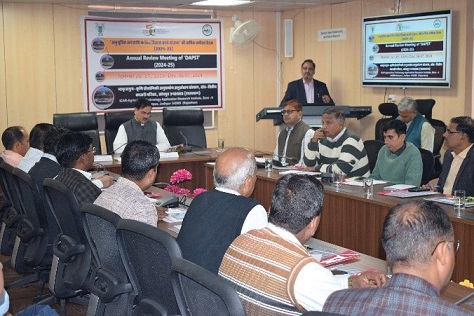
Annual Review Meeting of DAPST inaugurated today at ICAR-ATARI, Zone-II, Jodhpur
In the inaugural session Dr. J. P. Mishra, Director, ICAR-ATARI, Zone-II, Jodhpur mentioned that the Tribal community is the most disadvantaged and focus should be given on output and outcome of the DAPST project and the same should be analysed and inferences drawn/meaningful recommendations from the same must be reported for further improvement and implementation.
Sufficient fund flow is there for the project and the same must be utilised keeping in view of value for money and there should be tangible outcome with betterment of livelihood of the community.
Case studies of the project must be documented, he added. He also applauded that SAUs/ICAR Institutes and KVKs should work in convergence mode for implementation of the project..
Dr. R. L. Soni, Director of Extension Education, MPUAT, Udaipur gave an overview of tribal community of the Country, State and Districts of Rajasthan by mentioning that there is a total of 10.4 crore tribal population in India which is about 8.6% of total population and in Rajasthan with tribal population of 92.38 lakhs (13.8%) with 5700 villages in 24 districts of Rajasthan.
He emphasised on preparation of Annual Action Plan 2025-26 as per needs of the districts of Rajasthan particularly on Southern districts of Rajasthan.
Dr. P. Pagaria, Director of Extension Education, AU, Jodhpur mentioned that the project should execute extension programmes as per emphasis of recommendations of Government of India.
In the Annual Review Meeting 24 KVKs and two Directors of Extension Education will present their progress made during 2023-24 & 2024-25 and annual action plan for the year 2025-26 which will be thoroughly discussed and finalized.
Source ICAR-ATARI, Zone-II, Jodhpur
Annual Zonal Review Workshop of KVKs of Rajasthan, Haryana and Delhi inaugurated
10-12 Sept, 2024
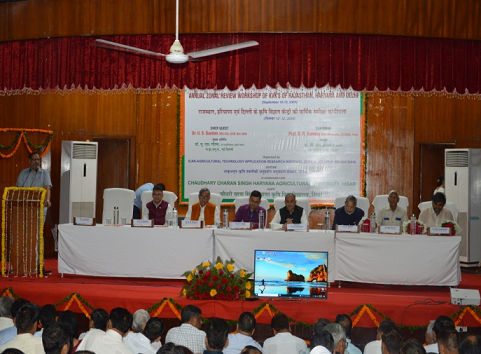 |
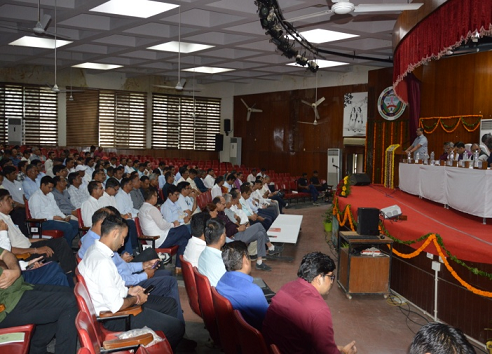 |
Annual Zonal Review Workshop of KVKs of Rajasthan, Haryana and Delhi inaugurated today at CCSHAU, Hisar..
Prof. B. R. Kamboj, Vice Chancellor and Chief Guest elaborated the importance of vast network of KVKs. He expressed concern about the challenges in extension systems, which can be streamlined by development of multi-disciplinary expertise of each SMS of KVKs. He asked KVKs to think beyond boundaries with science remaining in the centre.
Dr. M. M. Adhikary, Former VC, BCKV stated that KVKs are working 24 x 7 and are knowledge and information centre for agriculture of the district. The capacity development of KVK should be prioritized. He emphasized that the KVKs must take up efforts on agri-start ups, entrepreneurship development, feasibility study of trainings, climate resilient agriculture, drone application and FLD monitoring. Dr. S. K. Malhotra, VC, MHU, Karnal mentioned that KVKs should be treated a one stop solution of the district and KVKs should focus on knowledge depository, market/trade issues, high value crops/export potential crops, soil carbon improvement, etc. He also emphasized on validation of ITKs through KVKs. Dr. R. K. Singh, ADG (AE), ICAR emphasized upon cluster FLDs with role of KVKs in augmentation of production, removal of constrains in implementation of ARYA project, FPOs, introduction of climate resilient varieties through NICRA TDC, seed chain management, CRM, etc.. Dr. Ram Chand, Former ADG (AE), ICAR mentioned his concerns on competency development of KVKs, knowledge enhancement of KVK personnel, database development, feedback analysis, etc. Dr. J. P. Mishra, Director, ICAR-ATARI, Jodhpur welcomed the delegates and provided an overview. He highlighted his views on reducing chemical and carbon footprints, enhancing oilseeds and pulses production, identification of districts for implementation of PPV&FRA. He also mentioned that KVK system is the largest extension network in the country which is celebrating golden jubilee of its establishment of first KVK in the country. As most of the KVKs have completed their 40 years of establishment, there is a need for making analysis of KVK’s impact on growth of agriculture in the district and social benefits. Dr. R. G. Agrarwal, Chairman, Dhanuka Agritech mentioned that the problems of small and marginal farmers are to be addressed on priority. To reduce the gap in implementation help of ICT is required. To this regard, Public-Private-Partnership can play a great role. In the workshop a total of 23 publications of ATARI and KVKs were released. In the 3 days Annual Zonal Workshop 66 KVKs of Rajasthan, Haryana and Delhi and 7 Directors of Extension of SAUs will present the progress made by them during 2023.Zonal Virtual Review Meeting of Farmer FIRST Programme organized by ICAR-ATARI-II, Jodhpur
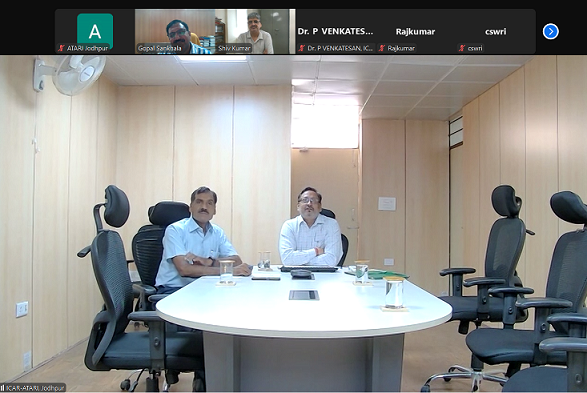 |
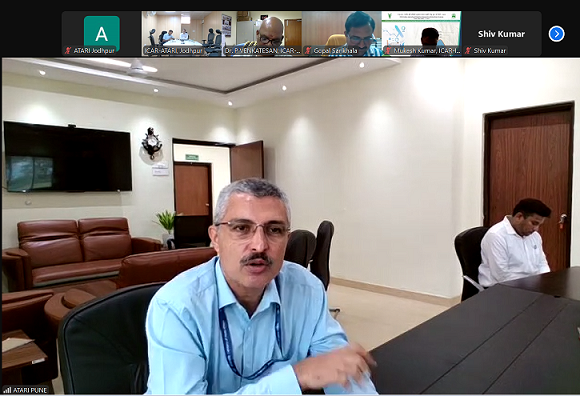 |
Zonal Review Workshop of KVKs under NICRA-TDC at ICAR-ATARI, Jodhpur 19-20 July 2024
19-20 July, 2024
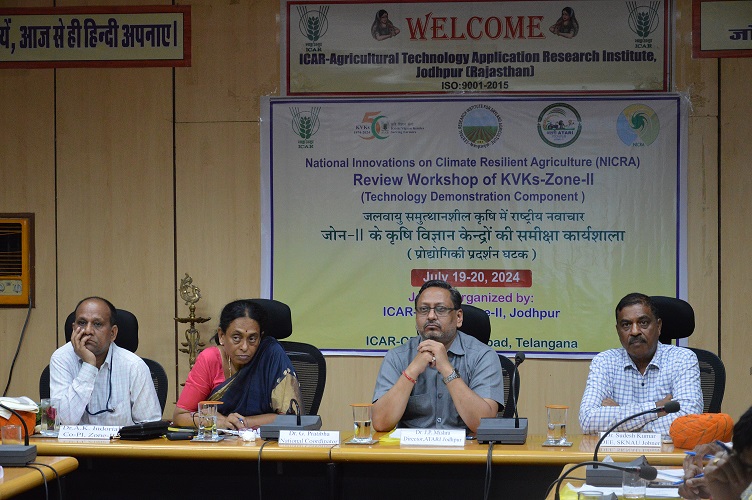 |
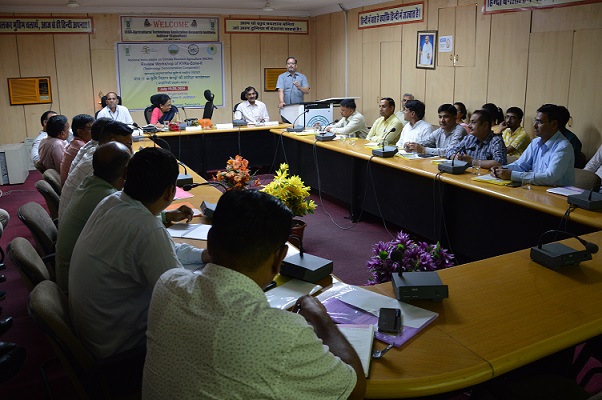 |
Two days Zonal Review Workshop of National Innovations on Climate Resilient Agriculture Project for the Krishi Vigyan Kendra’s of Haryana and Rajasthan was jointly organized by ICAR- Agricultural Technology Application Research Institute, Zone-II, Jodhpur and ICAR-Central Research Institute for Dryland Agriculture, Hyderabad.
The achievements for the year 2023-24 and action plans for 2024-25 of 18 KVKs having NICRA projects in Haryana and Rajasthan were reviewed during the programme. The Chairman, Dr. JP Mishra, Director, ICAR-ATARI, Zone-II, Jodhpur emphasized upon initiating new interventions models which have direct effect in the climate vulnerability of the given district. He highlighted that soil testing is crucial for climate-friendly agriculture, setting targets, educating farmers, and providing training to farmers, farm women, and youth can help to promote awareness and encourage sustainable agriculture practices. Further he opined that livestock based farming system and resource conservation technologies must be focused in arid region under NICRA-TDC. These interventions under NICRA should be aligned with existing cropping practices of the region based on vulnerability. Dr (Mrs) G. Pratibha. National Coordinator, NICRA-TDC elaborated how to proceed step by step for implementation of different modules and ways for developing district adaptation plan and procurement of those equipment’s which are more in demand by the farming community under CHC for adopted villages. Dr. Sudesh Kumar, Director Extension, SKNAU, Jobner, highlighted the NICRA project, which has been operating in climate-vulnerable districts of Haryana and Rajasthan since 2011, aiming to promote climate-resilient agricultural technologies. He appraised that deterioration of natural resources due to changing climate is to be taken care, especially land and water. Dr. P.P. Rohilla, Principle Scientist (LPM), ICAR-ATARI, Jodhpur coordinated the zonal review workshop. Dr. A.K. Indoria, Co-PI, NICRA, ICAR-CRIDA, Hyderabad and Sr. Scientist & Head and Subject Matter Specialist of 18 KVK of Rajasthan and Haryana participated in the review workshop.
Capacity Building Workshop for SMSs (Animal Science) of KVKs under ICAR-ATARI, Jodhpur
27th June, 2024
 |
Capacity building workshop being organized for SMSs (Animal Science) of KVKs from Delhi, Haryana and Rajasthan states at ICAR-ATARI-II, Jodhpur from 27 to 28 June 2024 under the Chairmanship of Dr. JP Mishra, Director, ATARI, Jodhpur. Dr. SK Garg, Hon’ble Vice-Chancellor, RAJUVAS, Bikaner was the Chief Guest and Dr RK Dhuria DEE, RAJUVAS, Bikaner was the special guest in the above programme. Dr PP Rohilla, Nodal Officer NICRA, FFP and convener of workshop briefed about need of the capacity building of Animal Science Subject Matter Specialists working at KVKs
Dr JP Mishra, Director, ATARI Jodhpur in his address, emphasized to update technologies related to animal breeding, nutrition, housing and health management in order to make it more effective and make the interventions more flexible for sustainable livelihood of the farmers. He further emphasized upon initiating the capacity development of all the technical persons working at KVKs for updating their knowledge. He also appraised for improving livestock based farming system and resource conservation technologies to be focused in arid region. Dr RK Dhuria, DEE appreciated the initiative taken for the capacity building of SMSs engaged at KVKs for livestock development activities in field conditions that will boost up the economy of livestock owners in arid region.
Dr SK Garg, Hon’ble Vice-Chancellor, RAJUVAS, Bikaner in his inaugural address, emphasized that due to change in temperature, rainfall pattern, draughts and floods there is an urgent need for devising strategies for adaptation to these changes to sustain the production and productivity of our livestock production systems, especially in arid zone. He appraised that deploying proven resilient practices for various animal production systems in the region by identifying the constraints for achieving resilience and by facilitating adoption of suitable technologies based on resource endowments. In addition, the scientific approaches for ensuring the resilience in livestock would be driven through capacity building and awareness in a participatory approach low cost technology should be promoted by KVKs.
Experts were invited from ICAR Institutes and SAUs and KVKs viz.; CAZRI, IVRI, NDRI, CIRG, CSWRI, KVKs of Jodhpur, Bhilwara, Udaipur, Sirsa to deliver lectures to the participants in two days’ capacity building programme. The participants had good interaction with all the experts for implementation of different modules and ways for developing scientific livestock interventions which are more in demand by the farming community under adopted villages. Two field visits at CAZRI animal feed unit and KVK Dairy Farm were also arranged for the participants.
The programme is being attended by SMSs (Animal Science) of 23 KVKs from Delhi, Haryana and Rajasthan states under ICAR-ATARI-II, Jodhpur. Dr B L Jangid, Pr. Scientist (Ag. Extn.) proposed vote of thanks to the Chief Guest and all the participants.
[Source: ICAR-ATARI, Zone-II, Jodhpur]
Source: ICAR-ATARI, Jodhpur
Annal Action Plan Workshop-2024 for KVKs of Harana & Delhi inaugurated
दिनांक 2024-02-05
Two-day Annual Action Plan Worksshop-2024 for KVKs of Haryana and Delhi has been inaugurated today at CCSHAU, Hisar. The Chief of the occasion, Dr. B. R. Kamboj, Vice Chancellor, CCSHAU, Hisar, stressed upon over-exploitation of natural resources in agricultural production and extension system has a major role to play to overcome the problem in a holistic manner. The traditional knowledge the farmers are in verge of extinction are to be compiled and scientifically validated, tested and the feedback to be obtained for further revalidation. KVKs have major roles to play in research-extension system, crop reside management so that zero-burning can be achieved. PRA study must include social system study and Custom Hiring Centres are to be managed and streamlined in an efficient manner in the line of cooperative way so that the small and marginal farmers can avail the resources. Dr. J. P. Mishra, Director, ICAR-ATARI, Jodhpur, mentioned that India has reached the peak in production of most of the agricultural products except oilseeds and the problem of plenty has emerged. The same has to be addressed by exploring exports through competitiveness, good agricultural practices and quality management so that the surpluses can be utilized in an efficient manner. Research governance in extension research should be vibrant so as to reach sustainability. In the workshop 19 KVKs of Haryana and Delhi will present their Work Plan for the year-2024 which will be thoroughly discussed and finalized for implementation. Source : ICAR-ATARI, Zone-II, Jodhpur
Zonal Midterm-Review Meeting of Farmer FIRST Programme organized by ICAR-ATARI-II, Jodhpur
दिनांक 2023-10-18
TZonal Midterm-Review Meeting of Farmer FIRST Programme was organized by ICAR-ATARI-II, Jodhpur on 18th October 2023 on major theme of integrating technologies and enriching knowledge under the Chairmanship of Dr RR Burman, Assistant Director General (Agil. Extn. Joined online), ICAR New Delhi. Principal Investigators from six different ICAR Institutes viz. CAZRI, Jodhpur; CSWRI, Avikanagar; CIRB, Hisar; CSSRI, Karnal; NDRI, Karnal; and IARI, New Delhi; and two State Agricultural Universities viz. AU Jodhpur and CCSHAU Hisar presented their progress for review period. Consortium leaders (two out of four) from IASRI and NAARM Hyderabad also presented their progress. The major objective of meeting was to review the progress of the on-going programme mainly on various approaches, processes, methodology and indicators, physical and financial progress, and also to discuss the operationalization mechanism of the implementation under Farmer FIRST Programme. Dr RR Burman, ADG (AE) emphasised upon adoption and horizontal diffusion of technologies in convergence mode with State Agriculture Department in the selected villages. There is need to develop some exit policy, in which the interventions must continue in a sustainable way while adopting the new villages under FFP. Some “Seed Hubs” might be created in cluster villages with farmers’ participation in order to ensure the seed availability for the farming community in crop season. Dr JP Mishra, Director, ATARI, Jodhpur briefed on diversified interventions and promotion of resource conservation technologies for efficient resource use to enhance income for sustainable livelihood security of farm families through establishment of need based Integrated Farming System in prevailing situations. He also briefed about objectives and concepts of the FFP being implemented especially Farmer FIRST Progrmme in holistic manner, in participatory and convergence mode in the country. Further, he explained that how FFP is unique programme, holistic in nature, consisting of several activities based on Integrated Farming System which covers interventions related to crop, livestock, natural resources and capacity building etc. Dr PP Rohilla, Nodal Officer from ATARI Jodhpur briefed about the major achievements during 2022 and urged for implementation of demand driven, local specific and need based technological modules in participatory mode. He also emphasized that the documentation of seven years’ achievements projecting concrete outcomes from Farmer FIRST Programme to be provided to DKMA, New Delhi. A total of 35 PIs and Co-PIs of FFP from Delhi, Haryana and Rajasthan states participated in this Zonal Midterm Review Meeting. Dr BL Jangid, Pr. Scientist proposed vote of thanks to the Chief Guest and all the participants. Source: ICAR-ATARI, Jodhpur
Three days Annual Zonal Review Workshop for KVKs of Rajasthan, Haryana and Delhi inaugurated
दिनांक 2023-06-19
Three days Annual Zonal Review Workshop for KVKs of Rajasthan, Haryana & Delhi has been inaugurated today at Agricultural University, Jodhpur. Dr. U. S. Gautam, DDG (AE), ICAR, New Delhi being the Chief Guest of the occasion, briefed about evolution of KVKs since 1974 and mentioned that KVKs have to focus on national priorities, feedback mechanism, seed replacement, etc. He also applauded that now India is self sufficient on Pulses and a mega project on oilseeds can be initiated at Jodhpur by involving DGR, Junagadh, DRMR, Bharatpur, IIOR, Hyderabad, IISR, Indore, AU, Jodhpur, etc. for making India self sufficient in oilseed and converting India from importing country to exporting country. Prof. B. R. Choudhary, VC, AU, Jodhpur mentioned that the KVKs are the main pillars of national extension system and KVKs should act more dynamically to address pesticide residue so that there will be no hinderance on export of commodities. Water management is a major issue being faced in Rajasthan and Haryana and the issue is to be addressed by conserving each drop of water and utilize in an efficient manner, he applauded. He also stressed upon the bio-fortified varieties, post-harvest and value addition and KVKs should have units on it. Dr. R. K. Singh, ADG(AE), ICAR, New Delhi stressed upon planning, monitoring, climate change, soil salinity issues, quality seed and planting materials, one district one product, convergence of knowledge by the KVKs. Dr. J. P. Mishra, Director, ICAR-ATARI, Zone-II, Jodhpur presented the activities carried out by the KVKs during 2022 along with future strategies and mentioned that KVK-KVK linkages to be developed along producers with produce owners. In the workshop more than 40 publications of KVKs were released. In the workshop, Directors of ICAR Institutes/representatives including CAZRI, Jodhpur; IIWBR, Karnal; DAMPR, Anand; CIAH, Bikaner, NRCSS, Ajmer, CSSRI, Karnal, etc. presented on latest technologies for transfer to farmers by the KVKs. During the three days’ workshop, 66 KVKs and 7 Directors of Extension Education of SAUs will present progress for the year 2022 which will be thoroughly discussed and will be critically examined for further improvement. Source: ICAR-ATARI, Jodhpur
Review Meeting of Scheduled Tribe Component and Scheduled Cast Sub Plan Organized
दिनांक 2022-10-28
ICAR-Agricultural Technology Application Research Institute, Jodhpur, Rajasthan has organized review meeting of Scheduled Tribe Component (STC) and Scheduled Caste Sub Plan (SCSP) on 28th Oct., 2022 at its premise. In the inaugural session, Dr. S.K. Singh, Director, ICAR-ATARI, Jodhpur emphasized upon establishment of direct benefiting units to improve livelihood security of Tribal farmers. He also highlighted substantial reduction of poverty and unemployment, creation of productive assets, Human Resource Development, Provision of Physical and financial security against all types of exploitation and oppression. He urged to all participants to work in convergence mode for addressing overall needs of Tribal & Scheduled Caste farmers by following holistic approach. Dr. Ishwar Singh, Director of Extension Education, Agricultural University, Jodhpur briefed that balanced growth and economic development is the ultimate aim of the programme and strategic plans are designed accordingly. He told that all scientific staff of each KVK must devote time for Integrated Socio-Economic Development of Tribal and Scheduled Caste farming community of your district. KVK wise presentation has been done including workplan for 2022-23. Total 24 Krishi Vigyan Kendras under Scheduled Tribal Components from Rajasthan and 14 Krishi Vigyan Kendras under Scheduled Caste Sub Plan took part from Rajasthan & Haryana. Director of Extension Education of five State Agriculture Universities of Rajasthan also expressed their views to overcome the present situations caused by climatic change. All have highlighted very serious issue “Lumpy Skin Disease” in cow and this devastating disease needs prompt action in convergence mode. In this programme, 47 KVKs of Rajasthan presented the scenario of their respective districts which were thoroughly discussed and finalized with improvement for preparing a document for overcoming such alarming weather situations.
Brainstorming session on “Present Scenario of crops, vegetables, livestock and future prospects in different regions of Rajasthan”
दिनांक 2022-09-07
Brainstorming session on Present Scenario of crops, vegetables, livestock and future prospects in different regions of Rajasthan” has been organized on 7th Sept., 2022 by ICAR-ATARI, Zone-II, Jodhpur. Dr. S.K. Singh, Director, ICAR-ATARI, Jodhpur in inaugural session focused on genesis and importance of strategies for coping with scenario of flood, abnormal, excessive rainfalls in different Agro-Climatic Regions of Rajasthan. He elaborated that total 10 Agro-Climatic Regions including Arid to Humid regions have been identified based on various weather conditions and other criteria. Rajasthan falls under highly vulnerable zone of country which requires special attention to cope up with flood, abnormal, excessive and even dry spell situations for obtaining desired level of productivity. Agriculture being challengeable in Rajasthan and looking at this rainy season (2022) rainfall, proper and effective extension approaches along with contingent plans are required to be implemented by each KVK and a policy document is to be prepared to overcome such situation. He also emphasized upon frequent occurrence of disaster, poor infrastructure, improper markets, financial assistance & insurance etc. are major risks to farmers of Rajasthan which can be mitigated by Proper Planning, implementation, monitoring, evaluation, providing technologies, promotion of Integrated Farming System Models etc. Dr. D. Kumar, Secretary, Indian Arid Legumes Society and Ex-Project Coordination, Arid-Legumes, CAZRI, Jodhpur mentioned that climate change is very fast and devastating and we must have proper planning & preparedness to tackle abnormal situations. He also viewed that maintenance of crops as well as soils is essentially given much attention for sustainable production. Animal based farming system and diversified farming system along with agri-Horti-Pasture-Forestry system need to be promoted to achieve sustainable income flow, he opined. He also emphasized that crop rotation with inclusion of Pulses in different cropping system will certainly lead to soil fertility improvement. Director of Extension Education of five State Agriculture Universities of Rajasthan also expressed their views to overcome the present situations caused by climatic change. All have highlighted very serious issue “Lumpy Skin Disease” in cow and this devastating disease needs prompt action in convergence mode. In this programme, 47 KVKs of Rajasthan presented the scenario of their respective districts which were thoroughly discussed and finalized with improvement for preparing a document for overcoming such alarming weather situations.
Review meeting of three network projects (18 & 19 July, 2022)
दिनांक 2022-07-19
A Review meeting of three network projects namely "Impact Assessment of Selected Interventions by KVK under Doubling Farmers Income for Enhancing Farmers Income”, “Assessing Dietary Diversity Consumption Pattern and Nutritional Security in Nutri-Smart Villages-As A Step Towards Vocal to Local” and “Network Project on Analysis of Agricultural Programmes Conducted in Aspiration Districts in India" was held during 18-19 July, 2022 at ICAR-ATARI Zone-II, Jodhpur. The meeting was held under the chairmanship of Dr. S.K. Singh, Director, ICAR-ATARI, Zone-II Jodhpur. Dr. S.K. Singh has given the opening remarks and in his opening remarks, he briefed an overview of the above network projects. During his address, he stressed upon the improvement of the performance of the KVKs, proper budget utilization and ethics of the network research projects, On-Farm Trias, Front Line Demonstrations, Trainings, etc. He also advised the KVKs to make close contacts with farmers to establish real partnerships with them so that KVKs association in the farm of, cooperation, collaboration, and contribution could be properly reflected in terms of visibility of KVK’s programmes at farmers fields. Dr R.A. Kaushik, Director of Extension Education, MPUA&T, Udaipur emphasized upon improvement in work efficiency at KVKs as well as farmers' fields even in resource-poor situations by KVK professionals. Dr. R.K. Rana, Principal Scientist (Agril. Economics), ATARI, Ludhiana has briefed about the project concept and purpose and also cleared the doubts in filling of the interview questionnaire. Dr. D. Badhan, Principal Scientist (Agril. Economics) ATARI, Jabalpur (M.P.) has presented the methodology of the data analysis of DFI Network project. Dr. Amerendra Kumar Principal Scientist (Horticulture) ATARI, Patna has also interacted with the participants of the KVKs and cleared the doubts of the KVKs professionals wherever required. Brief presentations have been given by Dr. Sanjay Kumar KVK Gumala and some selected KVKs of Zone-II. The overall progress of different projects has been thorally discussed In this programme, two may interactions were done to achieve real outcomes as per time line already fixed. Total 60 participants including resource persons from ATARI, Ludhiana, Patna, Jabalpur, Jodhpur and KVKs Professions from Rajasthan, Haryana Delhi & Jharkhand took active part. Besides this, other project partner from different ATARIs & KVKs also joined review meeting in virtual mode and provided their scientific inputs for improvements of projects.
Annual Zonal Review Workshop for KVKs of Rajasthan, Haryana & Delhi organized
दिनांक 2022-06-23
Annual Zonal Review Workshop for KVKs of Rajasthan, Haryana & Delhi states has been organized at MPUA&T, Udaipur during 25-27 June, 2022. Dr. A. K. Singh, Deputy Director General (Agril. Extn.), ICAR, New Delhi being the Chief Guest of the occasion mentioned that importance of KVKs has been realized now a days and visibility of KVKs is being recognized at district, state and national levels by public representatives. Linkages with Common Service Centres and KVKs are to be strengthened he mentioned. KVKs have to work as a innovation platform with convergence and partnership mode with creations of startups and knowledge resource centre, etc. he applauded. KVKs have to focus on application of drones, precision farming, one district – one product, FPO, natural farming, resource economization, oilseed production to reduce import and generation of income from outside agencies, he mentioned. Dr. N. S. Rathore, Vice-Chancellor, MPUAT, Udaipur as Guest of Honour, applauded that impacts of KVKs interventions are to be documented and visibility of KVKs should be created with proper planning, creation of infrastructure, providing proper services, patenting, publication of technology, etc. He also apprised various thematic area involving participatory technology development need to be done in convergence mode. Dr. B. R Kamboj, Vice-Chancellor, CCSHAU, Hisar informed that challenges are to be converted into opportunities e.g., utilization of IT during corona virus pandemic, climate change to be addressed in a proper way, farm mechanization to be taken up in right perspective, self-employment generation to be triggered, etc.on sustainable income generation Dr. A. K. Tomar, Director, CSWRI, Avikanagar mentioned that technology developer and user interface to be strengthened and in Integrated Farming System, animal component including small ruminants plays a vital role and the KVKs are to be well equipped. Dr. S. K. Singh, Director, ICAR-ATARI, Jodhpur mentioned that the KVKs have to take up the activities in a planned manner so that by the end of the year achievements can be visible to all the stakeholder. He stressed that livestock component, natural farming, bee keeping, water conservation, ICT based smart villages with public private partnership, farm mechanization, introduction of pulses in rice-wheat system particularly in Haryana are to be taken up in befitting manner which will pave the way for betterment functioning of KVKs and for improvement of socio-economic conditions of farmers. In the workshop experts from CSSRI, CSWRI, etc. presented the technologies to enhance the knowledge of participants. A poster session was taken up to display the interventions of KVKs. In the workshop more than 5 publications from ATARI and KVKs were released. In the workshop 66 KVKs, DEEs from SAUs of Rajasthan and Haryana presented their progress report of 2021 which were thoroughly discussed with suggestions for further development. Seven Director of Extension of SAUs from Rajasthan and Haryana took active part in the workshop Source : ICAR, ATARI, Zone-II, Jodhpur
Visit of Hon’ble Mos Sri. Kailash Choudhary ji at KVK Nagaur-I on 11/5/2022
दिनांक 2022-05-11
Hon’ble State Minister of Agriculture & Farmer Welfare Government of India, Sri Kailash Choudhary ji visited at KVK Nagaur-I on 11/5/2022. He critically monitored various demonstration Units including Goatry, Poultry, Net House, Soil Testing Lab, Small Food Processing Units etc. along with staff of KVK, farmers and other dignitaries. Interaction was also arranged in the committee room of KVK in which more than 46 farmers including members of Cluster Based Business Organisation (CBBO) took active part. Hon’ble Minister emphasized upon formation and promotion of Farmer Producer Organisation (FPOs) to get real benefits of production and value added products on sustainable basis. He urged to all staff of KVKs for establishment of Green House and Rainwater units on priority basis. On this occasion member of parliament & Ex State Minister Sri C.R Choudhary ji also addressed to gathering. He narrated about various schemes being executed through Government of India for benefit of farming community especially Pradhan Mantri Sinchai Yojana, Sub-Mission of Agricultural Mechanisation, Soil Health Cards etc. Dr. S.K. SINGH Director ATARI-Jodhpur briefed about progress and performance of KVKs of Rajasthan especially those are situated in Arid region. He also apprised upon establishment of Livestock based units in Arid region of Rajasthan for sustainable Rural Livelihood Security. DDM NABARD, District Officials, Staff of KVKs of Nagaur-I and II, Barmer-II and more than 50 farmers, farm women & rural youth were present.
Webinar on “Recent Trends in Modern & Precision Horticulture Farming
दिनांक 2022-03-30
The ICAR-Agricultural Technology Application Research Institute, Zone-II, Jodhpur organized a Webinar on “Recent Trends in Modern & Precision Horticulture Farming” on 30th March, 2022 for the KVK to update the KVK professionals of the Rajasthan, Haryana & Delhi on the concept of the modern & precision farming technologies. In inaugural address, Dr. S.K Singh Director, ICAR-ATARI, Zone-II Jodhpur highlighted the importance of modern technologies as well as precision farming techniques in present context of farming. He stressed upon the usability of the technologies under different condition and prevailing system. Dr. Singh narrated the importance of Artificial intelligence, sensors based use of water & fertilizers and drone technologies for enhancing input use efficiency. The chief Guest Dr. Singh has also told that the horticulture is very important sector of rural economy, self-employment and ancillary enterprises as well as crop diversification. The Guest of Honor Dr. R.A Kaushik, Director of Extension Education, MPUA&T, Udaipur has stated that this protected precision horticulture is pioneer especially in Rajasthan as many technologies have been emerged, but still there is huge gap in machinery availability in the Universities for applications of tools used in precision farming and modern farming system. He stressed upon the marketing of high value crops and due to low price, production is not profitable. Hence organized market for such type of low volume and high value produce needs attention for making the venture profitable one. Total of 8 interactive talks on modern & precision farming especially in horticulture sector have been virtually presented by resource persons of various ICAR institutes/SAUs of Rajasthan, Uttar Pradesh and Jammu & Kashmir. Besides, 3 KVKs one each of Rajasthan, Haryana and Delhi has also presented their works, activities & achievements pertaining to the precision farming & protected cultivation in this webinar.
'Krishi Vigyan Mela' organized by KVK-Barmer- II (Gudamalani), Rajasthan
दिनांक 2022-03-19
KVK-Barmer-II (Gudamalani), ATARI, Zone-II, Jodhpur, Rajasthan, organized ‘Farmer Fair’, on 19th Mar 2022 at village Padru. In which, Sh. Kailash Choudhary, Hon’ble Minister of State, Ministry of Agriculture and Farmers’ Welfare, GoI, was Chief Guest. In his address as Chief Guest Sh. Choudhary advised the farmers and farm women to adopt the latest improved agricultural technologies in holistic manner and take the benefit of various schemes and programmes of his ministry; initiated, and launched in the leadership of Hon’ble PM of Country, Sh. Narendra Modi. He said that farmers are the backbone of the country's economy and thus to support them the budget of agriculture by present GoI has been increased in multiples from Rs. 23,000 crores to Rs. 1,32,000 crores during the period of 2014-2022, and out of this almost more than half is directly transferred in accounts of farmers through 'PM Kisan Samman Nidhi', programme. He said that by establishing processing unit of pomegranate farmers can prepare juice, anar dana and essential oils, which are very high value items. Similarly, processing of sangari (unripen fruits of Khejari tree) farmer can earn Rs. 1000-1500 per kg in local market and by exporting the same they can earn Rs. 5000-7000 per kg. For getting the early (from second year onward) and quality yield of sangari, farmers should plant new variety of khejari ‘Thar Shobha’, on their field boundary. He further said that Pearl millet, which is grown on large area in the district, can be processed for value addition by making biscuits, kurkure (crunchy puffs), Chocolate, Cakes etc. and farmer can increase the value of pearl millet from Rs. 13-14 to Rs. 300 or 600 per kg. He appealed the farmers for ‘Mushroom cultivation’, as they can earn income of Rs. 1-1.5 lakh from a unit of 20’x20’ area. He emphasised that to enhance their income farmers must form FPOs in their area and ensure all the benefits of government’s supports in the form of equity of Rs. 15 lakhs and other financial supports. He also emphasised that to become ‘ATMA NIRBHAR’, farmers must focus on organic and natural farming in the coming time, he added that he will make efforts to get identified and declared some of the blocks of the district as by default organic, so that from the year one itself the produce can be certified as ‘organic’, one. The gathering was also addressed by the local MLAs Sivana Sh. Hameer Singh Bhayal, who appealed to the scientists to invent agro- techniques which can give more income with less water & cost and advised the farmers to take benefits of all the government schemes. Sh. Amra Ram Choudhary, Ex Revenue Minister, GoR, said that to take the benefits of the government programmes farmers should organize themselves. Dr. B R Choudhary, VC, AU, Jodhpur, who also presided the fair, highlighted various improved agro- techniques developed by the university and advised farmers to adopt them to enhance their income. Dr. Suresh Pal, Director, ICAR-NIAP, New Delhi, whose institute also sponsored this fair, said that farmer must come forward to take the benefits of various government schemes, all farmers must have their Kisan Credit Cards for easy loan and must join FPO for better marketing. In the beginning of the fair, Dr. Pradeep Pagaria, Sr. Scientists & Head, KVK, Barmer-II (Gudamalani), organizer of the Farmer Fair, welcome all the dignitaries and participants. The fair was attended by more than 3500 farmers, farmwomen, and rural youths, more than 30 public representatives, more than 15 officials from SAUs, ICAR-institutes, ICAR-ATARI-II, Jodhpur, KVKs, state line departments etc. More than 40 stalls, displaying latest agri-equipment, improve variety seeds of various crops, chemical agri-inputs, organic inputs, were also organized by SAUs, ICAR-Institutes, KVKs, private dealers and vendors for exposing the farmers to new agro- techniques. (Source: ICAR-Agricultural Technology Application Research Institute, Zone-II, Jodhpur, Rajasthan)
"Mega Farmer Fair" organized for reaching the unreached farming community
दिनांक 2022-03-02
"Farmers and farm women living in remote areas of Jaisalmer, must step forward in adopting advanced and latest agricultural innovations and technologies for doubling their income and better future of their agriculture.” With this call, Shri Kailash Choudhary, Hon'ble Union Minister of State, Ministry of Agriculture and Farmers Welfare, GoI, inaugurated the Kisan Mela on March 20, 2022, organized by Krishi Vigyan Kendra, Jaisalmer-I, ICAR- Agricultural Technology Application Research Institute, Zone-II, Jodhpur, at Khema Baba Mandir, 95 SLD Mohan Garh, Jaisalmer, Rajasthan. Shri Choudhary emphasized need for organizing such kind of farmer fair for reaching the farmers at their door step as well as at their field with agriculture innovations and techniques. He advised the farmers to work on doubling their income from processed products of Bajra, Cumin, Kair-Sangri, which are considered as identity of Jaisalmer. He laid emphasis on processing of Bajra as biscuits, oats, chocolates, and juice of cumin, processing of sangri for fetching better prices in market. He advised farmers to opt for plantation of improved “Thar Shobha” variety of khejari for earning better fruit of sangri. He encouraged the farmers of the area to take the benefit of the attractive facilities and provisions made by the government for forming a Farmer Producer Company (FPO) and apply efficient business management system in farming. Hon’ble Union Minister gave Registration Certificate to members of Board of Directors of FPO “Shresthtam Swarn Nagri Krishak Producer Company Limited” registered in Jaisalmer district in collaboration with NABARD. The Minister released leaflet 'Entrepreneurship and Income Opportunities for Rural Women in Herbal Gulal Manufacturing' published by Krishi Vigyan Kendra Jaisalmer. In the fair Ram of Marwari breed of sheep for breeding purpose, made available by CSWRI, RRS, Bikaner, were provided to 10 farmers by Hon’ble Minister. ‘Nutri-kits’ of vegetables by NHRDF, New Delhi, also provided to representative 10 women farmers by Hon’ble Minister. Dr. Subhash Chandra, Director, Directorate of Extension Education, SKRAU, Bikaner highlighted the extension activities extended to farming community by university and KVK’s, especially for Jaisalmer region farmers. Dr. P S Shekhawat, Director Research, SKRAU, Bikaner, encouraged farmers to adopt climate resilient improved varieties of crops for increasing yield. Dr. Deepak Chaturvedi, Senior Scientist & Head, KVK, Jaisalmer-I welcomed all dignitaries and highlighted objective of organizing fair. In the fair 20 exhibitions stalls were organized by university, ICAR institutes, line departments and other agencies displaying various latest agro- techniques viz. seed of improved varieties, fertilizers, manure, improved tools and machinery, organic farming techniques, horticulture, animal husbandry, and irrigation method etc. More than 2000 farmers, farm women, rural youth along with 25 Public representatives, 40 officials from State Agriculture University, ICAR Institutes, KVKs, State Line departments and other agencies participated in the fair.
Virtual State Level Workplan (2022) Workshop for KVKs of Haryana and Delhi organised
दिनांक 2022-02-04
One-day Virtual State Level Workplan (2022) Workshop for KVKs of Haryana and Delhi has been organised today at ICAR-ATARI, Jodhpur. Hon’ble Vice Chancellor, Dr. B. R. Kamboj, CCSHAU, Hisar being the Chief Guest of Inaugural Session highlighted several initiatives like “Mera Pani Meri Virasat” to address issues related to soil, water, environment and climate changes for the larger interest of farming community. Judicious use of various resources is the need of the hour he mentioned. He also briefed upon green, white, yellow and blue revolutions for harnessing self-sufficiency in food, milk, mustard and fishery sectors in sustainable manner. Capacity building of Rural Youth must be undertaken on regular basis to empower towards farming for sustainable income generation, he applauded. Dr. S. K. Singh, Director, ICAR-ATARI, Jodhpur briefed about scenario of crop, livestock, fishery, mushroom, etc. and its contribution of Haryana state. He also mentioned the importance of workshop and informed the participants about the priorities fixed by Government of India which are to addressed holistically by each KVK and the KVKs should act dynamically as per priority. He also mentioned that a time has come to move from Food Security to Income Security of farmers. Bio fortified varieties are to be introduced by each KVK and science led demand driven innovations are to be taken up through missionary/evolutionary approaches with smart village concept considering the prevailing system. He also highlighted the importance of post-harvest technology & value addition, precision farming, implementation Drone & Artificial Intelligence, Natural Resource Management, Organic & Natural farming, crop residue management, etc. for achieving the Doubling Farmers Income by transforming agriculture to business models. In the workshop a total of 19 KVKs (18 from Haryana and one from Delhi) and DEE, CCSHAU, Hisar are participating with presentation of their workplan for the year 2022 which will be thoroughly discussed and finalized for implementation. Source: ICAR-ATARI, Zone-II, Jodhpur
Virtual Launch cum Review Workshop of NICRA-TDC at ICAR-ATARI-II, Jodhpur organized
दिनांक 2022-01-31
One-day Launch cum Review Workshop of ‘NICRA (National Innovations on Climate Resilient Agriculture)- Technology Demonstration Component’ was held at ICAR-ATARI, Jodhpur on 31st January 2022 through Virtual mode to discuss and finalize the technical programmes of new KVKs under second phase of identified vulnerable districts of Rajasthan and Haryana states under the Chairmanship of Dr. SK Singh, Director, ATARI, Jodhpur. Dr. VK Singh, Director, ICAR-CRIDA Hyderabad was the Chief Guest of Virtual Launch cum Review Workshop. Dr PP Rohilla NICRA Nodal Officer briefed on districts which have been finally identified for second phase from April 2021 to March 2025. Dr VK Singh, Director ICAR-CRIDA, Hyderabad emphasized upon initiating new interventions models which have direct bearing effect with the climate changes. He also appraised for improving the soil organic carbon status and efficient recycling of biomass and efficient use site specific the nutrient based on soil health cards. Livestock based farming system and resource conservation technologies must be focused in Arid region under NICRA-TDC modules, he opined. Input/suggestions were invited from experts of ICAR institutes, SAUs of Rajasthan and Haryana states for inclusion of climate resilient technologies for new districts which can minimize the adverse effect of various climatic stresses/risks. Dr SK Singh, Director, ATARI Jodhpur in his address, emphasized upon changing climate present challenges for agriculture and due to change in temperature, rainfall pattern, draughts and floods there is an urgent need for devising strategies of mitigation and adaptation to these changes one of utmost requirement to sustain the production and productivity of various production systems, especially in arid zone. He appraised that deterioration of natural resources due to changing climate and is to be taken care, specially land and water are crucial, hence, their management interventions are to be taken up by the farmers. These interventions under NICRA should be aligned with existing cropping practices of the region based on vulnerability. Deploying proven resilient practices for various production systems in the village by identifying the constraints for achieving resilience and by facilitating adoption of suitable technologies based on resource endowments. In addition, the scientific approaches for ensuring the resilience would be driven through capacity building and awareness in a participatory approach. Dr JVNS Prasad, briefed about the future programme modalities of NICRA-TDC to be implemented in 200 selected vulnerable districts all over the country during second phase of NICRA-TDC i.e. 2021-2025. He elaborated how to proceed step by step for implementation of different modules and ways for developing district adaptation plan. Dr Indoria, Co-PI of NICRA Project suggested to add FPOs component, focus on convergence and survey has to be done as per climatic variability of the new proposed districts. Under CHC, procurement of those equipments which are more in demand by the farming community. The meeting was attended by Officials from Directors of ICAR Institutes, ATARI-II, Jodhpur, CRIDA, Hyderabad, Directors of Extension Education from Haryana and Rajasthan states, Sr. Scientists & Heads of the 18 Nos. NICRA-KVKs and other technical staff. Dr B L Jangid, Pr. Scientist (Ag. Extn.) proposed vote of thanks to the Chief Guest and all the participants. Source: ICAR-ATARI, Zone-II, Jodhpur
6th Virtual Zonal Committee Meeting of ARYA project (Rajasthan & Haryana) has been organised
दिनांक 2022-01-29
6th Virtual Zonal Committee Meeting of ARYA project (Rajasthan & Haryana) has been organised today at ICAR-ATARI, Jodhpur. Dr. Randhir Singh, ADG (Agril. Extn), ICAR, New Delhi, Chairman of the Committee and also being the Chief Guest of the occasion has mentioned the importance of the project in the context of development and also emphasized that One District – One Product must be taken care while selecting the enterprise for Rural Youth in the project. Only interested Rural Youth need be selected so that the rate of success can be maximized. He also mentioned that most of Rural Youth do not have the desired level of skill which should be addressed in the project so that their success can be showcased to other Rural Youth for multiplication of the model. Dr. S. K. Singh, Director, ICAR-ATARI, Jodhpur mentioned that livelihood security along with regular income flow are to be taken up by considering the major issue of small land holding sizes of majority of farmers. He also applauded that ecological balances are of paramount importance and to be addressed. Identification and orientation of Rural Youth with major objectives of attracting and empowering rural youth in rural area, establishing network groups and demonstration of functional linkages are to be addressed effectively. He expressed that monitoring and feedback mechanism of the project is to be emphasized by convergence of opportunities available in different schemes so that potential of the model can be harnessed properly. In the meeting Dr. O. P. Yadav, Director, CAZRI, Jodhpur, Dr. V. K. Pandey, Joint Director, Government of Rajasthan and four Directors of Extension Educations are actively involved to review the progress of 11 KVKs (7 from Rajasthan and 3 from Haryana) for making this nation’s important programme more vibrant. Source: ICAR-ATARI, Zone-II, Jodhpur
Virtual State Level Workplan (2022) Workshop for KVKs of Rajasthan inaugurated
दिनांक 2022-01-07
Virtual State Level Workplan (2022) Workshop for KVKs of Rajasthan has been inaugurated today at ICAR-ATARI, Zone-II, Jodhpur. A two-day Sensitization Workshop-cum-Training programme on Pulses Production Technology under NFSM has been inaugurated today at ICAR-ATARI, Jodhpur. Prof. (Dr.) B. R. Choudhary, Hon’ble Vice Chancellor, Agricultural University, Jodhpur being the Chief Guest of the occasion mentioned that workplan should be formulated by each KVK separately as per demand of farmers and requirements of the district. He also highlighted the importance of initiatives of Government of India viz., one district – one product, Farmers Producer Organisations, Self-Help Groups, etc. He applauded that workplan must be prepared well in advance considering the present situation of small and marginal farmers. Calendars for the whole year must be prepared by each KVK and KVKs should not work in isolation and coordination with nearby KVKs must be taken up, so that the farmers can be benefitted without much travel to other districts. Dr. S. K. Singh, Director, ICAR-ATARI, Jodhpur while mentioning the importance of workshop informed the participants about the priorities fixed by Government of India which are to addressed holistically by each KVK and the KVKs should act dynamically as per priority. He also mentioned that a time has come to move from Food Security to Income Security of farmers. Bio fortified varieties are to be introduced by each KVK and science led demand driven innovations are to be taken up through missionary/evolutionary approaches with smart village concept considering the prevailing system. Arid system as Rajasthan is having an area of 61 percent which needs attention for transforming different proven models of Integrated Farming System. He also highlighted the importance of post-harvest technology & value addition, precision farming, implementation Drone & Artificial Intelligence, Natural Resource Management, Organic & Natural farming for achieving the Doubling Farmers Income by transforming agriculture to business models. In this workshop six Directors of Extension Education of State Agricultural Universities, 44 KVKs of Rajasthan are participating and they will present workplan for 2022 for finalization. Source: ICAR-Agricultural Technology Application Research Institute, Jodhpur.
Two days Sensitization Workshop-cum-Training programme on Pulses Production Technology under NFSM has been inaugurated
दिनांक 2021-11-09
A two-day Sensitization Workshop-cum-Training programme on Pulses Production Technology under NFSM has been inaugurated today at ICAR-ATARI, Jodhpur. Prof. B. R. Choudhary, Hon’ble Vice Chancellor, Agricultural University, Jodhpur being the Chief Guest of the occasion stressed upon increasing pulses production of country as well as Rajasthan thereby enhancement of farmers’ income, varietal demonstration according to climate change, introduction of short duration varieties, adequate seed availability to farmers, proper functioning of seed hubs, etc. are to be addressed. Dr. S. K. Singh, Director, ICAR-ATARI, Jodhpur briefed about progress of the project and mentioned that the project should be implemented properly and no gap should exist in implementing the project under different farming situations. He also stressed that temperature variation during crop period is a major challenge and is to be addressed by introduction of short duration varieties as well as shifting of sowing time. The existing feedback mechanism is to be strengthened so that research on location specific problems can be taken up for further validation to reduce the gap in production system. He also applauded that farmer participatory varietal selection of different preferred traits can be taken up by planning of demonstrations. The concept “Think Globally and Act Locally” is to be taken up by KVKs in planning demonstrations to reduce gap in productivity as compared to national level. Summer Green gram is to be emphasized particularly in Haryana which will help in nitrogen fixation thereby reducing the input cost especially urea in next crops he mentioned. Introduction of varieties with synchronous maturity with mechanized harvesting should be definitely motivated to farmers to adopt the same, he applauded. Pulses production particularly in Arid areas are to be emphasized so that the nutritional security and dependency on import can be reduced he emphasized. In this workshop-cum-training invited experts from CAZRI, Jodhpur and IIPR, Kanpur will deliver lectures on pulses production and 63 KVKs of Rajasthan, Haryana and Delhi are participating and will present their progress and future workplan which will be thoroughly discussed and finalized with improvements. Source: ICAR-Agricultural Technology Application Research Institute, Jodhpur.
Mid Term Review Meeting of Scheduled Tribe Component and Scheduled Caste Sub Plan Organized
दिनांक 2021-10-21
ICAR-Agricultural Technology Application Research Institutes, Zone-II, Jodhpur organized mid-term review meeting of Scheduled Tribe Component and Scheduled Caste Sub Plan on 21st October, 2021 in the premise of institutes. In the beginning of the meeting Dr. S.K. Singh, Director, ICAR-ATARI, Jodhpur highlighted objectives, major activities, involvement of different stakeholders in execution & monitoring etc. for Socio-economic upliftment of Tribal as well as scheduled caste families. He emphasized upon major focus on improving modern skills to enhance employability including traditional Skills, Sustainable Income Generation, Livelihood Security, improved varieties of traditional Crops, Horticulture, Dairy, Poultry, fisheries etc. Mechanism need to be developed to bridge gap between Scheduled Tribe population and others by accelerating the development for them. He also briefed about Centrally Assisted State Development Schemes for welfare of Scheduled Tribes & Scheduled Caste families. Dr. Ishwar Singh, Director of Extension Education, AU, Jodhpur also focussed on execution of direct benefiting programmes & activities as per demands for their empowerment on sustainable basis. Dr. Sudesh Kumar, Director of Extension Education, SKNAU, Jobner also told to work in convergence mode by following participatory approach, so that tribal farm families could take active part in all aspects/enterprises for their Socio-economic improvement. Total 24 Heads/Nodal Scientists of Krishi Vigyan Kendras of Rajasthan took part under Scheduled Tribe Component and five (three from Rajasthan and two from Haryana) joined to present performance of Scheduled Caste Sub Plan Component. Source: ICAR-ATARI, Jodhpur.
Brain storming session on “Strategy for coping scenario of drought & flood in Rajasthan” organised
दिनांक 2021-09-03
Brain storming session on “Strategy for coping scenario of drought & flood in Rajasthan” has been organised today at ICAR-ATARI, Zone-II, Jodhpur. Dr. S. K. Singh, Director, ICAR-ATARI, Jodhpur focussed on genesis and importance of strategies for coping with scenario of drought and flood in Rajasthan. He mentioned that as per agro-ecological zones of India, Rajasthan falls under highly vulnerable zone which requires special attention to cope up with drought and flood like situations. Agriculture being challengeable in Rajasthan and looking at this year’s rainfall, proper extension approaches along with contingent plan are required to be implemented by each KVK and a policy document is to be prepared to overcome such situation. He also stressed that, frequent occurrence of disaster, poor infrastructure, improper markets, financial assistance & insurance, etc. are major risks to farmers of Rajasthan which can be mitigated by proper planning, providing technologies, introduction of IFS models, etc. Dr. D. Kumar, Secretary, Indian Arid Legumes Society and Ex-PC, Arid Legume, CAZRI, Jodhpur mentioned that climate change is very fast and devastating and we should have preparedness for worst situation. He also stressed that maintenance of crops as well as soil is very much required and plant based and soil based technologies are to be implemented along with proper plant population. Animal based farming system and diversified farming system along with agri-horti-pasture-forestry system will lead to sustainability, he opined. He also stressed that crop rotation along with introduction of pulse crop will lead to soil fertility improvement. Directors of Extension Education of SAUs of Rajasthan, expressed their views to overcome the situation caused by climatic change. In the programme 44 KVKs of Rajasthan will present the scenario of their respective districts which will be thoroughly discussed and finalized with improvement for preparing a document for overcoming the disaster. Source : ICAR-ATARI, Zone-II, Jodhpur
Virtual Review Meeting of Gramin Krishi Mausam Sewa (GKMS) project of IMD organised
दिनांक 2021-07-29
Virtual Review Meeting of Gramin Krishi Mausam Sewa (GKMS) project of India Meteorological Department has been organised today at ICAR-ATARI, Jodhpur. Dr. Randhir Singh, ADG (Agril. Extn.), ICAR, New Delhi being the Chief Guest of inaugural session, mentioned that climate change is a real challenge and stressed that automation of agro-advisories based on meteorological information are very much essential and it should be taken up with minimum human intervention with proper predication and accuracy. He also appealed that advisory must be easier to understand and should be in local languages. There is a need to upgrade the knowledge of SMSs of KVKs and they should interact with farmers so that feedback can be recorded particularly on relevance of advisory. Dr. K. K. Singh, Head, IMD, New Delhi stressed upon improvement of quality of service in weather forecast particularly on block-level forecasts. He also added that information related to soil moisture observation in field conditions must be made available for digitization/automation of long term advisories. Depending upon weather data, crop advisories are to be provided in consultation with agricultural experts for benefitting farming community, he stressed. He also emphasized upon orientation training programmes for Heads & SMSs of KVKs so that proper/real-time advisories can be provided to farmers. Dr. S. K. Singh, Director, ICAR-ATARI, Jodhpur mentioned that forecasting of weather is very much essential particularly for agricultural operations to achieve sustainable agricultural production looking at different agro-ecological zones of India. He also mentioned about Good Agricultural Practices, one product one district, crop based agro-advisories for achieving doubling farmers’ income, etc. He also emphasized upon for developing interrelationships between weather and climate, crops, trees and livestocks. In the programme 24 KVKs of Rajasthan, Haryana and Delhi are participating to present their progress which will be thoroughly discussed with suggestions for further improvement. Source : ICAR-ATARI, Jodhpur.
Webinar on "Agri-tourism: Future of Indian tourism & New Agri-business Avenues to the Indian Farmers"
दिनांक 2021-06-29
ICAR-ATARI, Jodhpur has organized webinar on "Agri-tourism: Future of Indian tourism & New Agri-business Avenues to the Indian Farmers" on 29th June, 2021. In this inauguration session Dr. N.P. Singh, Ex-Director, NASM, Baramati, Maharashtra highlighted concept and philosophy of Agri-tourism. He briefed that Agricultural serves as backbone of India economy and its share in Gross Value Added (GVA) is 16.5 percent during 2019-20. Dr. Singh emphasized upon establishment and promotion of Agri-tourism for diversification and stabilization of rural economy. Social economic and environmental benefits could be achieved by creation of Agri-tourism in different destination in affordable and cost-effective. Dr. S.K. Singh, Director, ICAR-ATARI, Jodhpur briefed about various benefits of development of Agri-tourism for employment generation, income enhancement and creation of markets. Agri-tourism can strengthen rural-urban relationship. He highlighted that traditional knowledge and wisdom of India can be preserved and promoted through Agri-tourism. He also briefed about activities/services need to be developed at each Agri-tourism point. There are educational, recreational, hospitality, entertainment and direct sale of produce. Dr. S.K. Sharma, Director of Extension Education, SKRAU, Bikaner, highlighted Agri-tourism should be based on Agro-ecological situation of particular area. He briefed about integration and networking among all stakeholders for effective development and promotion of Agri-tourism. Various issues, prospects, opportunities and challenges related to Agri-tourism were thoroughly discussed. Participants including DEEs, Heads & SMSs of KVKs of Rajasthan, Haryana & Delhi took part in virtual mode in the webinar.
Three days online Annual Zonal Review Meeting of KVKs (Rajasthan, Haryana & Delhi) inaugurated, Jodhpur
दिनांक 2021-07-01
1st July, 2021 Three days online Annual Zonal Review Meeting of KVKs (Rajasthan, Haryana & Delhi) has been inaugurated today at ICAR-ATARI, Jodhpur. Dr. A. K. Singh, DDG (Agril. Extn.), ICAR, New Delhi being the Chief Guest of the occasion mentioned state-wise and location specific problems are to be identified and addressed by grouping of KVKs. He also stressed that programmes are to be taken up for documentation/preservation of local and indigenous ITKs/crops/breeds. He also applauded that programmes are to be taken up to address malnutrition/health related issues by including fortified/nutritional foods particularly for farm women/children and emphasis should be given on processing and value addition by organising trainings for entrepreneurs. He also mentioned that Farmer FIRST programme should be also be under Doubling Farmers Income. He informed that Kisan Sarathi App is being developed to address the queries received from farmers with the help of artificial intelligence. He emphasized that in each KVK one expert on Animal Science to be recruited for addressing the issues related to dairy entrepreneurs. He mentioned about mechanism for feedback from farmers which will help researchers/policy makers/development departments. Dr. B. R. Kamboj, Vice Chancellor, CCSHAU, Hisar mentioned that KVKs should use ICT platforms for organisation of training programmes, extension activities, etc. He also mentioned that India is now self-sufficient in food grain production with 297.50 million tonnes during 2019-20. He informed that crop rotation of paddy-wheat system is to be diversified with inclusion of pulses for maintaining soil fertility and protecting environment by less use of fertilizers/pesticides/weedicides and conversion of crop residues to cattle feed/bio fuel is the foremost requirement at this time. Micro-irrigation demo units at each KVK is to be established to showcase the technology to farmers so that the same can be implemented by farmers. Resource Conservation Technology is to be taken up for converting bio-waste to wealth, he applauded. KVKs are to be connected with Panchayats for transmission of information to village level he mentioned. Dr. S. K. Singh, Director, ICAR-ATARI, Jodhpur presented the status of KVKs and programmes being taken up at each KVK. He emphasized that KVKs should work in convergence mode to address the problems of farmers in a holistic manner. He briefed that KVK must act as Single Window Knowledge Resource & Capacity Building Centre The workshop will continue till 03.07.2021 with presentation of KVKs/DEEs which will be reviewed critically with suggestions for further developments. A total of 63 KVKs, 7 Directors of Extension Education of SAUs are participating along with other dignitaries. [Source: ICAR-ATARI, Jodhpur]
Virtual Concluding Review Meeting of NICRA-TDC at ICAR-ATARI-II, Jodhpur organized
दिनांक 2021-05-25
One-day Concluding Review Meeting of ‘NICRA (National Innovations on Climate Resilient Agriculture)- Technology Demonstration Component’ was held at ICAR-ATARI, Jodhpur on 25th May 2021 through Virtual mode to discuss on the Significant Achievements of first phase and Action Plan for next Phase of identified vulnerable districts of Rajasthan and Haryana states under the Chairmanship of Dr. SK Singh, Director, ATARI, Jodhpur. Dr. VK Singh, Director, ICAR-CRIDA Hyderabad was the Chief Guest of Virtual Concluding Review Meeting. Dr PP Rohilla NICRA Nodal Officer briefed on districts which are identified for second phase from April 2021 to March 2026. Prof. MC Varshenya, ZMC Chairman shared his experiences and suggested for improving the water conservation programme at large scale in arid region and major nfocus on livestock based farming system. Dr VK Singh, Director ICAR-CRIDA, Hyderabad emphasized upon initiating new interventions models which have direct bearing effect with the climate changes. He also appraised for improving the soil organic carbon status and efficient recycling of biomass and efficient use of the soil health cards. Livestock based farming system and resource conservation technologies must be focused in Arid region under NICRA-TDC modules, he opined. Further he stressed upon upscaling the promising climate resilient technology through convergence mode with different line departments. Dr SK Singh, Director, ATARI Jodhpur in his address, emphasized upon changing climate present challenges for agriculture and due to change in temperature, rainfall pattern, draughts and floods there is an urgent need for devising strategies of mitigation and adaptation to these changes one of utmost requirement to sustain the production and productivity of various production systems, especially in arid zone. He appraised that deterioration of natural resources due to changing climate also have to be taken care, specially land and water are crucial, hence, their management interventions are taken up by the farmers. These interventions under NICRA should be aligned with existing cropping practices of the region based on vulnerability. Deploying proven resilient practices for various production systems in the village by identifying the constraints for achieving resilience and by facilitating adoption of suitable technologies based on resource endowments. In addition, the scientific approaches for ensuring the resilience would be driven through capacity building and awareness in a participatory approach. Dr JVNS Prasad, briefed about the future programme modalities of NICRA-TDC to be implemented in 200 selected vulnerable districts all over the country during second phase of NICRA-TDC i.e. 2021-2026. He elaborated how to proceed step by step for implementation of different modules and ways for developing district adaptation plan. The meeting was attended by 55 Officials from ATARI-II, Jodhpur, CRIDA, Hyderabad, Directors of Extension Education from Haryana and Rajasthan states, Sr. Scientists & Heads of the 15 Nos. NICRA-KVKs and other technical staff. Dr B L Jangid, Pr. Scientist (Ag. Extn.) proposed vote of thanks to the Chief Guest and all the participants [Source: ICAR-ATARI, Zone-II, Jodhpur]
Review workshop of Scheduled Tribe Component (STC) and Scheduled Caste Sub Plan in Virtual mode on 23 rd April, 2021
दिनांक 2021-04-23
ICAR–Agriculture Technology Application Research Institute, Zone-II, Jodhpur has organized review workshop of two most important Scheduled Tribe Component and Scheduled Caste Sub Plan on 23rd April, 2021 in virtual mode. In the inaugural Session, Dr. S. K. Singh, Director, ICAR-ATARI, Jodhpur briefly highlighted the aims and objectives of STC and SC-SP components. He has narrated that Ministry of Tribal Affairs has been undertaking various endeavours for Socio-economic development of scheduled tribes through schemes of Agriculture, infrastructure, livelihood etc. to address critical gaps. He emphasized upon sustainable reduction in poverty and unemployment, creation of productive assets and income generating opportunities by establishing Integrated Farming System Models, Agriculture Product based value chain development, Promotion of organic farming in tribal areas, Developing markets for organic products etc. There should be policy for the Minor Millets related to Minimum Support Price. Dr. S.K. Sharma, Director of Extension Education, SKRAU, Bikaner, Rajasthan narrated that capacity building of tribal and scheduled caste farmers need to be undertaken as per their needs and resource availability of better acceptance and later read adoption of technical know-how. He also urged that there should be market facilitation for agricultural commodities. Dr. B.L. Jangid, PS (AE) and Nodal Scientist of STC & SCSP components also briefed outline of virtual workshop. Total 24 Krishi Vigyan Kendras under STC of Rajasthan and five Krishi Vigyan Kendras including two from Haryana under SCSP component took part.
Virtual Sensitization Meeting of NICRA-TDC at ICAR-ATARI-II, Jodhpur organized
दिनांक 2021-03-03
One-day Sensitization Meeting of ‘NICRA (National Innovations on Climate Resilient Agriculture)- Technology Demonstration Component’ was held at ICAR-ATARI, Jodhpur on 3rd March 2021 through Virtual mode to discuss on the preparedness for implementation of second phase of identified vulnerable districts of Rajasthan and Haryana states under the Chairmanship of Dr. SK Singh, Director, ATARI, Jodhpur. Dr. VK Singh, Director, ICAR-CRIDA Hyderabad was the Chief Guest of Virtual Sensitization Meeting. Dr PP Rohilla NICRA Nodal Officer briefed on districts which are identified for second phase from April 2021 to March 2026. Dr VK Singh, Director ICAR-CRIDA, Hyderabad emphasized upon initiating new interventions models which have direct bearing effect with the climate changes. He also appraised for improving the soil organic carbon status and efficient recycling of biomass and efficient use of the soil health cards. Livestock based farming system and resource conservation technologies must be focused in Arid region under NICRA-TDC modules, he opined. Dr. SK Singh, Director, ATARI Jodhpur in his address, emphasized upon changing climate present challenges for agriculture and due to change in temperature, rainfall pattern, draughts and floods there is an urgent need for devising strategies of mitigation and adaptation to these changes one of utmost requirement to sustain the production and productivity of various production systems, especially in arid zone. He appraised that deterioration of natural resources due to changing climate also have to be taken care, specially land and water are crucial, hence, their management interventions are taken up by the farmers. These interventions under NICRA should be aligned with existing cropping practices of the region based on vulnerability. Deploying proven resilient practices for various production systems in the village by identifying the constraints for achieving resilience and by facilitating adoption of suitable technologies based on resource endowments. In addition, the scientific approaches for ensuring the resilience would be driven through capacity building and awareness in a participatory approach. Dr JVNS Prasad, briefed about the future programme modalities of NICRA-TDC to be implemented in 200 selected vulnerable districts all over the country during second phase of NICRA-TDC i.e. 2021-2026. He elaborated how to proceed step by step for implementation of different modules and ways for developing district adaptation plan. Dr Bhaskar, Coordinator of NICRA Project suggested to add FPOs component, focus on convergence and survey has to be done as per climatic variability of the new proposed districts. Under CHC procure those equipments which are more in demand by the farming community. The meeting was attended by Officials from ATARI-II, Jodhpur, CRIDA, Hyderabad, Directors of Extension Education from Haryana and Rajasthan states, Sr. Scientists & Heads of the 15 Nos. NICRA-KVKs and other technical staff. Dr B L Jangid, Pr. Scientist (Ag. Extn.) proposed vote of thanks to the Chief Guest and all the participants. Source: ICAR-ATARI, Zone-II, Jodhpur
Virtual Sensitization Workshop on Homstead & Nutrition Garden at ICAR-ATARI, Zone-II, Jodhpur (Raj.)
दिनांक 2021-02-23
One day virtual sensitization workshop on ‘Scientific Approchess in Establishment of Homestead & Nutrition Garden’ was organised on Feburary 23, 2021 by ATARI, Zone-II , Jodhpur for the Heads, SMSs and Technical officers of KVKs of the region covering Rajasthan, Haryana and Delhi states by Dr. S.K. Singh Director of the Institute. The workshop attended by 72 officials commenced at 10.00AM with the welcome of the dignotories and participants by Dr. Raj Narayan, Principal Scientist (Hort.-Veg.), ICAR-ATARI, Jodhpur wherein he also stressed on the adoption of the self production (Home Production) of vegetables and fruits in wake of nutrition and health security. Dr. S. K. Singh, the Orgniser- Director while delivering the keynote address emphasised on nutri-thali; nutri-garden and the essentiality of Homestead garding, BESIDES BIOFRTIFIED CROPS AND VARIETIES. He also stressed on the importance of quality seed/planting material, identification and propagation of ITKs, FPOs and devlopment of agregate model for small and marginal farmers. He exhorted the KVK personnels to give their best to helps eradicate malnutrition, conserve biodiversity and ensure nutritional and economic security among others for the benefit of clientele families/ area. Dr. Sanjay K. Diwedi, Director, Defence Research Laboratory, DRDO, Tejpur (Assam) presided and divulged the need of nutritional security over economic security. He stressed on taking, balanced diet in right quantity and at right time, evading toxicity, corecting mineral deficiencies and the role of Nutrition Garden in achiveing above noted goals/ aims. He narrated that some 7000 species are available and can be used for dietary purposes the world over but only 150 are being utilised commercially and only 20 of them are most commonly used. An emphasis on harnessing the potential of underutilized and indigenous crops; fruits like mahua, sahjan. Aonla, Jamun, Imli, karonda, kher, sangli; using tender leaves of cucubits and flower of pumpkin besides their fruits in the region and Ghingaru, Kafal, Kilmora, Kamrakh, Fig, Elephant apple, Rose apple, Buransh and Bamboo etc. elsewhere is very much needed and KVKs have to play their role. Dr. M. K. Verma, Principal Scientist (Hort.), ICAR-IARI, New Delhi while delivering his talk on urban and semi-urban gardening for nutritional security ranked the sensitization in the in the matter as very-very important as Rajasthan and Haryana states are in alarming zone of Hunger Index and Alzheimer is an alarming disease. Fruits and vegetables are the main source of natural medicine/capsules to fight against several ailments. Fruits like guava, papaya, karonda, kinno, sweet orange, lemon, pomegranats, ber, mango and some others can come to rescue and local sesonal fruits must be taken. Sensitization efforts for individual and social kitchen gardening are the need of the day for ensuring and imporving nutritional safety. Dr. K.K Srivastava, Principal Scientist (Hort-Fruits) from ICAR-CISH, Lucknow enlightened on the techniques of growing fruits on roof tops as an important facet of roof gardening where the land for the purpose is not available for the purpose especially in urban sites where several square kilometer are of roof top area can be used (in many cities and towns. Dr. Srivattawa eleborated the different practices and procedures to be employed in the process. Dr. Raj Narayan, the organising secretary of the event, detailed about the concept and importance of Homestead Farming and Nutrition Garden as a venture of balanced diet and nutritional as well as economical security. He also narreted the technique of Round the year Home green houses vegetable cultivation in post lunch session. Four KVKs namely Ajmer, Pali, Udaipur I and Ambala of the zone presented their activities and progress in case of model nutrition garden. Source: ICAR-ATARI, Zone-II, Jodhpur
Virtual Zonal Review Meeting of Farmer FIRST Programme organized by ATARI-II, Jodhpur
दिनांक 2021-02-17
Virtual Zonal Review Meeting of Farmer FIRST Programme was organized by ICAR-ATARI-II, Jodhpur on 17th February, 2021 on major theme of integrating technologies and enriching knowledge under the Chairmanship of Dr V. P. Chahal, Assistant Director General (Agil. Extn.), ICAR New Delhi. Principal Investigators from six different ICAR Institutes viz. CAZRI, Jodhpur; CSWRI, Avikanagar; CIRB, Hisar; CSSRI, Karnal; NDRI, Karnal; and IARI, New Delhi; and two State Agricultural Universities viz. AU Jodhpur and CCSHAU Hisar presented their progress for review period online. Consortium leaders from four ICAR Institutes viz. IASRI, DKMA, and NIAP New Delhi and NAARM Hyderabad also presented their progress. The major objective of meeting was to review the progress of the sanctioned projects mainly on various approaches process, methodology and indicators, physical and financial progress, and also to discuss the operationalization mechanism of the implementation under Farmer FIRST Programme to achieve the goal and objectives of the project Dr VP Chahal, ADG (AE) emphasised upon the involvement of Research Institutes of ICAR and SAUs selected under Farmer FIRST programme as part of KVK Scheme. He stressed that we have to change the mind set of farm families selected under this programme and they must be involved as active partners in research mode i.e technologies selection, assessment and application for improving the livelihood security by following approaches in a sustainable way. Dr SK Singh, Director, ATARI briefed about objectives and concepts of the FFP being implemented especially Farmer FIRST Progrmme in holistic manner, in participatory and convergence mode in the country. He also emphasized that the Government of India’s initiative of doubling the farmers’ income by 2022 has also to be realized by the partners implementing FFP. He urged for implementation of demand driven, local specific situation and need based technological modules in participatory mode. He briefed on diversified interventions and promotion of resource conservation technologies for sustainable resource use to enhance income for sustainable livelihood security for farm families through establishment of need based Integrated Farming System in prevailing situations. Dr PP Rohilla, Principal Scientist (LPM) briefed about the project modalities and evaluation through different committees constituted as per FFP guidelines. He explained that how FFP is unique programme, holistic in nature, consisting of several activities based on Integrated Farming System which covers interventions related to crop, livestock, natural resources and capacity building etc. in participatory mode with the farm families. A total of 30 PIs and Co-PIs of FFP from Delhi, Haryana and Rajasthan states participated in this Virtual Zonal Review Meeting. Dr BL Jangid, Pr. Scientist Proposed vote of thanks to the Chief Guest and all the participants. Source: ICAR-ATARI, Zone-II, Jodhpur
Virtual state level work plan (2021) workshop for KVKs of Haryana & Delhi inaugurated
दिनांक 2021-02-15
Virtual state level work plan (2021) workshop for KVKs of Haryana & Delhi has been organised today at ICAR-ATARI, Jodhpur. Dr. A. K. Singh, Hon’ble, DDG (Agril. Extn.), ICAR, New Delhi being the Chief Guest of the occasion emphasized upon realistic planning as per the instructions provided during COVID-19 period in virtual Zonal Workshop during 17 July, 2020 by Hon’ble DG, ICAR. He highlighted the importance of KVKs with new mandate of Single Window Resource Centre. He also applauded that most of the KVKs are in peri-urban areas of Haryana and Delhi and emphasis should be given upon energy use efficiency, mushroom cultivation, dairy farming, changing of paddy-wheat cropping system, ground water depletation, introduction of short duration high yielding varieties, precision agriuluture, diversification, etc. He also highlighted the achievements in respect of Haryana in crop residue management, one district one product, cultivation of sweet corn and baby corn in Sonepat district, etc. He also emphasized upon identifying technologies for changing economic conditions of farmers, dignostic services, horticulatural interventions, non-chemically grown organic products, etc. He advised the KVKs to promote oilseeds and pulses production technologies so that India being the importer of oilseeds and pulses can be converted in to self-sufficiency. Prof. Samar Singh, Vice Chancellor, CCSHAU, Hisar being the Guest of Honour mentioned that national and international collabroation is very much required for addressing climate change scenario which is a threat for food security. He also highlighted the status of present food grain production in India and soil health status must be maintained for sustaining productivity. He also appraised that use of farm machinaries must be given importance in view of labour shortage in agriculture. He advised for incorporation of the suggestions came out of workshop in Action Plans of KVKs. Dr. S. K. Singh, Director, ICAR-ATARI, Jodhpur mentioned that KVKs should work as single window resouce centre as per new mandate. He also appealed to Hon’ble Vice Chancellor, CCSHAU, Hisar for filling up of post of SMS (Animal Husbandry and Fishery) in KVKs of Haryana. He also mentioned that ecological sustainability is important for increasing production. He briefed about different priority area to be given much emphasis to make familiar of different programmes in existing farming situations. In the workshop 19 KVKs of Haryana and Delhi will present their workplan for the year 2021 for discussion and finalization. Source: ICAR-ATARI, Zone-II, Jodhpur
Two day virtual state level work plan (2021) workshop for KVKs of Rajasthan inaugurated, Jodhpur
दिनांक 2021-01-27
Two day virtual state level work plan (2021) workshop for KVKs of Rajasthan has been inaugurated today at ICAR-ATARI, Jodhpur. Dr. A. K. Singh, Hon’ble, DDG (Agril. Extn.), ICAR, New Delhi being the Chief Guest of the occasion mentioned that planning is the foremost requirement of any activity to be taken up. He also appealed that KVKs are at critical juncture as the 5 year plan is going to be implemented from April, 2021 onwards. He emphasized upon commercialisation at ground level is to be taken up with focus on demonstration and training as the KVKs are to function as complete centre with all the diagnostic facilities including soil, plants, animal husbandry clinics, etc. He also applauded that the agricultural extension is very dynamic in nature and new mandates have been redefined for the KVKs with Single Window Resource Centre, testing & demonstration of agricultural technologies at farmers fields, capacity building through training, advisory & diagnostic centre, availability of seeds and planting material, identificatin of local ITKs. He also mentioned that MoU has been signed for KVKs to work as Common Service Centres in this scheme more than 2 lakh farmers have registered till date and timing should be fixed for addressing the issues of farmers. Dr. Singh also mentioned that KVKs should act as mirror for farmers in crop cafeteria, technology parks, etc. for farmers so that the farmers will be encouraged to establish the same in their fields. He also stressed to document the progress made in two adopted villages (150 farmers from each district) for sharing real impact of Doubling Farmers Income by 2022 by all the KVKs. He also appealed the KVKs to explore the possibility for arranging funds from state government as the funds requirements is not sufficient from ICAR to meet all the activities of KVKs. He also emphasized upon establishment of Bee Keeping, technology incubation for processing and value addition, organic farming, water conservation and sustainability of natural resources and environmental issues. Prof. D. C. Joshi, Vice Chancellor, AU, Kota being the Guest of Honour mentioned that KVKs are one stop shop for farmers at district level to solve the problems faced by farmers. He also suggested that survey should be taken up in agriculture and allied sectors and status report should be documented on gaps existing in technology, skill and knowledge and long term gap assessement should be taken up. Scientifically designed demo units at district level should be build up with business project profiles with scaling up/down so that farmers can adopt the same as per their resources he mentioned. He also briefed that the programme of important nature should also be continued for subsequent years. He also suggested that post harvest technology and secondary agriculture should be taken up to address the post harvest losses and also mentioned that we have learnt lessons from COVID-19 pandemic and KVKs have come forward for application of e-extension which is note worthy. Dr. S. K. Singh, Director, ICAR-ATARI, Jodhpur mentioned that KVKs should work in convergence mode and KVKs have worked hard in COVID-19 pandemic situation on Garib Kalyan Rojgar Abhiyan for providing traning for self-employment to migrant labourers of different areas including location specific technologies. He also mentioned that efforts should be taken up to address issues on salinity and alkaline soils through diversification and intensification with horticulture based interventions in Rajasthan. He applauded that as per recommendations of soil test, farmers should apply fertilizers so that judicious application and use of fertilizers could be done. Development of situation specific climate resilient Integrated Farming System modules are to be initiated by KVKs for income augmentation of farmers. Six Director of Extension Education of SAUs of Rajasthan also presented in brief “Entreprenurship Development for Self Resilient : Opportunity and Perspective in Rajasthan” In the workshop 44 KVKs of Rajasthan will present their workplan for the year 2021 for discussion and finalization Source: ICAR-ATARI, Zone-II, Jodhpur
5th Zonal Committee Meeting of ARYA project organized at ICAR-ATARI, Jodhpur
दिनांक 2020-11-23
5th Zonal Committee Meeting of Attracting & Retaining Youth in Agriculture (ARYA) for 10 KVKs (including 7 KVKs from Rajasthan and 3 KVKs from Haryana) organized at ICAR-ATARI, Jodhpur today. Dr. Randhir Singh, Assistant Director General (Agricultural Extension) ICAR, New Delhi being the chief guest of the occasion opined that ARYA implementing KVKs must work in convergence mode to get benefits of other central and state government schemes. For tracking progress, efficient monitoring and evaluation mechanism is required at ATARI level. Short video-films are also need to be prepared and share among peer groups for wider visibility of KVKs. Dr S.K. Singh, Director, ATARI, Jodhpur briefed about ARYA and its progress in Rajasthan and Haryana states. He emphasized to up-scale the entrepreneurial units on commercial basis. Hence, efforts are needed at KVKs level to facilitate them individually instead of professionally. There is need to identify the skill gaps of youth at field level for addressing the real needs to organize skill training in taining programme in next phase of the training. Linking these youth with the financial institutions are required for sustaining these units. These youths can be self-employed and further they can provide employment to others on secondary agriculture. Dr. O.P. Yadav, Director, ICAR-CAZRI, Jodhpur opined that ARYA project is one of the ambitious project of ICAR for minimizing migration of youth from rural areas to urban areas. He emphasized upon that youth of rural areas can be attracted to agriculture for gainful employment and further to become entrepreneurs. He also advocated that KVKs should document different innovations, large scale success stories and its impact. There is need to create confidence among rural youth and handholding support is needed to develop them as job providers. Dr. Ishwar Singh, Direction of Extension Education, AU, Jodhpur; Dr S.L. Mundra, DEE, MPUA&T, Udaipur also participated in this meeting. In this meeting ten senior scientist & head/ subject matter specialist of KVKs of Rajasthan and Haryana actively participated. A brief presentation on progress of 2020 and workplan for 2021 were presented. Committee has critically reviewed and committee were given for modification under different enterprises. Source: ICAR-ATARI, Zone-II, Jodhpur
Virtual Zonal Workshop-cum-Training of CFLDs on Pulses under NFSM for KVKs of Rajasthan, Haryana and Delhi
दिनांक 2020-11-23
Two days (23rd & 24th November) “Virtual Zonal Workshop-cum-Training under National Food Security Mission for KVKs of Rajasthan, Haryana and Delhi has been inaugurated today at ICAR-Agricultural Technology Application Research Institute, Zone-II, Jodhpur. Dr. A K Singh, Deputy Director General and Chief Guest of the inaugural session mentioned the priority of pulses in Indian context. He narrated that we are importing pulses due to the international obligations and for treaty signed, otherwise the India is self-reliant in pulses production due to strenuous efforts under national food security mission where KVKs role is discernible. Possibilities for enhancing the pulse production are increasing CFLDs on summer mung bean, lentil and lathyrus under different agro-ecological region of Rajasthan & Haryana. He also stressed on the role of seeds hubs across country where seeds production is being undertaken in participatory mode. He strained on extension and technical strategies for enhancing pulses productivity in zone. Pulse production must be linked with the processing and value addition for higher income of partner as well as neighbouring farmers. Effect of nipping and other good technological practices in pulses can be documented by ATARI, he opined. Dr. S. K. Singh, Director, ICAR-ATARI, Zone-II, Jodhpur stated that pulses are natural gift for fixing of atmospheric nitrogen in soil and fulfilling protein & vitamin requirements in diet of vegetarians. In cropping system, pulses are recommended for managing natural resources and reduce the use of chemical fertilizers. Weed management, assured irrigation, availability of quality seed, insect-pest problems are the major concerns of pulses production and should be addressed on priority. Feedback mechanism of CFLDs on pulses should be gratified in a proper way so that researchers, development departments and policy makers can get proper information for future planning leading to harnessing pulses production in pulses. The fact sheets are to be maintained by partner farmers with the help of KVKs so that the same can be analysed after conductance of CFLDs. Identification of technological gap in implementation of technology options is to be taken up and should be critically examined so that gap can be minimized. Dr. A. K. Tiwari, Director, Directorate of Pulse Development, Bhopal briefed on pulses prospects and developmental initiatives of Government of India across the states. He emphasized on possibilities of vertical expansion by demonstrating preferred varieties and other technological packages in different farming situations. Dr. H.R. Mehla, Principal Scientist, ICAR-CAZRI, Jodhpur narrated his deliberation on status and strategies of mung bean, moth bean & cluster bean for improvement in arid zone. Dr. S. K. Sharma, Director of Extension Education, SKRAU, Bikaner; Dr. Ishwar Singh and other Directors from State Agricultural Universities also emphasised on need assessment and other practical issues in implementation of CFLDs. All the 63 KVKs of Rajasthan, Haryana and Delhi participated in the programme. KVKs will present their progress report for year 2019-20 and action plan for the year 2020-21. (Source: ICAR-Agricultural Technology Application Research Institute, Zone-II, Jodhpur)
Online Annual Review Meeting of KVKs under TSP/SCSP organized
दिनांक 2020-09-28
The ICAR-Agricultural Technology Applications Research Institute, Zone-II, Jodhpur organized the “Online Annual Review Meeting of 24 KVKs under ‘Tribal Sub-Plan (TSP)’, and Five KVKs under ‘Scheduled Caste Sub Plan (SCSP)’, of Zone - II” today. Dr. S.K. Singh, Director, ICAR-ATARI, Jodhpur emphasised that TSP is the planning concept to channelize the flow of benefit of central government for development through various programme by accelerating Access to health, education and food security and prevention from oppression. He stated that everyone the 56 ministry of Government of India, are actively involved in implementing all the aspects of development related to their area of work and 2.5-3 percent of total budget is earmarked for tribal community development activities. He urged for the exclusive utilization of the allocated funds for the socio-economic upliftment of the tribal population in order to bring them under the mainstream on gradual basis. Dr. Singh regarded the migration as one of the major problems of tribal. He stated that it can be optimized / minimized by taking up the activities to increase the productivity & production, diversified farm income, etc., leading to reduction in vulnerability, resource accessibility and enhanced income. Similarly, development of SC population also be taken care through SCSP plan activities for bridging the development gap between them and general population on gradual basis. He highlighted that participatory planning of interventions is necessary for equitable, stable and sustainable development of Tribal and SC population. He opined that the total livelihood security of tribal and SC population is to be addressed in an integrated fashion by providing the nutritional security in a participatory mode, so that their social economic status can improve in a gradual manner. He stressed the need of interventions for creating supplementary source of income for Tribal and SC population and direct benefit activities for individuals and creation of community assets. Dr. S K Sharma, Director, DEE, Bikaner urged for that while intervening through backyard poultry, the mixing of different breeds viz. Pratapdhan, Kadaknath, Ankleshwar etc. should be avoided to keep the purity of breed for higher earnings. Dr. Ishwar Singh, Director, DEE, Jodhpur, also emphasised the need for proper and efficient utilization of TSP/SCSP funds by KVKs. Dr. B.L. Jangid, Principal Scientist (Agricultural Extension), ICAR-ATARI, Jodhpur opined for time bound implementation of TSP/SCSP as per the ‘Action Plan’, by each of the KVKs and timely submission of the progress reports with inclusion of success stories and impact analysis. Around 24 KVKs implementing TSP and 5 KVKs implementing SCSP presented their progress for the Year - 2019-20 and Action Plan for the Year - 2020-21 during the meeting. (Source: ICAR-Agricultural Technology Applications Research Institute-II, Jodhpur) [Source: ICAR-ATARI, Zone-II, Jodhpur]
Virtual Annual Zonal Review Workshop of KVKs of Zone-II organised
दिनांक 2020-07-19
ICAR-ATARI, Zone-II, Jodhpur 17-19 July, 2020 Virtual Annual Zonal Review Workshop of KVKs of Zone-II has been organised during 17-19 July, 2020 through video conferencing. Sh. Kailash Choudhary, Hon’ble Minister of State for Agriculture & Farmers Welfare, Government of India being the Chief Guest of the occasion in the inaugural session, appealed the KVKs to look after the issues like ground water recharge, development of integrated farming system models, creation of Farmer Producer Organisations (FPOs). He also applauded that not only progressive farmers should be benefitted but also the issues of small, marginal and landless farmers are to be addressed properly by the KVKs. He also appealed the KVKs to aware farmers on contact farming which is going to be taken up by multinational companies in near future. Sh. Choudharyji urged for major focus need to be given on strengthening of programme for farm women and making them active for participating as entrepreneurs. Revenue generation by KVKs is the need of the hour, he urged. Dr. Trilochan Mohapatra, Hon’ble Secretary (DARE) & DG, ICAR joined the workshop on 18 July, 2020 and mentioned that research on locust problem was being taken up by IARI in 1980’s and now KVKs should monitor the movement of locust and study the effect of application of heavy doses of pesticides on environment. He also mentioned the importance of KVKs on Crop Residue Management, ground water recharge, addressing the issues related to migrant labourers, diversification from rice-wheat system particularly in Haryana with introduction of summer greengram, ecological sustainability, etc. Director General stressed up for rigorous efforts for organisation of skill development programmes under Garib Kalyan Rojgar Abhiyan for migrant labourers. He also urged for pulling up of resources in doubling farmers income in convergence mode. Dr. A. K. Singh, Hon’ble Deputy Director General (Agril. Extn.), ICAR, New Delhi mentioned that indigenous technologies are to be blended with modern technology for enriching the natural resources and reduction of cost of cultivation through farm mechanisation by custom hiring centres, virtually leading to Doubling Farmers Income by 2022. He highlighted for water harvesting for ecological sustainability. He also urged for popularization of seed spices in cluster approach. Dr. J. S. Sandhu, Vice Chancellor, SKNAU, Jobner, Rajasthan emphasized upon strengthening of coordination between research and extension system for fostering transfer of technology from lab to land. He also urged for strengthening of KVKs is the foremost requirement. Dr. S. K. Singh, Director, ICAR-ATARI, Zone-II, Jodhpur presented the brief report of the year 2019-20 and highlighted the innovative progressive farmers and FPOs on soya-paneer of Kota and rose processing for gulkand making of Chittorgarh. He highlighted the importance of integrated farming system. Hon’ble Vice Chancellor(s) of AU, Jodhpur; AU, Kota; SKRAU, Bikaner; RAJUVAS, Bikaner; Director(s) of CAZRI, Jodhpur; DRMR, Bharatpur & CIAH, Bikaner took part on 17 & 18 July, 2020 in this workshop. Directors of Extension Education, highlighted the researchable issues of the Zone and suggested for improving the performance of KVKs. A total of 63 KVKs of Rajasthan, Haryana and Delhi presented their activities taken up during 2019-20 which were thoroughly discussed with suggestions for further improvement. [Source: ICAR-ATARI, Zone-II, Jodhpur]
Annual Zonal Review Meeting of NICRA-TDC at ICAR-ATARI-II, Jodhpur organized on 30.06.2020
दिनांक 2020-06-30
One-day Zonal Review Meeting of ‘NICRA (National Innovations in Climate Resilient Agriculture)- Technology Demonstration Component’, was held at ICAR-ATARI, Jodhpur on 30th June 2020 through Video Conferencing under the Chairmanship of Dr. SK Singh, Director, ATARI, Jodhpur. Dr. G Ravindra Chary, Director, CRIDA Hyderabad was the Chief Guest of Review Workshop and Dr. JVNS Prasad, NICRA-TDC Coordinator, acted as Co-Chair. Dr. MC Varshneya, ZMC Chairman of NICRA Zonal Monitoring Committee graced this Workshop as Guest of Honour. Dr SK Singh, Director, ATARI Jodhpur in his inaugural address, emphasized upon changing climate present challenges for agriculture and due to change in temperature, rainfall pattern, draughts and floods there is an urgent need for devising mitigation strategies and adaptation to these changes one of utmost importance to sustain the production and productivity of various production systems, especially in arid zone. He appraised that deterioration of natural resources due to changing climate also have to be taken care, specially land and water are crucial, hence, their management interventions are taken up by the farmers. These interventions under NICRA should be aligned with existing cropping practices of the region based on vulnerability. Deploying proven resilient practices for various production systems in the village by identifying the constraints for achieving resilience and by facilitating adoption of suitable technologies based on resource endowments. In addition, the scientific approaches for ensuring the resilience would be driven through capacity building and awareness in a participatory manner. Dr. M C Varshneya, briefed about ZMC recommendations and said that under NICRA TDS flagship technologies should be highlighted especially Happy Seeder, IFS Models, CHC and water harvesting technologies. Dr G Ravindra Chary, Director ICAR-CRIDA, Hyderabad advised participants to up-scale the most successful and scalable technologies in nearby villages. He further emphasized to take up new interventions model which have direct bearing effect with the climate changes. He also stressed upon for improving the soil organic carbon status and efficient recycling of biomass and efficient use of the soil health cards. Earlier, Dr PP Rohilla NICRA Nodal Officer welcomed all the participants and presented the highlights of the salient achievements carried out by the NICRA- KVKs under ICAR-ATARI-II, Jodhpur. In the technical sessions all the Sr. Scientists & Heads/ PIs of the NICRA-KVKs of Rajasthan and Haryana presented the Action Taken Report on recommendations of Zonal Monitoring Committee and Annual Review Workshop 2019 (held at CRIDA Hyderabad) followed by salient achievements of up and out scaled technologies during the year 2019-20 and action plan for 2020-2021. The workshop was attended by Officials from ATARI-II, Jodhpur, CRIDA, Hyderabad, Directors of DEEs, Sr. Scientists & Heads/ PIs of the Seven (7 Nos.) NICRA-KVKs and other technical staff. Dr B L Jangid, Pr. Scientist (Ag. Extn.) proposed vote of thanks to the Chief Guest and all the participants. [Source: ICAR-ATARI, Zone-II, Jodhpur]
Launching Meeting of ARYA Programme organized
दिनांक 2020-02-05
10th June, 2020, Gudamalani, Barmer - II, Rajasthan The ICAR-Agricultural Technology Application Research Institute, Jodhpur, Rajasthan organized the Virtual Launching Meeting of Attracting and Retaining Youth in Agriculture (ARYA) Programme at the Krishi Vigyan Kendra, Gudamalani, Barmer - II, Rajasthan today. Launching Meeting of ARYA Programme organized Launching Meeting of ARYA Programme organized. In his address, Shri Kailash Choudhary, Union Minister of State for Agricultural & Farmers’ Welfare emphasized on empowering the farmers to make farming as competitive, profitable and remunerative. The Minister also highlighted the involvement of reputed multinational companies in farming in the coming 4 to 5 years. Shri Choudhary urged the trainees of ARYA Programme to actively involve and establish the enterprises as profitable ventures. He briefed about the importance of forming the Farmers’ Producers’ Organizations (FPOs) and rules and regulations for the effective execution of FPOs at the village level. The Minister also outlined the various schemes sanctioned under the Atma Nirbhar Bharat Project during the COVID-19 Pandemic. Briefing about the concept and objectives of the ARYA Programme launched on 25th July, 2015 by the Hon’ble Prime Minister in Patna, Bihar, Dr. S.K. Singh, Director, ICAR-ATARI, Jodhpur encouraged the rural youth in agriculture to take-up various agricultural, allied and service sector enterprises for sustainable income generation and gainful employment in selected Districts in the programme. A total of 64 participants participated in the Webinar. (Source: ICAR-Agricultural Technology Application Research Institute, Jodhpur, Rajasthan)
State Level Work Plan (2020) Workshop for KVKs of Haryana and Delhi states organized
दिनांक 2020-02-05
CCSHAU, Hisar State Level Work Plan (2020) Workshop for KVKs of Haryana and Delhi states has been organized today at CCSHAU, Hisar in which 18 KVKs of Haryana and 1 KVK from Delhi participated. Prof. K. P. Singh, Honorable Vice Chancellor, CCSHAU, Hisar being Chief Guest on the occasion mentioned that at present about 70 percent of population are depending upon agriculture and planning is very important to chalk out strategies for implementation. Agriculture is a success story in India as importing of agricultural technologies is minimum in comparison to other sectors and most of the technologies in agriculture are indigenous. Extension system in India has played a vital role in achieving this goal with limited resources. With decreasing per capita land holding of 0.14 ha, very small portion of youth below 35 years are interested to opt agriculture as this profession is not prestigious now-a-days. Doubling Farmers Income by 2022 can be achieved by addressing issues of small and marginal farmers in a cluster approach by integrating all the schemes, so that marketing issue can be resolved with a growth of 12%, he applauded. Manpower in KVKs should be reoriented in a regular manner with new technologies so that the same can be transferred in time in effective manner, he opined. Dr. S. K. Singh, Director, ICAR-ATARI, Jodhpur mentioned about approaches and emphasis of KVKs since its inception and KVKs should meet the requirements of farmers with changing scenario and different types of farming situations. He narrated the priority areas including alkalinity, salinity, deficiency of micro-nutrients, poor organic carbon, water conservation, crop diversification, management of insect pests and promotion of agricultural mechanization. The Government of India is taking initiatives through KVKs and KVKs should implement the schemes in an effective manner, he opined. Dr. R. S. Hudda, DEE, CCSHAU, Hisar mentioned that KVKs should do planning in proper manner and implement the schemes strictly without any gap for the benefit of farmers. The workplan for the year 2020 of KVKs are presented and suggestions were provided for further improvements. Source : ICAR-ATARI, Zone-II, Jodhpur.
4th Zonal Committee Meeting of Attracting & Retaining Youth in Agriculture (ARYA) organized at ICAR-ATARI, Jodhpur
दिनांक 2019-12-30
4th Zonal Committee Meeting of Attracting & Retaining Youth in Agriculture (ARYA) for 9 KVKs (including 6 KVKs from Rajasthan and 9 KVKs from Haryana) organized at ICAR-ATARI, Jodhpur today. Dr. O. P. Yadav, Director, ICAR-CAZRI, Jodhpur being the Chief Guest of the occasion opined that ARYA project is one of the ambitious projects of ICAR for minimizing migration of youth from rural areas to urban areas. He also mentioned that a major portion of population in rural area is below 35 years and the youth of rural area can be attracted to agriculture for gainful employment and further to entrepreneurs. In one way these youths can be self-employed and further they can provide employment to others on secondary agriculture. He also insisted that KVKs should document on kind of innovations undertaken, large scale success and impact. He also stressed that District Management Committee of ARYA has a major role to play and correctional measures advised by the Committee should be implemented by the KVKs for improvement. Dr. P. P. Rohilla, Director (I/C), ICAR-ATARI, Jodhpur mentioned that the ARYA Project started in the year 2014-15 with 2 KVKs in Zone-II and has completed 5 years. At present the project is implemented by 9 KVKs of Zone-II with several enterprises for the main aim to stop migration of rural youth to cities. Dr. Ishwar Singh, Direction of Extension Education, AU, Jodhpur mentioned that uncertainty and loss in agriculture along with reduction in land holding are major concerns that refrain youth to opt agriculture and ARYA project will definitely will guide the youth to come forward for agriculture including secondary agriculture which will provide self-employment to them and indirect employment to others also. Dr. M. S. Meena, Principal Scientist (Agril. Ext.) and Principal Investigator, ARYA Project gave an overview of the ARYA project and informed about the future plan of the project. The meeting was attended by 9 KVKs of Rajasthan who presented their achievements and work plan which were critically reviewed by the Committee and suggestions for improvement. Source : ICAR-ATARI, Zone-II, Jodhpur.
Skill Development Training of ASCI for Trainers inaugurated at KVK, Udaipur
दिनांक 2019-12-17
A 3-days training of trainers (17-19th December, 2019) under Skill Development Programme of Agriculture Skill Council of India for KVKs, SAUs & ICAR Institutes was inaugurated today at Krishi Vigyan Kendra, Udaipur. Main objective of the training is to provide hands on training to Master Trainers on various job roles (qualification packs and model curriculum), hence they can further provide the trainings to rural youth for minimum 200 hours duration for their self-employment. Dr. M.S. Meena, Principal Scientist & Nodal Scientist of ASCI training from ICAR-ATARI, Zone-II, Jodhpur briefed about ASCI training and trainers participating from ICAR institutes & KVKs from 7 states of India. On this occasion, he mentioned that India is lacking skill in general & agricultural skill compared to other developed countries. Hence, there is a need to plan & execute skill development programmes in an efficient manner with an aim for Doubling Farmers Income by 2022. Sh. Raj Kumar, Manager from Agriculture Skill Council of India, New Delhi briefed about role and responsibility of the trainers under ASCI. He mentioned that agricultural skills will play an important role in transforming youth into agri-preneures. Thereafter, they can be self-employed in addition to provide employment to others through ambitious programme of Government of India like Digital India, Make in India, Skill India etc. Total 49 participants from Rajasthan, Haryana, Madhya Pradesh, Chhattisgarh, West Bengal, Tamil Nadu and Gujarat on 17 Job Roles are participating in this programme. Source : ICAR-ATARI, Zone-II, Jodhpur.
Zonal Workshop on NFSM-Pulses Inaugurated for KVKs under ICAR-ATARI, Zone-II, Jodhpur
दिनांक 2019-11-07
A two day (7-8 November, 2019) Zonal Workshop-cum-Training on Pulses for KVKs of Rajasthan, Haryana and Delhi under National Food Security Mission has been inaugurated today at Agricultural University, Jodhpur. Prof. B.R. Choudhary, Hon’ble Vice Chancellor, AU, Jodhpur being the Chief Guest on the occasion mentioned about importance and contribution of local specific pulse crop i.e., Moth bean and stressed upon research should be strengthened on Moth bean and AICRP Centre on Moth bean should be established by ICAR so that pulses production level can be sustained especially in Rajasthan. Dr. N.P. Singh, Director, ICAR-Indian Institute of Pulses Research, Kanpur mentioned that pulses production has been revolutionized in recent past and quality seeds played a major role in achieving bumper production. Minimum Support Price is to be reviewed by Government from time to time and KVKs have a major role to play in this regard for sustaining the level of production, he mentioned. Dr. S.K. Singh, Director, ICAR-ATARI, Zone-II, Jodhpur mentioned that factors like rainfall, soil status, production, productivity, research, climate change, etc. play a major role in fluctuation of production in pulses. He also mentioned that out of 714 KVKs, 574 KVKs are conducting Cluster Front Line Demonstrations in the country and 10 KVKs have Seed Hubs in Zone-II. Rainfed area contribute more in total pulse production in the country and gap analysis is required to be undertaken up in an efficient manner and proper technological options are to be demonstrated depending upon local conditions so that the technologies can be made farmers friendly, he applauded. Dr. Ishwar Singh, Director of Extension Education, AU, Jodhpur briefed about seed availability of different varieties of Chickpea at University Headquarters, Jodhpur and under Pulses Seed Hub of KVK, Nagaur-I. In the workshop, 62 KVKs from Rajasthan, Haryana and Delhi will present their progress and various experts from SAUs, ICAR-Institutes, etc. have been invited for delivering lectures and interactive sessions for updating the technologies to be disseminated to farmers by KVKs. Source : ICAR-ATARI, Zone-II, Jodhpur.
Inauguration of New Administrative Building at ICAR-ATARI, Jodhpur
दिनांक 2019-08-12
Sri Kailash Choudhary ji, Hon’ble Union State Minister for Agriculture & Farmers Welfare, Government of India inaugurated newly constructed administrative building at ICAR-ATARI, Jodhpur on 12.08.2019. He addressed gathering of farmers and visited at different stalls put by KVKs of Rajasthan. He emphasized upon conservation of preferred varieties of moth bean, mung bean, bajra, etc. in coming years and making agriculture as business model. He urged to farmers for inclusion of horticulture (vegetable, fruits & flower) for enhancement of income. Income security as well as livelihood security is the major concern and this issue must be addressed by scientific organizations especially ICAR and State Agricultural Universities. He also narrated that Hon’ble Prime Minister has desired for formation of 10,000 Farmer Producer Organisations to augment income of small and marginal categories of farmers. Dr. S. K. Singh, Director, ICAR-ATARI, Jodhpur while welcoming participants and dignitaries, highlighted major achievements of 63 Krishi Vigyan Kendras of Rajasthan, Haryana & Delhi. He briefed programme-wise highlights for benefit of farming community. He also presented way forward and roadmap for augmentation of income, nutritional and livelihood security. Dr. Singh stressed upon execution of Government of India initiative “Doubling Farmers Income by 2022”. Dr. O. P. Yadav, Director, ICAR-CAZRI, Jodhpur narrated about the technologies developed by CAZRI, Jodhpur, particularly on NRM for arid zone of Rajasthan. He also emphasized upon inclusion of pulses under different cropping systems to enhance soil fertility as well as nutritional security. Dr. P. K. Rai, Director, DRMR, Bharatpur highlighted achievements of mustard research for the benefit of the farming community. He also mentioned that, mustard is a cash crop and this crop need to be promoted in different parts of Rajasthan. Dr. Gopal Lal, Director, NRCSS, Ajmer briefed about importance seed spices in the human diet. He presented different technological packages of Cumin for higher productivity in Jodhpur, Nagaur, Jaisalmer and Barmer districts of Rajasthan. Dr. A. Sahoo, Director, CSWRI, Avikanagar highlighted Avisan breed of sheep for getting higher remuneration per year basis. He also briefed about changing scenario of sheep population and their migration to Telengana and Andhra Pradesh. On this occasion Directors of Extension of SAUs of AU, Kota; MPUAT, Udaipur and SKRAU, Bikaner also highlighted different proven technological options available under inclusion in different cropping systems to enhance per capita productivity. Farmers-Scientists interaction was conducted and few farmers raised different issues for incorporation in future planning. More than 500 farmers from 11 districts of Rajasthan took part in the event. KVKs Tonk, Jaipur-I, Bhilwara-I, Udaipur-I, Barmer-I & II & Jodhpur-I displayed various exhibits (live and alive) for the benefit of the farming community. Source : ICAR-Agricultural Technology Application Research Institute, Jodhpur
Two - day Group Meeting for Nodal Officers of KVKs (Rajasthan & Haryana) under NFSM – Pulses inaugurated
दिनांक 2019-07-26
Two-day Group Meeting for Nodal Officers of KVKs (Rajasthan & Haryana) under NFSM – Pulses has been inaugurated today at ICAR-ATARI, Zone-II, Jodhpur. Dr. S. K. Singh, Director, ICAR-ATARI, Jodhpur in his inaugural address mentioned the Government of India initiatives on pulses starting from TMOP (1991), ISOPAM (2004), NFSM in 2007, A3P in 2010-11, etc. for making India from importer of pulses to self-sufficient. Unlike other crops, in pulses no hybrid has been developed till date and only improved varieties have been released. He also mentioned that yield of pulses is dependent upon temperature, rainfall, affordability of farmer, prevailing farming situation and technology adopted. Out of 713 KVKs of India, 578 KVKs under 11 ATARIs are implementing the NFSM on pulses with four distinct zones (high area : high productivity, low area : high productivity, high area : low productivity and low area : low productivity). Pulses cultivation is very much important for ecological sustainability, nitrogen fixation, low water requiring crop, nutritional security, etc. and pulses fulfils most of the protein requirements of vegetarians with ICMR recommendations of 55 g of pulses/person/day he opined. The farmers should be trained to act as cooperators, collaborators & contributors and gap analysis between farmers practice and recommended practice should be taken up for feedback to researchers and development departments, he appealed. He also mentioned that importance on moth bean and pigeon pea should be given for making India self-sufficient in pulse production. Resource persons from SAUs & ICAR Institutes have been invited for presentation on latest technologies on pulse production, viz., varietal development, abiotic stress, integrated disease management, implementation issues, etc. In the meeting 44 KVKs of Rajasthan and Haryana have presented their progress for the year 2018-19 and workplan for 2019-20 which have been critically reviewed and finalized for improvements. Source : ICAR-ATARI, Jodhpur
Annual Zonal Review Workshop for KVKs of Rajasthan, Haryana & Delhi has been organized
दिनांक 2019-06-23
MPUA & T, Udaipur 22-24, June, 2019 Annual Zonal Review Workshop for KVKs of Rajasthan, Haryana & Delhi has been organized during 22-24, June, 2019 under Zone-II. Dr. A. K. Singh, Hon’ble DDG (Agril. Extn.) being the Chief Guest on 23rd June, 2019 addressed the KVKs and DEEs and appealed KVKs that, technologies are to be transferred to farmers in a faster way as Government of India is emphasizing more and more on KVK system for effective implementation of various schemes so that the KVKs work can be reflected nation-wide. He also emphasized upon creation of farmers database by KVKs so that same farmer is not repeated in several programmes and KVKs should reach more and more farmers, particularly to small and marginal farmers. He also emphasized on ICT tools viz., m-Kisan, enhancement of seed replacement rate of 4%, crop calendar, training of extension personnel, ASCI programmes for skill development, inclusion of new commodities, etc. in a single window manner and KVKs to act as knowledge, resource and capacity centres. He also appealed KVKs to promote custom hiring centres with outsourcing with network of NGOs/Self Help Groups. Dr. S. K. Singh, Director, ICAR-ATARI, Zone-II, Jodhpur mentioned that KVKs are supposed to implement frontline extension programmes for showcasing technologies in a participatory mode and should act dynamically in their approaches for proper implementation of technology backstopping to strengthen forward & backward linkages on priority areas and prepare roadmaps. He also highlighted the progress made during 2018-19 of recently launched projects viz., ARYA, CFLDs on pulses & oilseeds, NARI, VATICA, KSHAMTA, CISCA, CRM, Seed Hub, etc. He also appealed the KVKs to address the issues of the Zone viz., low & erratic rain fall, low soil fertility, poor ground water in Rajasthan and soil degradation, inclusion of Maize and short duration green gram for fertility management of soil in rice-wheat cropping system of Haryana. On the occasion more than 15 publications were released including 4 from ICAR-ATARI, Jodhpur. Guest lectures on proven technologies were also presented by Directors of NRCSS, Ajmer and CSWRI, Avikanagar meant for transfer by KVKs. The workshop was attended by more than 100 participants including 63 KVKs and 7 Directors of Extension Education in which the progress made by KVKs and DEEs for the year 2018-19 were reviewed critically and suggestions were given for further improvement. Source : ICAR-ATARI, Zone-II, Jodhpur
जनपद स्तरीय कृषि विज्ञान मेला सम्पन्न
दिनांक 2019-03-09
कृषि विज्ञान केंद्रएबीकानेर.प्प् ;लूनकरनसरद्ध पर राष्ट्रीय कृषि विकास योजना के तहत वित् पोषित जिला स्तरीय किसान मेला का आयोजन दिनांक 07 मार्च 2019 को किया गया जिसमे लगभग 2000 किसानो ने भाग लिया। इस मोके पर सरकारीए गैर सरकारी संगठनों व प्राइवेट कपनियों कि 55 पर्दर्शनी लगाई गई। कार्यक्रम के मुख्य अतिथि श्री अर्जुन राम जी मेघवाल ;माननीय जल संसाधनए नदी विकासए गंगा सरक्षण तथा संसदीय कार्य राज्य मंत्रीए भारत सरकारद्ध थे। इन्होने किसानो को सम्बोधित करते हुए कहा कि केंद्र सरकार का लक्ष्य वर्ष 2022 तक किसानो कि आय दोगुनी करने का है जिसके लिए सरकार ने पशुधन पर भी किसान क्रेडिट कार्ड देने का निर्णय लिया है। कार्यक्रम में श्री सुमित गोदारा माननीय विधायकए लूनकरनसर विशिष्ट अतिथि थे। इन्होने किसानो को सम्बोधित करते हुए कहा कि लूनकरनसर मूंगफली उत्पादन में अग्रणी स्थान रखता है तथा कृषि विज्ञान केंद्र के सहयोग से किसान तकनिकी ज्ञान लेकर अधिक से अधिक लाभ उठाये। कार्यक्रम के विशिष्ट अतिथि डॉण् एसण् केण् सिंह निदेशक अटारी जोधपुर ने अपने सम्बोधन में बताया कि कृषि विज्ञान केंद्र किसानो के भागीदार है तथा कृषि विज्ञान केंद्र किसानो कि आवश्यकता के अनुसार ही कार्य करते है। इन्होने कहा कि ग्रामीण नवयुवकए ग्रामीण बेरोजगारए कृषक व महिला कृषक कौशल विकास कार्यक्रम के तहत कृषि विज्ञान केंद्र से प्रशिक्षण लेकर अपना रोजगार शुरू कर सकते है। कार्यक्रम कि अध्यक्षता प्रोण् विष्णु शर्मा माननीय कुलपति स्वामी केशवानंद राजस्थान कृषि विश्वविधालय बीकानेर व राजुवास बीकानेर ने की । इन्होने अपने सम्बोधन में कहा कि कृषि विज्ञान केंद्र किसानो के आय बढ़ाने के लिए नवीनतम तकनिकी प्राप्त करने का प्रमुख स्त्रोत है। कृषि विज्ञान केंद्र अनुसन्धान एवं किसानो के बीच कि कड़ी का कार्य करता है। किसान भाई कृषि विज्ञान केंद्र से निरंतर सम्पर्क बनाये रखे तथा नवीनतम तकनिकी प्राप्त कर अपनी आय में वृद्धि कर सकते है। किसान भाई फसलों के साथ पशुपालन को भी आधुनिक तकनिकी के साथ पालना चाहिए जिससे कि अतिरिक्त आय प्राप्त हो सके। डॉण् एसण् केण् शर्माए निदेशक प्रसार शिक्षा निदेशालय ने अपने सम्बोधन में कहा कि किसानो को अपनी आमदनी बढ़ाने के लिए खेती के साथ साथ पूरक वयवसाये जैसे पशुपालनए बागवानीए बकरी पालनए मुर्गी पालन पर ध्यान देना चाहिए। जैविक खेती के बारे में बोलते हुए इन्होने कहा कि गोबर कि खाद जैविक खेती का सबसे अच्छा स्त्रोत है। मेले को दौरान किसानो को मृदा स्वास्थ्य कार्ड वितरित किये गए। इस मोके पर फसलोंए बाग़वानी फसलों व मूल्य संवर्धन पर विभिन्न प्रतियोगिताये आयोजित कि गई व विजेता किसानो को पुरस्कार व प्रमाण पत्र दिए गए। स्त्रोत - कृषि तकनीकी अनुप्रयोग अनुसंधान संस्थान, जोधपुर, राजस्थान।
Stakeholders meet organized on promotion of crop residue management
दिनांक 2019-03-26
26th March 2019, NDRI, Karnal, Haryana One day stakeholders meet under promotion of agricultural mechanization for in-situ crop residue management was organized by ICAR-Agricultural Technology Application Research Institute, Zone-II, Jodhpur at ICAR-National Dairy Research Institute, Karnal. During inaugural session, Dr RRB Singh, Director, NDRI Karnal expressed his concerned that burning crop residue causes phenomenal pollution problem in the atmosphere and huge nutritional loss and physical health deterioration to the soil. Apart from loss of nutrients, some of the soil properties like soil temperature, pH, moisture, available phosphorus and soil organic matter are greatly affected due to burning. He appreciated the collective efforts of Krishi Vigyan Kendras of Haryana and Delhi to mitigate situation and to create awareness among farming community. He also emphasized on multi-stakeholders’ participation at local level and focus on youth, women and socially disadvantaged group for addressing this issue. Dr M.S. Meena, Principal Scientist from ICAR-Agricultural Technology Application Research Institute, Jodhpur gave a brief account of progress made by KVKs on capacity building, environment building and sensitization of the farming community during 2018-19. He appealed for promotion of in-situ management of crop residue by retention and incorporation into the soil using appropriate mechanization inputs. Dr Meena also stressed on developing innovative systems like farmers cooperatives and service window. ATARI Jodhpur invited guest lectures also for latest technological updates on crop residue management with the stakeholders. Farmers of Haryana and Delhi who are implementing this project also shared their field experiences with experts and farmers. Dr HN Meena, Project Investigator of this project narrated the plan of project for 2019-20 and also proposed vote of thanks.
State Level Planning Workshop for KVKs of Haryana & Delhi organized
दिनांक 2019-02-15
CCSHAU, Hisar 15th February, 2019 A State Level Planning (2019-20) Workshop for KVKs of Haryana & Delhi has been organized today at CCSHAU, Hisar. Dr. S. K. Shehrawat, Assistant Director, Research, CCSHAU, Hisar was the Chief Guest on inaugural session of workshop and he mentioned that proper planning is very much required for KVKs so that the mandated activities of the KVKs can be carried out in a holistic manner. Dr. S. K. Singh, Director, ICAR-ATARI, Zone-II, Jodhpur highlighted the programmes to be implemented especially for Doubling the Farmers Income by 2022. KVKs being the umbrella of the district are working as front line extension system for implementation of technology application. KVKs are also working for fostering lab to land process and feedback link between extension and research system. Feedback mechanism is to be developed in a proper manner so that future research can be carried out with proper modification/rectification he opined. India has largest share of world with human resources, limited land and water resources. Country stands 1st in milk with 165 million tonnes, Jute and pulses in the globe. Total share of agriculture is 14% GDP he mentioned. Dr. R. S. Hudda, Director of Extension Education, CCSHAU, Hisar mentioned that in today’s scenario KVKs extension workers should work with a moto to benefit the farmers in a proper manner with proper planning. In this workshop Director of Extension Education, Deans & Directors of Research of CCSHAU, Hisar were present and Senior Scientist & Heads of 19 KVKs of Haryana and Delhi will present their workplan (2019-20) for discussion, modification and finalization. Source: ICAR-ATARI, Jodhpur
ZMC visit to NICRA KVKs of Rajasthan State Under ICAR-ATARI, Jodhpur
दिनांक 2019-02-08
Zonal Monitoring Team under NICRA Project visited three KVKs of Rajasthan State (Bharatpur, Jhunjhunu and Kota) during 4 to 6th February, 2019. The ZMC consisting of Prof. MC Varshenya (Former VC of Kamdhanu University, Gandhinagar), Dr JVNS Prasad (), Directors Extension (Dr JP Yadav, Dr Shubash, Dr KM Gautam), Dr PP Rohilla, Pr Scientist and Member Secretary, (Co-Chairman nominee of Director, ICAR-ATARI, Jodhpur), Dr Shakir Ali, Pr. Scientist Agril. Engg from CSWCRTI, Kota (DDG NRM nominee) and Dr JVNS Prasad, Coordinator TDC and Director nominee from CRIDA Hyderabad. On 4th February, 2019 the team visited KVK Bharatpur and had interaction with KVK, where the Nodal Officer presented the progress of NICRA project before the ZMC and had detailed discussion. The team supervised the TDC activities undertaken at Sitara and Sehanti villages under NICRA project. The Chairman and other members suggested some of the valuable suggestions for further improvement and to scale-up the climate resilient technologies for the benefit of farming community. Next day on 05.02.2019 ZMC visited Bharu NICRA village adopted by KVK Jhunjhunu and monitored different interventions implemented under NRM, Crop, Livestock and institutional modules. Four marginal farmers have implemented IFS module successfully under NICRA project and they have encouraged several other farmers to adopt this module. The team had interaction with other farmers, farm women and VCRMC members and also verified the implements and log book maintained in the village. ZMC appreciated the efforts of KVK team and active involvement of the partner farmers and suggested to scale-up the beneficial interventions in the adjoining villages. On 6th February 2019 ZMC proceeded to Chomakot NICRA village adopted by KVK Kota and monitored different interventions implemented under NRM, Crop, Livestock and institutional modules. The team had interaction with other farmers, farm women and VCRMC members and also verified the implements and log book maintained in the village. ZMC appreciated the efforts of KVK team and active involvement of the partner farmers and suggested to scale-up the beneficial interventions in the adjoining villages. ZMC visited KVK Kota and had interaction with KVK, where the Nodal Officer presented the progress of NICRA project before the ZMC and had detailed discussion. The Chairman and other members suggested some of the valuable suggestions for further improvement. In the evening ZMC team returned to Jaipur for return journey to their respective destinations. Source: ICAR-ATARI, Zone-II, Jodhpur
State Level Workplan (2019-20) Workshop for KVKs of Rajasthan has been inaugurated
दिनांक 2019-01-21
Banasthali Vidyapith, Tonk, Rajasthan Dated 21st January, 2019 State Level Workplan (2019-20) Workshop for KVKs of Rajasthan has been inaugurated today at Banasthali Vidyapith, Tonk, Rajasthan. Prof. Siddharth Shastri, Hon’ble Vice President, Banasthali Vidyapith, Banasthali, Tonk being the Chief Guest of the occasion mentioned that education being an important element of society particular for women and specifically for farm women, skill development for farmers is required to be addressed by KVKs in a planned manner. Dr. A. K. Tomar, Director, ICAR-CSWRI, Avikanagar being the Guest of Honour on the occasion highlighted the scenario of pre-independence and post-independence agriculture by transforming from importer to exporter in crops/fruits, etc. KVKs are at grass root level for transforming of farmers to agripreneurers in which inclusion of livestock will play an important role in augmentation of income and nutritional security through integrated farming system, he mentioned. Dr. S. K. Singh, Director, ICAR-ATARI, Jodhpur in his introductory remarks mentioned that pre-planning of activities of KVKs is very much essential in implementation of mandated activities of KVKs keeping in view of available resources, necessity of farmers in specific situations, etc. with best utilization of resources. Resource conservation technologies should be taken up in an efficient manner he appealed. The soil fertility and efficient water management should be taken up by KVKs through FLDs/OFTs at farmers’ fields, he opined. India shares 13% of cattle, 56% buffaloes, 14% goat and 50% sheep, 4% of water, 2.4% land resources of world with 135 crore of population.India stands first position in production of milk, pulses and jute and second position in paddy, wheat, sugarcane of world. Rural youth are not opting agriculture as a profession as the agriculture is not being considered remunerative, the rural youth should be provided with alternate profession in secondary agriculture like food processing/packaging/flower cultivation and technology inventory for business model for doubling farmers income to be taken up as good agricultural practices, he mentioned. On this occasion publications of KVKs were released along with Annual Report of CFLDs on Oilseeds by the Chief Guest. In this meeting Senior Scientists of 44 KVKs, 6 Directors of Extension Education of SAUs of Rajasthan are present and will present their workplan for the year 2019-20 which will be discussed and finalized during 21-22 January, 2019. Source: ICAR-ATARI, Jodhpur
Zonal Review Meeting under Farmer FIRST at ATARI, Jodhpur
दिनांक 2018-12-19
Zonal Review Meeting of Farmer FIRST Programme was organized at ICAR-ATARI, Jodhpur on 19th December, 2018 on major theme of integrating technologies and enriching knowledge under the Chairmanship of Dr V. P. Chahal, Assistant Director General (Agil. Extn.), ICAR New Delhi. Principal Investigators from different ICAR Institutes and State Agricultural Universities viz; CAZRI, CSWRI, CIRB, CSSRI, NDRI, IARI, AU Jodhpur and CCSHAU HIsar actively took part. Consortium leaders from, IASRI and DKMA New Delhi also participated in this meeting. The major objective of meeting was to review the progress of the sanctioned projects mainly on approach process, methodology and indicators, physical and financial progress and also to discuss the operationalization mechanism of the implementation under Farmer FIRST Programme to achieve the major goal and objectives. Dr VP Chahal, ADG in his Presidential address emphasised upon the involvement of research Institutes of ICAR and SAUs selected under Farmer FIRST programme as part of KVK Scheme. He also stressed that farm families selected under this programme must be involved as active partners in research mode i.e technologies selection, assessment and application for improving the livelihood security in a sustainable way. Dr SK Singh, Director, ATARI briefed about the FFP being implemented in the country and major initiatives by the Government of India to double the income of farming community during next five years. He urged for implementation of demand driven and need based technological modules. He also stressed upon development and promotion of resource conservation technologies for monitoring system properties, diversification and intensification to be promoted through establishment of need based Integrated Farming System in prevailing situation. Dr PP Rohilla, Member Secretary briefed about the project modalities and evaluation through different committees constituted as per FFP guidelines. He explained that how FFP is unique programme holistic in nature consisting of several activities based on Integrated Farming System which covers interventions related to crop, livestock, natural resources and capacity building etc. in participatory mode with the farm families. The benefit given to farm families either in cash or kind has to be uploaded under DBT (Direct Benefit Transfer) portal under this project. Total 20 PIs and Co-PIs from Delhi, Haryana and Rajasthan states participated in this Zonal Review Meeting. The meeting ended with vote of thanks to the Chair. Source: ICAR-ATARI, Jodhpur
Zonal Workshop-cum-Training under NFSM Organised by ATARI, Jodhpur
दिनांक 2018-12-15
Two days’ Zonal Workshop-cum-Training under National Food Security Mission for KVKs of Rajasthan, Haryana and Delhi has been organised during 14-15th December 2018 at Sri Karn Narendra Agricultural University, Jobner. Prof. P. S. Rathore, Hon’ble Vice Chancellor, SKNAU, Jobner and the Chief Guest of the occasion mentioned that pulses are natural gift for fixing of nitrogen in soil and fulfil the protein and vitamin requirements in diet of non-vegetarians. In cropping system, pulses are recommended for protecting natural resources and reduce the use of chemical fertilizers. As we are still importing pulses therefore, stress on pulses production technology given, so that India can be self-sufficient in pulses. Assured irrigation, availability of quality seed, insect-pest problems are the major concerns of pulses production and should be addressed to, he opined. Dr. S. K. Singh, Director, ICAR-Agricultural Technology Application Research Institute (ATARI), Zone-II, Jodhpur mentioned that KVKs are last mile stone of technology transfer process and emphasis is changed in every five years. India is the largest producer, consumer and importer of pulses in the world, he stressed. In the present context, science and technology-based growth can be achieved on productivity, sustainability and profitability. Different target/focussed groups should be identified and accordingly training and technology transfer can be achieved in large scale. The feedback mechanism of cluster frontline demonstration of pulses should be handled in a proper way so that researchers, development departments and policy makers can get proper information for future planning leading to harnessing pulses production leading to self-sufficiency in pulses. The fact sheets are to be maintained by farmers with the help of KVKs so that the same can be analysed after conductance of CFLDs. Identification of gap in implementation of technology options is to be taken up and should be critically examined so that gap can be minimized. Dr. G.S. Bangrwa, Director of Extension Education, SKNAU, Jobner mentioned that pre & post FLD monitoring is very much required to keep track on transfer of technology process in pulses. On the occasion, Annual Report “Cluster Frontline Demonstrations under NFSM: Implementation and Performance” prepared by ATARI, Jodhpur was released by Prof. P.S. Rathore, Hon’ble Vice Chancellor of SKNAU, Jobner. In the Workshop Dr. S.K. Sharma, Director of extension education, SKRAU, Bikaner and other Dean and Directors from SKNAU, Jobner also participated in the workshop. From Zone-II, 61 KVKs of Rajasthan, Haryana and Delhi will present their progress report for the year 2018-19 and action plan for the year 2019-20 and these will be critically reviewed and finalized. Resource person delivered lecture on pulse production technology during 14-15 December, 2018 and discussed the problems associated in technology implementation and adoption. An interactive session was organised at Basedi village with the group of progressive farmers to share the experiences with the scientists of the KVKs and farmers. Source: ICAR-Agricultural Technology Application Research Institute, Zone-II, Jodhpur
ZMC visit to NICRA KVKs of Rajasthan State Under ICAR-ATARI, Jodhpur
दिनांक 2018-09-28
Zonal Monitoring Team under NICRA Project visited tow KVKs of Rajasthan State (Barmer-I and Jodghpur-I) during 27 to 28thSeptember, 2018.The ZMC consisting of Prof. MC Varshenya (Former VC of Kamdhanu University, Gandhinagar), Dr AVM Subba Rao, Sr. Scientist (Director, CRIDA Hyderabad nominee), Dr Ishwer Singh (Director Extension AU Jodhpur), Dr PP Rohilla, Pr Scientist and Member Secretary, (Co-Chairman nominee of Director, ICAR-ATARI, Jodhpur), DrDilip Jain, Head of Agril. Engg from CAZRI Jodhpur (DDG NRM nominee) and Dr JVNS Prasad, Coordinator TDCfrom CRIDA Hyderabad. On 27thSeptember, 2018the team visited KVK Barmer and had interaction with KVK, where the Nodal Officer presented the progress of NICRA project before the ZMC and had detailed discussion. The Chairman and other members suggested some of the valuable suggestions for further improvement and to scale-up the climate resilient technologies for the benefit of farming community. Next day on 28.09.2018 ZMC visited Purkhawas NICRA village adopted by KVK Jodhpur-I and monitored different interventions implemented under NRM, Crop, Livestock and institutional modules. ShPurkha Ram a marginal farmer has implemented IFS module successfully under NICRA project and he has encouraged several other farmers to adopt this module. The team had interaction with other farmers, farm women and VCRMC members and also verified the implements and log book maintained in the village. ZMC appreciated the efforts of KVK team and active involvement of the partner farmers and suggested to scale-up the beneficial interventions in the adjoining villages. Then ZMC proceeded to KharawasLuni adjoining NICRA village and monitored different interventions implemented under NRM, Crop, Livestock and institutional modules. The team had interaction with other farmers, farm women and VCRMC members and also verified the implements and log book maintained in the village. ZMC appreciated the efforts of KVK team and active involvement of the partner farmers and suggested to scale-up the beneficial interventions in the adjoining villages.ZMC visited KVK Jodhpur and had interaction with KVK, where the Nodal Officer presented the progress of NICRA project before the ZMC and had detailed discussion. The Chairman and other members suggested some of the valuable suggestions for further improvement. In the evening ZMC team returned to Jodhpurfor return journey to their respective destinations. Source: ICAR-ATARI, Jodhpur
Two-day Orientation programme on Preparation and Dissemination of Agromet Advisories for Nodal Officers of KrishiVigyanKendras of Rajasthan, Haryana and Delhi
दिनांक 2018-09-11
Orientation programme on Preparation and Dissemination of Agromet Advisories at Block Level under Gramin Krishi Mausam Seva scheme for Nodal Officers of KVKs of Zone IIhas been inaugurated during 11-12, 2018at MPUA & T, Udaipur. Dr. S. K. Singh, Director, ICAR-ATARI, Jodhpur in his inaugural address emphasized upon the importance of agromet advisories in present scenario of climate change and well preparedness for drought/flood like situations. He has also emphasized on importance of short and medium forcast for farmers which affect farming system and he also urged to include one progressive farmer in this advisory group and advisory should be in a local language. Dr. KripanGhos, IMD Pune in his inaugural address focussed on the introduction of the existing agromet advisory and their upgradation system in different agro climatic zone. Dr. KripanGhos, IMD Pune in his inaugural address focussed on the introduction of the existing agromet advisory and their upgradation system in different agro climatic zone. Sh. Balasubramanian, IMD, Pune mentioned about the preparation of Agromet Advisory bulletin using observations, weather forecast, crop stage and state and other crop information. He has also focussed on dissemination of Agrometbulletions and outreach. Sh. Himanshu Sharma, IMD, Jaipur mentioned in his address about observational system and network for Agromet Advisory services like satellite information, Doppler radarand access to these observations by the KVKs. Dr. N. Solanki, MPUAT, Udaipur gave special emphasize on hands on experience on preparation of agromet advisories. Total 16 nodal officers from 9KVKs of Rajasthan, 6 KVKs from Haryana and Delhi KVK took active part in two days orientation training programme. Source: ICAR-Agricultural Technology Application Research Institute, Jodhpur
Sensitization Workshop on “Promotion of Agricultural Mechanization for in-situ Management of Crop Residue” for KVKs and farmers of Haryana & Delhi organized
दिनांक 2018-08-10
One-day Sensitization Workshop on “Promotion of Agricultural Mechanization for in-situ Management of Crop Residue” for KVKs and farmers of Haryana & Delhi has been organized today at CCSHAU, Hisar by ICAR- ATARI, Zone-II, Jodhpur. Prof. K. P. Singh, Hon’ble Vice Chancellor, CCSHAU, Hisar and Chief Guest on the occasion Mentioned that burning of crop residues is not only a problem of state/country but also a global problem. The crop residue burning effect is manifold and remains in environment for many years. The responsibility of minimizing crop residue burning is to be tackled by all stakeholders to protect environment through implementation of this project by creating awareness amongst farmers/farm women/rural youth and school children he appealed. Dr. V. P. Chahal, ADG (Agril. Extn.), ICAR, New Delhi mentioned about importance of the project by convergence, collaboration and competition with support of all the stakeholders and women farmers should be given priority for creation of awareness so that the same can be propagated. Dr. S. K. Singh, Director, ICAR-ATARI, Zone-II, Jodhpur emphasized upon improvement of the soil health and to protect the environment including proper air quality, the project be implemented with participatory mode by all stakeholders so that awareness can be created through demonstrations on farm mechanization, trainings, etc. Rice-wheat cropping system should be managed in a proper way so that environment challenges could be tackled in an efficient manner. Short duration pulse like green gram should be incorporated in rice-wheat cropping system to improve soil health he appealed. Dr. Rajbir Singh, Director, ICAR-ATARI, Zone-I, Ludhiana mentioned that crop residue generated in the fields should be managed a proper manner so as to increase fertility of land, reducing pollution, reducing indiscriminate use of chemical fertilizers, protecting of natural resources, etc. The workshop was attended by Senior Scientist & Heads, Subject Matter Specialists of 15 KVKs and 150 opinion leader farmers of Haryana & Delhi. KVKs involved in this project will implement various activities like purchase of farm machinery and implements, conducting demonstrations on Crop Residue Management (CRM) technologies and practices, training of farmers and creating awareness activities on CRM in 2018-19. Source: ICAR-ATARI, Jodhpur
Training for Master Trainers on KVK-Sandesh mobile app has been organised in collaboration with Tata Consultancy Services at ICAR-ATARI, Jodhpur on 17.07.2018
दिनांक 2018-07-17
One-day training programme for Master Trainers on KVK-Sandesh has been organised at ICAR-ATARI, Jodhpur with collaboration of Tata Consultancy Services at ICAR-ATARI, Jodhpur today. This being an ambitious programme of Hon’ble Prime Minister of India in which 15-20 farmers from all the villages of the country are to be digitally connected by 15 th August, 2018. Dr. S. K. Singh, Director, ICAR-ATARI, Jodhpur in his inaugural address mentioned about the importance of the project and farmers are to be connected digitally by which the farmers can access the technologies online and can query about the problems and get the reply from experts. This being the first of this kind of training in the country, KVKs are required to play in an efficient manner to collect, compile and report the farmers’ database in a phased manner and the application part of the project is to reach each and every farmer of the country, he urged. He also highlighted 3Cs of Social Communication (Conduct, Content and Caring) for two-way effective communication. Sh. Nandan Rajput, expert from Tata Consultancy Services provided hands on training to KVK Nodal Officers (4 from Rajasthan, 2 from Haryana and 1 from Delhi) on downloading the KVK-Sandesh application on mobile, console operation of the programme, query related issues of the application. Source: ICAR-ATARI, Jodhpur
Farm Innovator Meet-2018 for Rajasthan & Haryana organised at KVK-Udaipur on 07 May, 2018
दिनांक 2018-05-07
Farm Innovator Meet-2018 for Rajasthan and Haryana has been organised at KVK-Udaipur on 7th May, 2018 in which 51 innovators exhibited their innovations. Dr. S. L. Mehta, Patron, KVK, Udaipur and Chief Guest of the Meet mentioned that the country will progress with the progress of farmers and the farmers expectations are to be addressed and fulfilled. The ITKs of farmers should be identified and documented he opined. The Self Help Groups will play a great role in farm innovations he opined. The innovations should be included in all exhibitions so that same can be propagated. Sh. A. S. Mehta, President, Vidya Bhawan Society, Udaipur opined that problems of small and marginal farmers should be addressed properly and KVKs should study and document the innovations of farmers. Dr. S. K. Singh, Director, ICAR-ATARI, Jodhpur mentioned that the farmers innovations should be tested. verified and documented and should be publicised so that the innovations can spread in a faster way. With limited sources the technology should be developed to tap the untapped potentiality of available resources and the technology developed should cater the needs of small and marginal farmers in climate change situations he mentioned. Social, economic and ecological food and livelihood security are the major challenges of the day and should be tackled by bottom up approaches depending upon the situations and challenges being faced. Integrated farming system in tribal areas should be popularised he urged. The innovations should be culturally socially adaptable and acceptable by farmers and should be taken up in participatory approach. Agricultural Knowledge management should be taken up in a manner to intensify agriculture. Dr. (Mrs.) Rashmi Singh, Principal Scientist (Agril. Extn.), ICAR-IARI, New Delhi highlighted the importance of Farm Innovation and presented the information on best innovation practices. She mentioned the demand driven farm innovations is the need of the hour. The out scaling and up scaling of innovations should be taken up by KVKs in an efficient manner she opined. The innovations be diffused by social media she urged. Dr. J. R. Mishra, Principal Scientist (Agril. Exnt.), ICAR-IARI, New Delhi mentioned that scalability criterion for out scaling farmer led innovation and innovations by use of easily available local resources. In this meet 24 KVKs from Rajasthan and Haryana with 51 farm innovators participated. Source: ICAR-ATARI, Jodhpur
7 th Institute Management Committee Meeting has been organised by ICAR-ATARI, Jodhpur
दिनांक 2018-03-12
7 th Institute Management Committee Meeting of ICAR-Agricultural Technology Application Research Institute, Jodhpur has been organised on 13.03.2018 at ICAR-ATARI, Jodhpur. Dr. S. K. Singh, Director, ICAR-ATARI, Jodhpur and Chairman (IMC) in his address briefed about the research highlights, achievements of KVKs made during 2017-18. He also highlighted the various schemes being implemented at ICAR-ATARI, Jodhpur & KVKs of Rajasthan, Haryana and Delhi. Introduction of short duration pulses in rice-wheat cropping system in Haryana, 23 million tonnes of pulses production in the country, etc. are the major break through, he mentioned. Rajasthan is a leading state in respect of Mustard, Pulses, Maize, pearlmillet and livestock in addition to groundnut, sesame and soybean he added. He stressed that, technologies and critical inputs are to be decided before implementation of Cluster Front Line Demonstration. The seed hub project can ensure the availability of farmer preferred varieties in pulses and will definitely boost pulses production he mentioned. Attracting and Retaining Youth in Agriculture (ARYA) project is being implemented in Rajasthan and Haryana with an aim to minimize migration from rural areas to urban areas. Agriculture Skill Council of India (ASCI) project is being implemented in KVKs/ICAR Institutes/SAUs for providing training to Rural Youth for gainful employment and income generation, he mentioned. Doubling farmers income by 2022 could be achieved by implementing Climate Resilient Integrated Farming System models, he opined. Skill/knowledge gap of farmers are to be minimized, he stressed. The staff position of KVKs is to be improved for better implementation of mandated activities of KVKs and SAUs should take proper steps to fill the vacant positions, he mentioned. The members present on the occasion are Dr. J. Singh, Principal Scientist, IIVR, Varanasi, Dr. C. B. Pandey, Head, ICAR-CAZRI, Jodhpur, Sh. K. S. Tanwar, F&AO, ICAR-CARI, Jodhpur, Sh. N. S. Gehlot, AAO, ICAR-ATARI, Jodhpur. The Action Taken Report of the previous IMC and Agenda Items for the year 2018-19 have been discussed and finalized. (Source: ICAR-ATARI, Jodhpur)
State Level Mid Term Planning Workshop for KVKs of Haryana and Delhi inaugurated by ICAR-ATARI, Jodhpur at CCSHAU, Hisar on 04.01.2018
दिनांक 2018-01-04
State Level Mid Term Planning Workshop (2018-19) for KVKs of Haryana and Delhi has been organised by ICAR-ATARI, Jodhpur at CCSHAU, Hisar on 04.01.2018. Prof. K P Singh, Hon’ble Vice Chancellor, CCSHAU, Hisar in the inaugural session mentioned that agriculture being very risk prone in nature, it requires to be planned in proper manner so that at the time of calamities the minimization of loses and maximization of profit can be achieved. Many industries depend upon agriculture and contribute to GDP in an indirect manner and relevance of agriculture can not be ignored as such. Proper planning by different stakeholders is very much essentially required so that contribution of agriculture for development of the nation as a whole can be achieved he opined.Long term policies are required to be formulated by Government for development of need based technology for benefit of farming community he emphasized. Dr. S. K. Singh, Director, ICAR-ATARI, Zone-II, Jodhpur mentioned that an early planning is very much needed in an efficient manner for concrete plan of work. KVKs are considered as frontline extension system and they have proved their existence by implementing their mandatory activities in a holistic manner. The role of KVKs have changed in a phased manner since inception of KVKsby changing vision, mission and mandatory activities of KVKs and maintaining productivity, sustaintability and profitablity at farmers fields is having foremost importance in present scenario to manage the migration of rural youth. Achieving self sufficiency in pulses and oilseeds production is a major challenge and sustaining pulses/oilseeds production is required to be maintained he opined. Climate resilient integrated farming system is required to be developed by KVKs depending upon local specific technologies he added. The process of technology generation to adoption should be taken care by KVKs so that the farmers will be benfitted in a better way. Secondary agriculutre, per drop more crop, soil health card schemes, Agriculuture Skill Programmes, Farmers Producers Organisation, etc. taken up by KVKs will definitely double the income of farmers by 2022 he added. Dr. Rajbir Singh, Director, ICAR-ATARI, Zone-I, Ludhiana mentioned that the KVKs are having many schemes to implement and successes are to be documented. The residue management is a major problem in Haryana State and KVKs have a major role to play for addressing the issue. Failure of cotton in recent years due to white fly problem and the breakthrough of technologies could bring back cotton into the fields of farmers with a record production. KVKs should work in a collaborative mode to overcome such problems he opined. In the workshop 19 KVKs of Haryana and Delhi will present their workplan for the year 2018-19 for discussion and finalization. (Source: ICAR-ATARI, Jodhpur)
State Level Mid Term Planning Workshop for KVKs of Rajasthan inaugurated at MPUA & T, Udaipur
दिनांक 2017-12-27
Two days State Level Mid Term Planning Workshop (2018-19) for KVKs of Rajasthan has been inaugurated by ICAR-ATARI, Jodhpur on 27thDecember, 2017 at MPUA&T, Udaipur. Dr. U. S. Sharma, Hon’ble Vice Chancellor, MPUA&T, Udaipur being the Chief Guest of the occasion mentioned that KVKs work at grass root level to disseminate technologies to bridge the gap in the potentiality of technology and farmers practice and the KVK should act as a game changer and Integrated Farming System will play a key role in Doubling Farmers Income by 2022. Dr. S. K. Singh, Director, ICAR-ATARI, Jodhpur in his introductory remarks mentioned that KVKs have a key role to play in front line extension programmes by showcasing various technologies. He also highlighted the development process of KVKs starting from First KVK of Country established in 1974 with changing role of KVKs from technology assessment refinement to demonstration & technology assessment and capacity development and further to knowledge resource centre and then to technology assessment and capacity development. He opined that vision of KVK should be reflected properly by harmonizing science and technology led growth to enhance productivity, sustainability and profitability with a mission for farmer centric growth under different agro-ecological situations and to minimize the gap in potentiality of technology and result in farmers’ fields. He also emphasized that the rural youth migration is a major concern and is to be combated by vocational trainings to rural youth in an efficient manner. He also highlighted the programmes being implemented by KVKs e.g., CFLDs under NFSM & NMOOP, Creation of Seed Hubs for indigenous quality seed production of pulses, NICRA, ARYA, Cashless & digital transactions, DBT, KVK portal, PPV&FRA, pre-Kharif/Rabi Sammelans, Sanklap se Siddhi programmes, Soil Health Day, women empowerment programmes, etc. The major concern of Rajasthan being less availability of water and problematic soils and the strength of Rajasthan state having major share in spices, oilseeds, pulses, livestock, etc. of the country he opined. The new programmes to be implemented are NARI, KSHSAMTA, VATICA, Hydroponics agriculture, e-extension green agriculture, climate resilient Integrated Farming Systems, doubling farm income, etc. he mentioned. On the occasion two publications were released namely Highlights of Sanklap Se Siddhi by ICAR-ATARI, Jodhpur and Smart Village Initiatives by MPUA&T, Udaipur. All the Directors of Extension Education from Agricultural Universities located in Rajasthan have presented the roadmap for 2017-18 for the KVKs under the jurisdiction. The workshop will continue for two days with presentations of KVKs of Rajasthan. (Source: ICAR-ATARI, Jodhpur)
ZMC visit to NICRA KVKs of Haryana State Under ICAR-ATARI, Jodhpur
दिनांक 2017-12-24
Zonal Monitoring Team under NICRA Project visited two KVKs of Haryana State (Sirsa and Yamunanagar) during 21 to 23rd December, 2017.The ZMC consistedProf. MC Varshenya (Former VC of Kamdhanu University, Gandhinagar), Dr S K Yadav, Pr. Scientist (Director, CRIDA Hyderabad nominee), Dr RK Godara (Director Extension CCSHAU Hisar nominee), Dr PP Rohilla, Pr Scientist and Nodal Officer, (Co-Chairman nominee of Director, ICAR-ATARI, Jodhpur), Dr DS Bundela, Head from CSSRI Karnal (DDG NRM nominee) and Dr (Mrs) K. Nagasree, Pr Scientist from CRIDA Hyderabad (NICRA Coordinator TDC nominee). On 21stDecember, 2017ZMC visited KVK Sirsa and interacted with KVK staff. Nodal Officer presented the progress of NICRA project before ZMC and had detailed discussion. Different emerging points and issues were thoroughly discussed to cope-up challenges of climate change on food and agriculture. The Chairman and other members suggested some valuable suggestions for further improvement and to scale-up the climate resilient technologies for the benefit of farming community is the foremost requirement. Next day on 22.12.2017 ZMC visited RupanaKhurd NICRA village and monitored different interventions implemented under NRM, Crop, Livestock and institutional modules. Sh Jet Kumar a marginal farmer has implemented IFS model successfully under NICRA project and he has encouraged several other farmers to adopt this model. The team had interaction with other farmers, farm women and VCRMC members and also verified the implements and log book maintained in the village. ZMC appreciated the efforts of KVK team and active involvement of the partner farmers and suggested to scale-up the beneficial interventions in the adjoining villages. On 23.12.2017 ZMC visited KVK DamalaYamunanagar and interacted with KVK staff, where the Nodal Officer presented the progress of NICRA project. The Chairman and other members suggested valuable suggestions for further improvement. Then ZMC proceeded to Bakana and Raduri NICRA village and monitored different interventions implemented under NRM, Crop, Livestock and institutional modules. The use of Happy Seeder has significant effect in crop residue management in wheat, rice and sugarcane fields. Sh Suresh Kumar a progressive farmer even purchased his own Happy Seeder and successfully implemented and has encouraged other 4 to 5 fellow famers to purchase this useful implement. The team had interaction with other farmers, farm women and VCRMC members and also verified the implements and log book maintained in the village. ZMC appreciated the efforts of KVK team and active involvement of the partner farmers and suggested to scale-up the useable interventions in the adjoining villages. (Source: ICAR-ATARI, Jodhpur)
IInd Zonal Committee Meeting for Attracting & Retaining Youth in Agriculture (ARYA) for Rajasthan & Haryana organised at ICAR-ATARI, Jodhpur on 21.12.2017
दिनांक 2017-12-21
IInd Zonal Committee Meeting for ARYA Project for Rajasthan & Haryana organised at ICAR-ATARI, Jodhpur on 21.12.2017. Dr. S. K. Singh, Director, ICAR-ATARI, Jodhpur in his inaugural address informed that ARYA is one of the important projects out of four ambitious projects which were announced in National KVK Conference at Patna in 2015.For implementation of ARYA, total 25 KVKs has been sanctioned under in the country and Zone-II is having two KVKs i.e., Banswara in Rajasthan and Gurgaon in Haryana. He opined that Youth are between age group of 15-35 years and consists of 35 per cent of population and 75 per cent of Youth are from Rural areas. There is a need to attract Rural Youth for taking up agriculture as profession and there is a recent trend to opt out agriculture as a profession by 40% of Rural Youth as per the NSSO survey. For establishment of enterprises by Rural Youth local specific skill and market linkages are to be established by linking the Rural Youth with Banks. KVKs have a major role to play by opting consumer preference approach, proper economic models, convergence of opportunities, etc. so that Rural Youth will be attracted for taking up agriculture as a profession. The ARYA project should be monitored in an efficient manner by convening monthly review meeting by Vice Chancellors/Directors of Extension Education and the impact should be visible and reason for non-acceptance of technology by Rural Youth should carefully be analysed. Experience and outcome of ARYA project should be replicated to other stakeholders in a phased manner. Hence, Doubling Farmer Income by 2022 will be possible he urged. In the meeting,Dr. O. P. Yadav, Director, ICAR-CAZRI, Jodhpur has stressed to develop youth as role model to attract the more youth in agriculture. The ARYA project must be an addition activity of KVK after completion of ARYA project. However, the priority must be to minimise the technology gap. Feedback of youth is also important to reorient the activities. Dr. M.S. Meena, Principal Scientist (AE) & Principal Investigator of ARYA project presented the progress of ARYA project and emphasized the system of implementation and basic purpose of the project along with expected outcome and impact. He also stressed that target of establishing entrepreneurs of 200 Rural Youth in each implementing districts should be achieved timely.He stated that socio-economic impact of the intervention is need to be measured quantitatively and qualitatively. Dr. Ishwar Singh, Director of Extension Education, Agricultural University, Jodhpur; Dr. V. K. Pandey, Joint Director, Agricultural Extension, Jodhpur were also present and reviewed the progress of KVK, Banswara and KVK, Gurgaon and provided their valuable comments for better implementation of the project. (Source: ICAR-ATARI, Jodhpur)
Zonal Review Meeting under Farmer FIRST at ICAR-ATARI, Jodhpur
दिनांक 2017-12-18
Zonal Review Meeting of Farmer FIRST Programme was organized at ICAR-ATARI, Jodhpur on 18th December, 2017 on major theme of integrating technologies and enhancing knowledge. Principal Investigators from different ICAR Institutes and state Agricultural Universities viz; CAZRI, CSWRI, CIRB, CSSRI, NDRI, IARI, AU Jodhpur and CCSHAU HIsar actively took part. Consortium leaders from NAARM Hyderabad, IASRI and NICAP, New Delhi also participated in this meeting. The major objective of meeting was to review the progress of the sanctioned projects about process, methodology and indicators, physical and financial progress and also to discuss the operationalization mechanism of the implementation of FFP to achieve the major goal and objectives. Dr. SK Singh, Director, ATARI, Jodhpur in his introductory remarks emphasised upon the involvement of research Institutes of ICAR and SAUs selected under Farmer FIRST programme as part of KVK Scheme. He also stressed that farm families selected under this programme must be involved as active partners in research mode i.e technologies selection, assessment and application for improving the livelihood security in a sustainable way. He also briefed about the FFP being implemented in the country and major initiatives by the Government of India to double the income of farming community during next five years. He urged for implementation of demand driven and need based technological modules. Dr PP Rohilla, Member Secretary briefed about the project modalities and evaluation through different committees constituted as per FFP guidelines. He explained that how FFP is unique programme holistic in nature consisting of several activities based on Integrated Farming System which covers interventions related to crop, livestock, natural resources and capacity building etc. in participatory mode with the farm families. The benefit given to farm families either in cash or kind has to be uploaded under DBT (Direct Benefit Transfer) portal under this project. A total of 20 PIs and Co-PIs from Delhi, Haryana and Rajasthan states have participated in this Zonal Review Meeting. Dr. M.S. Meena, Pr. Scientist proposed vote of thanks to all the participants. (Source : ICAR-ATARI, Jodhpur)
Training on Production Technology for Rabi Oilseeds Cropsunder National Mission on Oilseed and Oil Palm inaugurated
दिनांक 2017-12-07
A two-days Training on Production Technology of Rabi Oilseeds (7-8thDecember, 2017) for Nodal Officers of Krishi Vigyan Kendras (KVKs) of Rajasthan, Haryana and Delhi under National Mission on Oilseed and Oil palm (NMOOP) has been inaugurated at ICAR-Agricultural Technology Application Research Institute (ATARI), Jodhpur (Rajasthan) today. Dr. S. K. Singh, Director, ICAR-ATARI, Jodhpur in his inaugural address briefed about the status of oilseed production and productivity in the country. He mentioned that, there are nine major oilseed crops grown in India and total share of major oilseed crops is 88% including soybean 39%, groundnut 25%, and rapeseed & mustard 24%.He emphasized upon maximisation of production and productivity of oilseed crops in per unit area, per unit time and per unit inputs under prevailing farming situation. He also urged for gap analysis for maximisation of critical inputs and critical practices under CFLDs on oilseed crops. He pointed out about uploading of direct benefit transfer related information under CFLDs, on farm testing and trainings by each KVK. Dr. M. S. Meena, Principal Investigator of the NMOOP, ICAR-ATARI, Jodhpur presented the methodology and approaches of impact assessment by implementing KVKs so that the recommendations to research, policy makers and development departments could be considered for future implementations. He emphasised to measure the extension gap, technology gap and technology index for enhancing the income of farmers. Dr. Arun Kumar, Senior Scientist, ICAR-DRMR, Bharatpur presented technologies for increasing the production of Mustard. Nodal officers of 29 KVKs from Rajasthan, Haryana and Delhi have been invited to participate in this training programme. Experts from ICAR institutes and SAUs will deliver interactive lectures on improved technologies and production practices in oilseeds crops. (Source: ICAR-ATARI, Jodhpur).
Sensitization Training on Public Finance Management System for KVKs of Rajasthan, Haryana and New Delhi organised at ICAR-ATARI Jodhpur
दिनांक 2017-11-09
One day sensitization training programme on PFMS for KVKs/SAUs and NGOs of Rajasthan and Haryana has been organised on 09th November, 2017 at ICAR- Agricultural Technology Application Research Institute, Jodhpur. Dr.M.S. Meena, Principal Scientist welcomed the participants and briefed about the programme. Dr. S. K. Singh, Director, Agricultural Technology Application Research Institute, Jodhpur in his inaugural address highlighted concept, vision, mission, mandates of Krishi Vigyan Kendras. He also briefed on emphasis and methodology of KVKs in the changing scenario of development in general and agriculture in particular. Dr. Singh narrated about different schemes/programmes being executed and monitored by ICAR-ATARI, Jodhpur. He emphasized upon importance of PFMS at present scenario and briefed the development of KVKs since inception. In training programme, Resource Persons from ICICI Bank provided hands on training on Expenditure, Advance and Transfer (EAT) modules including Direct Benefit Transfer (DBT), Creation of Vendors, Agency Wise Release, Sanction Status & State-Wise Reports, Sanction Template, Scheme Wise Expenditure, User and Agency Module, Forgot Password, User Manual, Plan Scheme Budgetary Details, etc. to nominated staff of KVKs/SAUs/NGOs and clarified doubts on spot. A total of 48 participants from KVKs, SAUs, NGOs and ICAR-ATARI, Jodhpur attended training programme. Source : ICAR-Agricultural Technology Application Research Institute, Jodhpur
A two days Workshop-cum-Training programme on Pulses Production Technology under NSFM inaugurate on 30th October, 2017 (ICAR-ATARI, Jodhpur)
दिनांक 2017-10-30
A two days workshop-cum-training programme on Pulses Production Technology for Nodal Officers of KVKs of Rajasthan and Haryana states under National Food Security Mission (NFSM) has been inaugurated on 30thOctober 2017 at ICAR-CAZRI, Jodhpur. Dr. S. K. Singh, Director, ICAR-ATARI, Jodhpur in his inaugural address briefly mentioned about the status of pulses production of the country in which there are 6 major states including Madhya Pradesh, Rajasthan, Maharashtra, Karnataka, Uttar Pradesh and Odisha contributing to 80% of total production of pulses in India. Pulses production of country is ranging from 16-22 million tonnes during last five years. India imports 3-4 million tonnes of pulses every year to meet the demand of pulses. Total pulses production is 22.9 million tonnes during 2016-17 and it is highest in the history. The variation of production in pulses is due to improper weather conditions prevailing in the country. In view of the Doubling Farmers Income by 2022 pulses production technology has a key role to play, he opined. Dr. Singh emphasized on proper application of the critical inputs and critical practices for higher productivity. The farmers will be treated as partner under the cluster front line demonstration under National Food Security Mission. Dr. O. P. Yadav, Director, ICAR-CAZRI, Jodhpur and the Chief Guest of the occasion emphasized that the technologies under different agro-climatic conditions are to be implemented by the KVKs so that the micro farming situation/technological option/assessment of gap to maximize production can be done properly and the role of KVK will be the technology provider in partnership mode. KVKs being the prime ambassador at grass root level can boost research in integrated manner. The year 2016 being the International Year of Pulses many policies have been formulated throughout the world to boost the pulses production and till now there is no breakthrough in pulses research except introduction of new plant type of green gram suitable for mechanical harvesting and development of short duration of green gram which can be harvested in 57 days. These technologies should be upscaled in cluster mode in which KVKs have a major role to play for strengthening of forward and backward linkages. During this workshop, Dr. S. J. Singh, Director, RARI, Durgapura; Dr. D. Kumar, Ex. PC Arid Legumes and Dr. S. K. Chaturvedi, PS, IIPR, Kanpur also acted as resource person for updating different technology options to the nodal officers. A total of 49 KVKs from Rajasthan and Haryana participated in the event and the workshop will be continued to 31stOctober 2017 with presentation progress of KVKs and future strategies to be followed for implementation of NFSM project. Source : ICAR-Agricultural Technology Application Research Institute, Jodhpur.
Annual Zonal Workshop for KVKs of Rajasthan & Gujarat Organized at JAU, Junagarh
दिनांक 2017-06-13
A three days Annual Zonal Workshop for 72 KVKs of Rajasthan and Gujarat has been inaugurated on 10th June at Junagadh Agricultural University, Junagadh. Dr. S. K. Singh, Director, ICAR-Agricultural Technology Application Research Institute (ATARI), Jodhpur in his introductory remarks briefed about initiatives and achievements of various flagship programmes implemented through KrishiVigyanKendras of Rajasthan and Gujarat such as National food security Mission, National Mission on Oilseed and Oil Palm, Skill Development in Agriculture, Soil Health Cards, Pradhan MantriFasalBima Yojana, Attracting and Retaining youth in Agriculture, Farmer FIRST, Mera Gaon Mera Gaurav. He advised the KVKs to promote swachchtaprogramme, cashless transaction and Direct Benefit Transfer, etc. in an efficient manner. He thanked Dr. A. R. Pathak, Vice Chancellor, Junagadh Agricultural University, Junagadh & Dr. A. K. Singh, DDG(Agril. Extn.), ICAR, New Delhi for sparing their valuable time to grace the occasion despite their busy schedules. The Chief Guest of the occasion, Dr. A. K. Singh, DDG (Agril. Extn.), ICAR, New Delhi mentioned about the huge network of 673 KVKs all over the country contributing in science-led technology application, cluster front line demonstrations and dissemination in the field of agriculture. He stressed the KVKs to generate 30% fund of their expenditure through own efforts. He also advised the KVKs to promote swachchtaprogramme, cashless transaction and Direct Benefit Transfer, etc. in an efficient manner. Genetic and bio-diversity conservation should be promoted in tribal areas by registering local varieties under PPV&FRA. Farmers’ innovations must be up-scaled through farm innovation research he opined. KVKs are not only for extension but also to undertake local farmers’ participatory research. ICT-based initiatives such as KVK portal, mobile apps, small videos must be effectively used for the betterment of the farming community. During the function various publications were released and website of ICAR-ATARI, Jodhpur and mobile apps have been launched. Dr. A. R. Pathak, Vice Chancellor, JAU, Junagadh in his presidential address stressed the technologies developed at SAUs/ICAR should be transferred in an efficient manner by overcoming challenges faced by the KVKs and the expectations by farmers should be fulfilled. Climate change is a major challenge and impact analysis of the KVKs should be done on priority. Dr. Lakhan Singh, Director, ICAR-ATARI, Pune expressed his views on science led move of the KVKs under climate change scenario to enhance the visibility and efficiency of the KVKs. During the 3 days’ workshop, Directors of Extension Education from 9 State Agricultural Universities of Rajasthan and Gujarat presented the progress and monitoring of KVKs in their jurisdiction.All the senior scientists and head from 72 KVKs were presented the progress of work done during 2016-17. On 12th June 2017, in the concluding remarks Vice-Chancellor of JAU, Junagadh stated that the KVKs are working in the real rural social setting for the betterment of the farming community. The expectations from KVKs are very high hence there is need to priorities the activities for doubling the farmers’ income. He stressed on organization of more number of front line demonstrations to show the production potentialities of the proven technologies. KVKs should work hard to fulfill the expectations of the nation with the visible impact of the agricultural technologies at farmers’ fields. Dr. P. P. Rohilla, Principal Scientist proposed vote of thanks. Source : ICAR-Agricultural Technology Application Research Institute, Jodhpur
Training on Production Technology of Kharif Oilseeds under National Mission on Oilseed and Oil Palm inaugurated
दिनांक 2017-08-08
A two-days Training on Production Technology of Kharif Oilseeds (8-9th August 2017) for Nodal Officers of Krishi VigyanKendras (KVKs) of Rajasthan and Haryana under National Mission on Oilseed and Oil palm (NMOOP) was inaugurated at ICAR-Agricultural Technology Application Research Institute (ATARI), Jodhpur (Rajasthan)on 8th August 2017. Dr. M. S. Meena, Principal Scientist (Agril. Extn.) & PI of NMOOP project welcomed the participants. The Chief Guest of programme, Dr.Randhir Singh, Assistant Director General (Agri. Extension) in his introductory remarks narrated that India is self-sufficient in cereals while a large gap is still existing in oilseeds production. He emphasised on the latest varieties, balanced fertilisers, AADHAR cards of farmers and reliable data to be taken from farmers. He also emphasised to identify the gaps to address the field problems for enhancing the productivity. Dr S. K. Singh, Director, ICAR-ATARI, Jodhpur has emphasised upon involvement of major oilseeds research Institutes of ICAR and State Agricultural Universities in collaboration with KVKs improving oilseeds productivity through cluster frontline demonstrations (CFLDs) on oilseeds.He narrated that 48 KVKs of Rajasthan and Haryana are actively engaged in laying out CFLDs on oilseeds under different agro-climatic situations. Oilseeds crops are important for food, social, nutritional, environmental and agro-ecological sustainability. The technology options need to be decided based on the identified gaps between recommended and existing practices. Among major oilseeds producing states Rajasthan and Haryana states are significantly contributing in the oilseed production. He also stressed that KVKs play a significant role to demonstrate location specific technological options developed by ICAR institutes and SAUs to farmers’ fields. KVKs must focus on gap analysis, disease and pest incidences, rationalization of input at field level and documentation farmers’ reactions, field results based on technological and economic indicators so that future strategies can be developed. He also briefed the scenario of oilseeds in the country and major initiatives by the Government of India to boost up the oilseed production. He stressed that KVKs being the Farm Science Centre of respective districts should properly implement the technology flow from technology generation to technology adoption. Nodal officers of 20 KVKs from Rajasthan and Haryana state have been invited to participate in this training programme. Experts from ICAR institutes and SAUs will deliver interactive lectures on improved technologies and production practices in oilseeds crops. (Source : ICAR-ATARI, Jodhpur).
Re-orientation Programme for Subject Matter Specialists of Agricultural Extension of KVKs of Rajasthan and Haryana organised
दिनांक 2017-09-21
One-day Re-orientation Programme for SMSs of Agricultural Extension of KVKs of Rajasthan and Haryana states has been organised at ICAR-Agricultural Technology Application Research Institute (ATARI), Jodhpur. Dr. M.S. Meena, Principal Scientist (Agril. Extension) welcomed the Chief Guest and other delegates. Dr. S. K. Singh, Director, ICAR-ATARI, Jodhpur in his inaugural address briefed about the roles and responsibilities of SMSs (Agril. Extn.) of KVKs in the present scenario of agricultural development in the country. He highlighted the evolution process of KVKs starting from Vocational Training Centre from 1974 to present state. He stressed the importance and involvement of SMS (Agril. Extn.) to provide technological backstopping in their respective districts. Technology generation and transfer has to be performed properly by the Subject Matter Specialists of Agricultural Extension he opined. He stressed that the technological gaps are to be assessed by the SMSs of Agricultural Extension in conductance of On Farm Trials, Front Line Demonstrations, Trainings, Extension Activities, etc. Directors of Extension Education of State Agricultural Universities presented briefly about the extension systems prevailing in their respective jurisdictions. The Chief Guest of the occasion Dr.Prabhu Kumar, Former Director of ICAR-ATARI, Bengaluru and Ludhiana shared his vast experience with SMSs of KVKs and guided about the future strategies to be taken up for implementation of mandatory activities of ICAR.He also emphasized on conductance of need based on farm trials for benefit of farming community by SMSs of Agricultural extension. He presented all the aspects to be covered by SMS (Agril.Extn) of KVKs. A total of 30 SMSs of Agricultural Extension discipline from Rajasthan and Haryana presented their views and future roadmaps for agricultural developments of their respective districts. Dr P.P. Rohilla, Principal Scientist (LPM) proposed vote of thanks. (Source: ICAR-ATARI, Jodhpur)
Review & Planning Meeting on Seed Hubs Organised at ICAR-ATARI, Jodhpur
दिनांक 2017-08-26
A Review and Planning Meeting of DAC funded project“Creation of Seed Hubs for Production of quality Seed of Indigenous Pulse Crops” has been organised on 26.08.2017 at ICAR-Agricultural Technology Application Research Institute, Jodhpur. Dr M.S. Meena welcomed the participants. Dr. S. K. Singh, Director, ICAR-ATARI, Jodhpur informed that this is the 3rd such meeting organised at Jodhpur apart from Kanpur and Kolkata. He briefly presented the status, target and achievements of 16 Seed Hubs created in KVKs of Rajasthan, Gujarat and Haryana. In his introductory remarks highlighted the issue and prospects of seed hub in formal and informal approaches. He emphasised the genesis of seed hub project in respect to Kharif, Rabi and Summer pulse crops. He urged the KVKs to complete the seed certification process so that the TFL certified seed can be provided to farmers which is the first and foremost requirement and the procurement and sale of seeds from partner farmers could be possible in an effective manner. Dr. O. P. Yadav, Director, ICAR-CAZRI, Jodhpur described the importance of the project and the final result will provide improved genetics to farmers. He mentioned that last year was the International Year of Pulses and the availability of quality pulse seeds to farmers is a challenge at present scenario. The policy makers should be convinced in respect of Minimum Support Price, purchase issues and subsidy related to pulses. At present the crop duration of pulse crops has reduced from 90 days to 60 days without affecting production. Now-a-days pulse crops are of early maturity and suitable for farm mechanisation for harvesting which reduces the cost of cultivation and thereby increasing the farmers income. The pulse seed production is easier in comparison to other crops he added. The pulse seed production in Seed Hub Project should be treated at par with National Seed Corporation and State Seed Corporation in respect to subsidy he added. Dr. N. P. Singh, Director, ICAR-IIPR, Kanpur briefed that the situation of pulse production in the country was alarming few years back and with upscaling of technology the country could achieve a record production of pulses. He emphasized the importance of pulse in respect to nutritional security for vegetarians and sustainability for agriculture in respect to biological nitrogen fixation. The seed production system should be corrected from breeder seed to foundation seed and should be taken in farmers participatory mode. The registration process with National Seed Corporation and State Seed Corporation should be completed so that TFL seed can be provided to farmers. With decentralisation of pulse processing sustainability of Seed Hubs can be achieved in a phased manner he opined. He assured that with the efforts of KVKs, India can be self-sufficient in respect to production of pulses and India can transform itself from importer of pulses to the exporter. The session followed with the presentation of Director of Extension Educations and KVKs in respect to target and achievements of seeds of different pulse crops cultivated during Kharif, Rabi and Summer Seasons.
Group Meeting on Pulses under National Food Security Mission (NFSM) Inaugurated
दिनांक 2017-03-29
A two-days Group Meeting (29-30th March, 2017) for Nodal Officers of KrishiVigyanKendras (KVKs) under National Food Security Mission (NFSM) was inaugurated at ICAR-Agricultural Technology Application Research Institute (ATARI), Jodhpur (Rajasthan).Dr. M. S. Meena, Principal Scientist (Agril. Extn.) & PI of NFSM project welcomed the participants. Dr. S. K. Singh, Director, ICAR-ATARI, Jodhpur in his introductory remarks emphasised the involvement of major research Institutes of ICAR related to pulses and State Agricultural Universities in collaboration with KVKs improving pulses productivity through cluster frontline demonstrations (CFLDs) on pulses. He narrated that 57 KVKs of Rajasthan and Gujarat are actively engaged in CFLDs on pulsesfrom different agro-climatic situations. Pulse crops are important for food, nutritional and agro ecological sustainability. The pulses fix more than 75 percent of nitrogen in soil and require less water in comparison to other crops in opined. He also mentioned that 60 percent of Indian population is vegetarian and as per ICMR recommendation the per capita pulse consumption is required to be 50-55 g/day and to ensure the availability of pulses a minimum of 22 million tonnes of pulses is required to be produced. He informed the participants that stress should be given to Pigeon Pea as no other country is producing the said crop and 95% of the pigeon pea producer and consumers are in India only. Among the major pulse producing states Rajasthan and Gujarat states are significantly contributing to the pulses production.He also stressed that KVKs play an important role to bring the location specific technological options developed by ICAR institutes and SAUs to farmers’ fields. KVKs must focus on gap analysis, disease and pest incidences, rationalization of input at field level and documentation farmers’ reactions, field results based on technological and economic indicators so that future strategies can be developed. He also briefed the scenario of pulses in the country and Major initiatives by the Government of India to boost up the pulses production. He stress that KVKs being the Farm Science Centre of their respective districts should properly implement the technology flow from technology generation to technology adoption. Nodal officers of 30 KVKs from Rajasthan and Gujarat states have been invited to participate in this Group Meeting.Resource persons of Rajasthan from ICAR institutes and SAUs have also been invited for delivering interactive lectures on improved technologies and production practices of pulse crops. (Source : ICAR-ATARI, Jodhpur)


